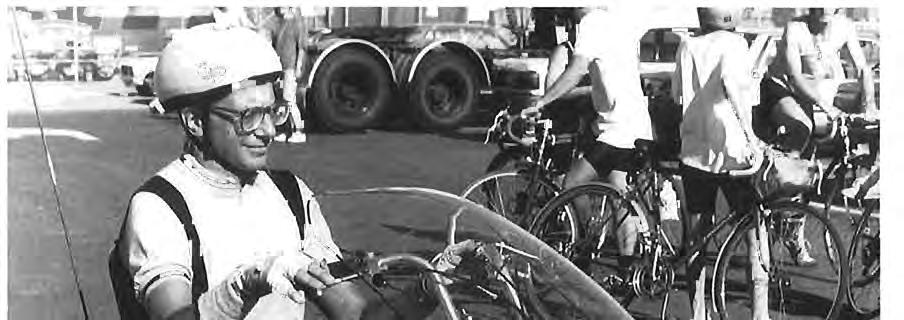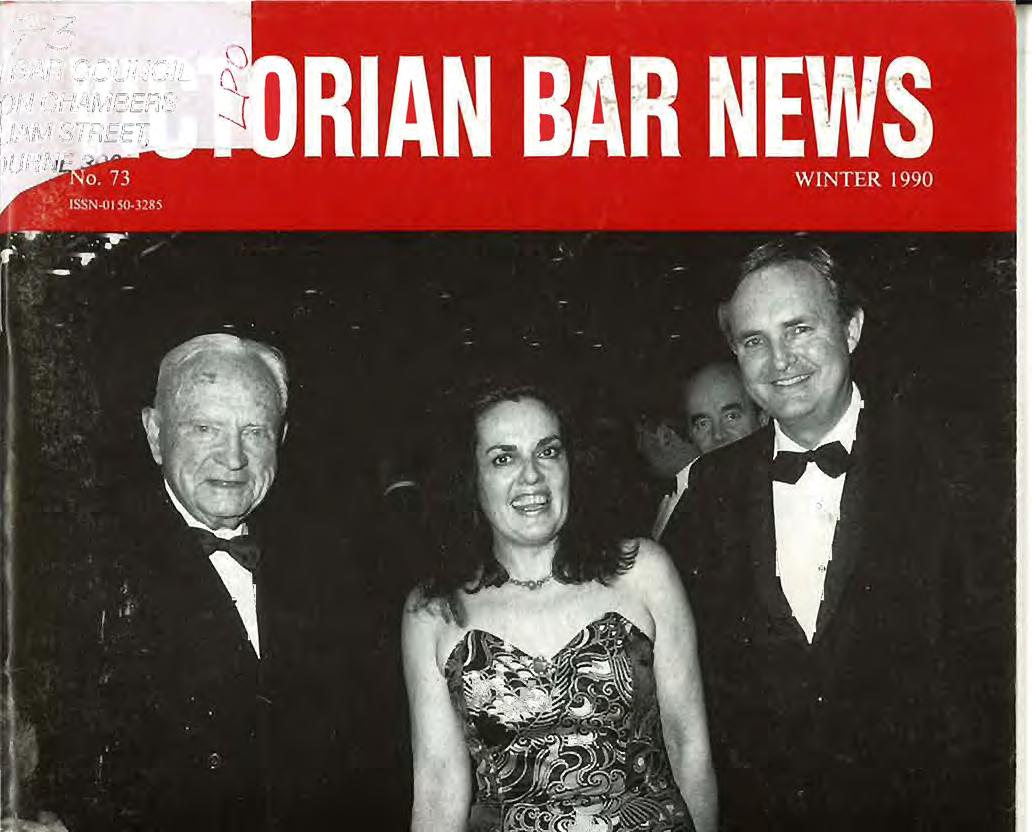
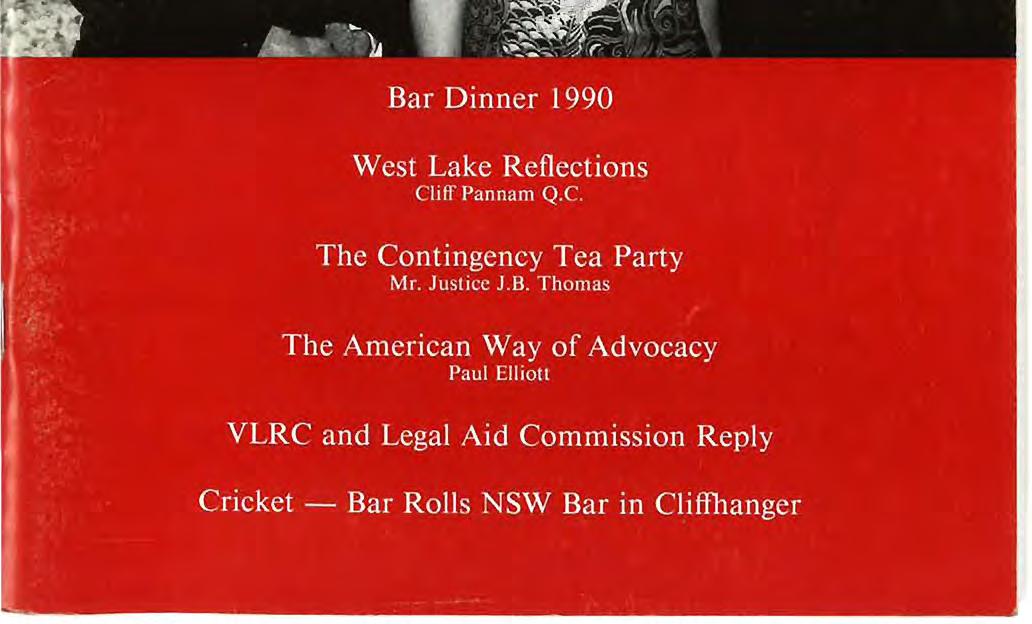



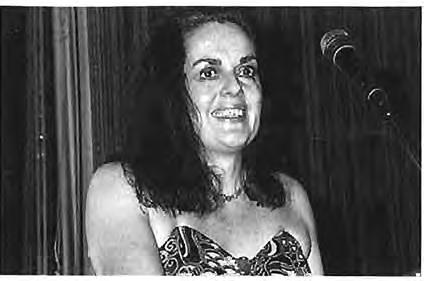
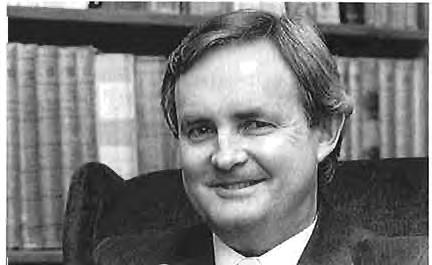
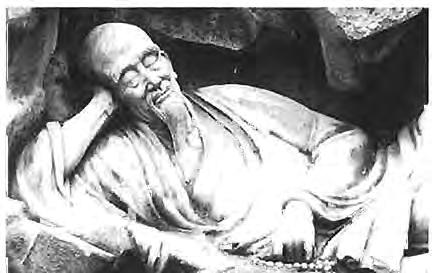

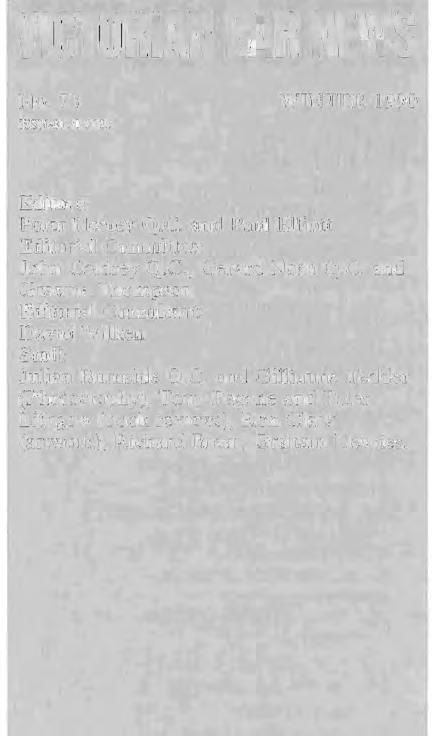
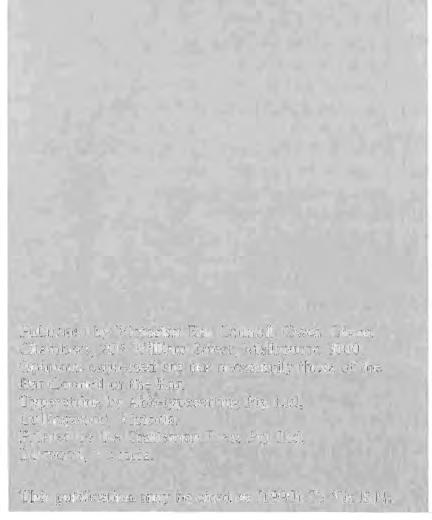

A third year law student of our acquaintance was recently being interviewed at one of the megafirms for a position as a summer clerk The atmosphere was very Wall Street, the questioning rigorous and achievement-oriented. What can you do for the firm? What are your strengths? What are your weaknesses?
Probably the last question was designed to elicit a response like ''I'm just a bit too ruthless" or "I hate taking Sundays off".
However, all our friend could think of on the spur of the moment was "Mum thinks my room is very messy."
It is probably well known that our recentlyretired Chairman, Bill "Kodachrome" Gillard Q.C, is the son of a former Chairman, the late Sir Oliver Gillard. Sir Oliver's leadership was largely responsible for the construction of Owen Dixon Chambers in 1961, a truly giant step at the time.
Perhaps less well known is the fact that our present Chairman, David Harper Q.C., is the son-in-law of another former Chairman, Sir George Lush Q .c., also formerly a member of the Supreme Court.
Just when you thought it was safe to go back to Queensland! In Street v. Queensland Bar Association (1989) 63 ALJR 715 the High Court held that Queensland Rules of Court which in effect restricted admission to the Queensland Bar to persons who were residents of that State were in breach of s. 117 of the Constitution and hence invalid.
However a new rule (introduced after the application for special leave had been made in Street but before the hearing of the appeal; see (1988) 79 ALR 579» provides for conditional administration of interstate barristers. Admission will be made absolute after 12 months provided the applicant in the meantime" has practised principally in Queensland and has not pursued any occupation or business other than that prop e r for a barrist e r. "
The first limb of the condition will ordinarily be inapplicable to residents of other States because of Street , but the second limb "has been
applied by the Full Court of the Supreme Court with some rigour", to quote David Jackson Q.c. writing in NSW Bar News, Autumn 1990, p.9.
We understand from press reports that this is a stand taken by the Queensland Supreme Court itself and not as a result of submissions on behalf of the Queensland Bar Association.
Thus far leading interstate silks to fall (or stumble) at this new hurdle include D.M.J. Bennett Q.c. (who appeared for the successful appellant in Street), G.K. Downes Q.c. and the Commonwealth Solicitor-General, Gavan Griffith Q.c. David Jackson comments:
"The case of the Commonwealth SolicitorGeneral highlights the absurdity of the requirement ofconditional admission. The result of its operation is to pervert the probabilities, because residents of Queensland with no 'track record' as barristers are admitted unconditionally, but non-residents must be admitted conditionally even if they have practised exclusively as barristers for decades, and have given no hint of straying from that path. "
This very absurdity, as David Jackson points out, also indicates a strong probability that the relevant rule would also be held to discriminate against residents of another State and therefore also be in contravention of s. 117. Certainly it seems the rule (and its inflexible application by the Queensland Supreme Court, notwithstanding other provisions in the same rules which give power of dispensation or abridgement of time) seems contrary to the spirit of the High Court's decision in Street and the common sense which underlies it.
The following :1ews comes from the Sydney Morning Herald, in turn from NSW Police News, in turn from the United Press wire service.
Police in Radnor, Pennsylvania, devised an ingenious do-it-yourself lie detector. They put a metal colander on a suspect's head and attached the colander by wires to a photocopier. In the photocopier was a typewritten message: "He's lying"
Each time the interrogators received answers they did not fancy, they pushed the button on the photocopier. Out came the "He's lying" message. The suspect was convinced that the machine was accurate and confessed.
Such ingenuity brings back to mind the old law school favourite R. v. Williams [1923] 1 KB 340 where, as part of his scheme to obtain the consent of the prosecutrix, the accused used "an instrument which was in the nature of an aneroid barometer and according to the evidence was not in working order and would not in any event
have been affected by the breathing of the girl"
In a recent paper at a seminar sponsored by the Victorian Planning and Environmental Law Association, Stuart Morris made the following comments about the role of lawyers on the Planning Division of the AAT.
His points were well made and ha ve a relevance extending beyond the immediate context in which he was speaking:
"The main area in which the tribuna/ has dif ficulty in attracting the highest calibre of members is in the area of/egalpractitioners Yet this type of member is the most critical to the tribunal's operations. Lawyers will always playa central role in the operation of the tribunal; it is a mistake to think otherwise. Occasionally romantics advance the view that the tribunal does not need lawyers. I believe this view is ill informed, and usually based upon prejudice. The reality is that the tribunal determines matters affecting important civic rights and having very large financial consequences. Moreover many of the decisions the tribunal makes involve interpreting laws and assessing evidence. Consequently the tribunal must be led by lawyers. It goes without saying that these lawyers must be intelligent. learned and wise; but what must also be appreciated is that legal members must also have a broad understanding of how society works. The best opponent of legalism is a legal member with a wide social perspective and a practical mind. Because lawyers provide much of the intellectualleadership for the tribunal and because it is hard to attract top lawyers without providing security akin to that provided to judges. urgent consideration needs to be given to some change in the system so that legal members of the tribunal receive similar pay and conditions to judges. "
The latest issue of the Tasmanian Law Newsletter contains tributes to the late Sir Reginald Wright, Senator, Minister in the Gorton and McMahon Governments and distinguished Tasmanian advocate since the 1930s. He was the brother of Professor R.D. Wright who became Chancellor of the University of Melbourne. He was not a man to be trifled with. On one of his appearances before the High Court the transcript recorded this response: "No. no, no, no . ... I have been completely misunderstood. I'll start again. If I could just have two minutes uninterrupted - I'd be better understood. " The Editors
THE COLUMN HEADED "CHAIRMAN'S Message" has appeared in the Victorian Bar News with sufficient regularity over a sufficiently long period to have acquired institutional status. So when, during the course of a chat about clerking, and accommodation , and the importance of the Bar News, and other issues of like sensitivity (a chat which , as a matter of fairness , I trust the Editors have with each new Chairman), Heerey Q.c. and Elliott suggested that I too should be institutionalised , I had to agree. I did , however, voice a mild objection to being both the medium and the message.
"The Chairman's Message" seemed to me to smack of tablets of stone, or Ron Barassi at threequarter time , or Michael Adams presiding over a meeting of the Essoign Club. I told the Editors as much. They looked at me with a kind of fuzzy amusement. I attempted to give my reasons for not wanting to preach under a pretentious heading. As an aid to their understanding of my point of view, I opened the Chairman's cupboard and offered them a drink At last their eyes and minds had something upon which to focus. And I had a heading under which to write.
The first comment from the cupboard would have been required by ritual had it not been made essential by considerations of elementary justice. And this is so even given that it involves stating the obvious: that the Bar is greatly indebted to Bill Gillard. What could not be obvious to all , however , is that the immediate past Chairman donated an incredible amount of time and energy to the job.
It would be difficult to equal, and impossible to surpass (at least, I have found it so) his commitment to the office and to the Bar. He served with great distinction. His achievements were many. I thank him on behalf of us all.
There is much else with which this column could, and probably should, deal. Solemn subjects, like law reform. Subjects with no humour in them at all , like the cost of justice . It is difficult to write about these matters when ch eerfulness keeps breaking through . On the other hand , it is important that the Bar retain its sense of proportion . Otherwise, we might fail to perceive that (for example) a policy which allows readers to enter the Bar on an initial capital outlay of $750 is a barrier to practice; or that those who (voluntarily) accept silk on the basis that they will restrict themselves to cases appropriate for two counsel needlessly add to the cost of justice when they insist that they will only accept a brief
where two counsel are required.
In making these points, I highlight some of the sillier suggestions to be found in the issues paper entitled "Access to the Law: The Cost of litigation" published by the Law Reform Commission of Victoria On the other hand, the law can never claim that it is perfect, or that the private profession ought to have a monopoly on its reform. Still less could it be said that issues oflaw reform are not the proper subject for vigorous debate The Bar Council will work constructively with the Law Reform Commission, in its reference to the cost of justice as elsewhere. The Council welcomes contributions from any member of the Bar on this, and on the matters before the Senate Standing Committee on Legal and Constitutional Affairs.
Two hundred and five members of the Bar have notified an interest in appointment under the Victorian Bar Dispute Resolution Scheme . A brochure advertising the scheme is about to be released to all Victoria ' s solicitors and other persons from whom references to the scheme are to be expected.
The success of the scheme will depend, in part, upon the quality of those appointed to preside over the dispute resolution process. Accordingly , in making appointments weight will be given to those who have acquired relevant specialist skills. Candidates for appointment would therefore be wise to join the Institute of Arbitrators or LEADR (Lawyers Engaged in Alternative Dispute Resolution) or both. Information about joining may be obtained from the Executive Officer.
The committee which devised the scheme (Heerey Q.c., Anderson Q.c., and Phipps) is to be congratulated. This is a venture which should assist in the delivery of justice, relieve the courts of some of the pressure on them, and provide work for members of the Bar. I have high hopes for it.
Accommodation is, as always, a source of anxious concern B.c.L. is presently considering a variety of solutions to current and long-term problems . One longer-term option is the development of 544 Lt. Bourke Street. The response by financiers and developers to the B.c.L. "requirements" brief has not been overwhelming, but a number of proposals are under consideration. I urge members of the Bar to put to the Board any suggestions they might have in this regard.
David Harper
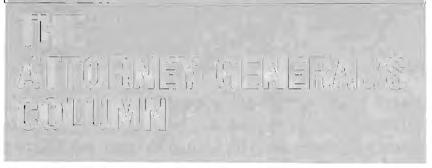
writing these columns in Victorian Bar New s. Over the coming issues I hope to keep you informed of legislative changes as well as the general direction of the Department.
Much effort has been expended, initially by Victoria and New South Wales , in finalising a national scheme for companies and securities regulation. All of the Attorneys-G eneral from all of the States and the Commonwealth have now agreed that an inter-government agreement be drafted . The only outstanding matters (at Bar News deadline time) are administrative and financial arrangements for the States. I expect nevertheless that as you read this a national scheme will be in place requiring only final legislative detail.
The creation of a national scheme is vital to the restoration of international investor confidence in the Australian market place. It not only affects large corporations but the basic economic fibre of the country.
Work can now begin on the content of company law which must be appropriate to market and business conditions in the 1990s and beyond. For example, the prospectus provisions of the proposed legislation need to be reviewed. There is a strong case for retaining pre-vetting of prospectuses and insider trading laws should be a real deterrent in terms of penalty and the clarity of the law.
Still on the subject of legislation , I launched last month for the Law Reform Commission a report, Access to the Law - The Structure and Format of Legislation. The report suggests that any new legislation be written and presented in a style that is easily understood
The Commission recommends that statutes contain finding aids such as indexes, highlighting of defined terms, cross-references and footnotes, box explanations and examples, and amending Acts which show the full text of th e amended provision, highlighting the changes.
These are very practical means of making
legislation clearer and easier to use both for the profession and the public .
The Victorian Law Reform Commission has issued a discussion paper on its Access to the Law reference which includes the suggestions that lawyers charge on a contingency basis and solicitors be allowed to advertise fixed fees.
Other issues are: the way in which lawyers set their fees , the rules that govern legal representation in courts and who bears the costs of court proceedings , court procedures and rules affecting litigation costs, and legal insurance
These suggested changes are aimed at making the legal profession more competitive , enabling people to know what they are likely to have to pay for the service they require.
Many of these suggested changes would make the law more accessible to the average Victorian. In order that the Government can make informed decisions on these issues, I encourage you to give your comments to the Law Reform Commission.
Another area of law to be reformed resulting from a Law Reform Commission series of reports is the laws relating to sexual assault.
I expect to be introducing legislation in the next session of Parliament to provide as much protection as possible to the victims of sexual offences.
The changes are likely to includ e allowing audio or video recordings of a child ' s statement being allowed at trial in cases dealing with sexual offences against children and the possibility of children being able to give their evidence by closed circuit television.
The Government has been concerned for some time about the rules defining rape and indecent assault, and also the procedures and rules of evidence in sexual assault which impose intolerably heavy burdens on victims. Sometimes the burden is so great that victims elect not to report the assault to police. Clearly changes have to be made. The proposed legislation will be based on the Victo r ian Law Reform Commission's reports.
In th e Spring Session of Parliament, the Government will be legislating to decriminalise public drunkenness. This follows a report from the Law Reform Commission which recommended that the sections of the law about public drunkenness be repealed.
The legislation will follow the draft Bill at-
6
tached to the Law Reform Commission's report on public drunkenness.
The report provides that it will no longer be an offence to be drunk in a public place. However, where a person is drunk in a public place and constitutes a significant danger to himself or herself or others, police will have the power to apprehend that person. The Bill provides the police with options for dealing with the risk including removing the person from the scene or detaining the person in a sobering-up unit. They will still be subject to normal criminal law for any other offences they may have committed.
The discussion paper commissioned by the Government to address ways of dealing with delays in the Planning Division of the Administrative Appeals Tribunal was released in June.
The discussion paper confirmed the concern of the Government that delays at the tribunal were a significant problem. Although a number of key administrative measures taken have already improved service delivery, further action will be required.
The discussion paper is available now for public comment. Decisions on legislative changes will be made after public comment has been received.
The trend towards longer criminal trials has given rise to concerns among the judiciary and the profession that a trial might be aborted because the number of jurors may fall below 10. This could waste thousands of dollars, depending on how advanced the trial had become.
Various options are being considered to deal with this problem. The most practical option seems to be to give the trial judge discretion to swear in an additional three jurors where he knows the trial will be lengthy. At the end of the trial there would be a ballot to see which 12 of the jurors would determine the case.
Officers of my department are consulting with the profession and the judiciary in order to prepare legislation to be introduced in the next session of Parliament.
The Magistrates' Court Act to be proclaimed in the next few months will increase the criminal and civil jurisdictions of the Magistrates' Court. In the civil jurisdiction, claims for up to $25,000 may be brought, an increase of $5,000 . In the criminal jurisdiction, the number of indictable offences which may be dealt with summarily will be almost doubled, and where money is involved, the limit will be increased to $25,000 also. It will mean that more cases will be capable
of being disposed of quickly and with less cost to the community in the Magistrates' Court.
In the civil jurisdiction, claims up to $5,000 must be referred to arbitration except in special circumstances. This is an increase from $3,000.
The Act gives the court control of its processes from case initiation to final disposition, creates a new single Magistrates' Court for better business management, and the Council of Magistrates has made new simplified Civil Rules of Procedure.
Bail Justices will take over the court role of Justices of the Peace. Potential Bail Justices have been trained and accredited and will be appointed to take over dealing with bail and remand matters outside court hours.
New simplified standardised forms in "plain English" have been designed so that people will be better able to understand their rights and obligations . A new "mention system" for dealing with committals for trials is established. It will set time limits for action by prosecuting agencies and the defence and give the court control over the listing and hearing of committal proceedings for indictable offences. With the increased criminal jurisdiction, the system will have a significant effect in reducing delays in criminal trials in the higher courts.
The Legal and Constitutional Committee's report on privacy highlights some areas where there is a need in Victoria for greater protection of personal privacy.
Among its recommendations is that the Attorney-General should consider introducing comprehensive information privacy/data protection legislation. I have called for comments from interest groups . Copies of the Report are available from the Legal and Constitutional Committee at Nauru House.
The Victorian Law Reform Commission proposed amendments to the Mental Health Act to deal with dan ge rolls people. The Social Development ommittee rejected rhjs and proposed voluntary agreem e nt to a treatment programme in a tberap eutic community . In some cases, however , thi s may not be practicable because there no incentive to enter into such an agreement.

As a res ull the Governm e m may bave to consider eventative detention legislation in the form of a Dangerou Per on s Act but all the options are pr es ently being considered.
I look forward to continuing the programme of change with your continuing support.
Jim Kennan Attorney-General 7

There has been publicity about the proposal to increase the number of jurors in long trials. The Criminal Justice Committee expressed its urgent support for a proposal whereby the trial judge in long cases of the order of 3 months or more, would have the discretion to empanel 15 jurors. It is proposed that that number would be reduced to 12 by ballot when the time came for the jury to retire to consider its verdict. The Criminal Bar Association agrees and has expressed its agreement to the Bar Council and to the Attorney-General.
There is a move afoot to make some changes to appropriate legislation to allow a defence opening in criminal trials. Such an opening would be expected to follow the prosecutor's opening. The Association is in favour of the concept in principle although not yet agreed on the mechanics. There seem to be two alternatives under discussion. The first is an option to counsel for the accused to make an opening statement. The purpose of the statement would not be advance argument but rather to put effectively the defence aspect of the case to the jury. This will not be regarded as desirable in all cases but in some it may be advantageous to do so. The alternative appears to be a written document to be filed by the accused and to be read to the jury. This document would contain in effect a "statement of issues" in the case. The matter is being considered by the Criminal Justice Committee and the Criminal Bar Association is still formulating its position. Members' views are welcome.
It is interesting to note that the New South Wales Bar Association has established three new rules affecting the conduct of counsel briefed to prosecute The new rules prohibit counsel asserting there is evidence supporting an aspect of the Crown case unless there really is. Having said there is supporting evidence for a particular point , if it turns out there is not in fact any such evidence, the prosecutor is required to advise the defence and the court of that fact. Finally, the new rules require a barrister appearing for the prosecution to disclose to the defence all material in his possession or of which he becomes
aware which is relevant to the guilt or innocence of the accused, subject to a qualification regarding the administration of justice and the prevention of danger to the life or safety of witnesses.
It all sounds like good sense and one wonders what the circumstances were which precipitated the new rules.
In addition, we have been concerned about some cases where an offer is made by an accused to plead to an offence on the presentment or to a lesser offence which is not on the presentment. Before such an offer is rejected (if it is thought it should be), counsel briefed for the prosecution should obtain instructions on the matter. It has been suggested that this may not have been happening and members are urged to take note that it should occur and unilateral rejection is not within the mandate of counsel's brief.
Also in th e NSW Bar News re cently was an article by J T. Kearney concerning challenges to DNA evidence The article is worth reading and refers t o several cases including The People oj the State oj N ew York v. Cas t ro (unreportedSupreme Court of the State of New York - 14 August 1989) where DNA evidence was successfully challenged, apparently on the basis that the actual testing of the samples had failed to use generally accepted scientific techniques for obtaining reliable results.
Members will recall the recent publicity concerning the incarceration of Gary David. The Criminal Bar Association, like other people and organisations, has expressed its concern about legislation of this nature and opposes the means by which it was proposed to keep David in custody .
Despite the promises in the last Bar News, the proposed" members only" dinner was not held at the end of June. The dinner has been postponed rather than cancelled and the reason was that it was thought it was too close to the Bar Dinner. It is now expected to hold the dinner in the first or second week of August.
Lex Lasry

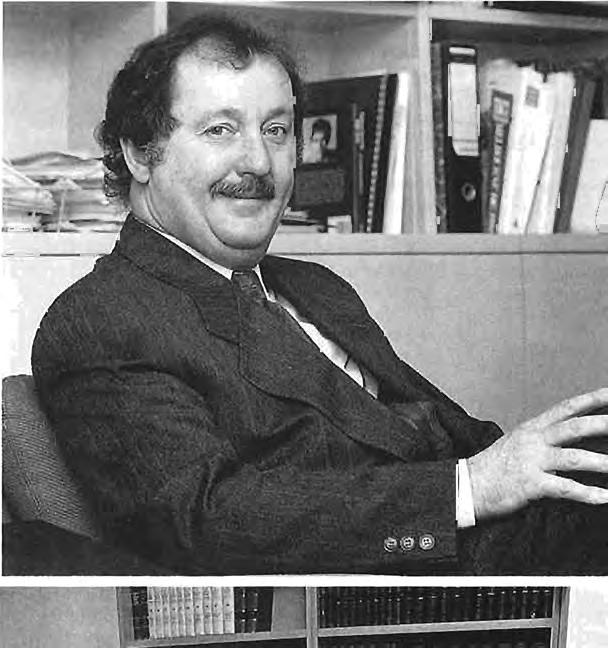
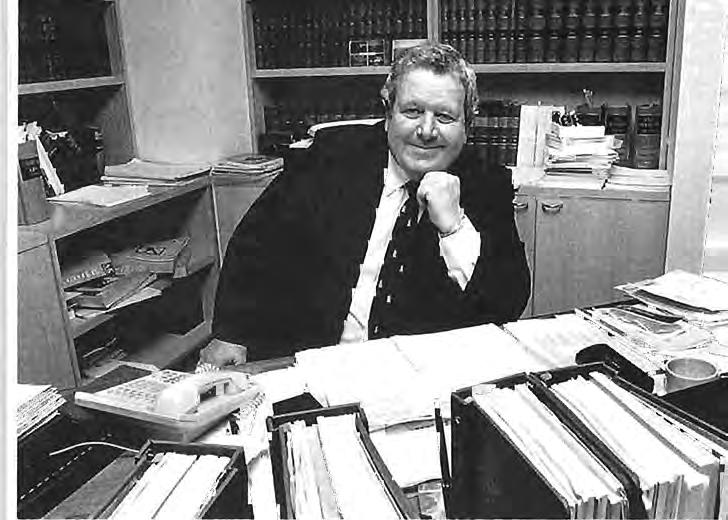
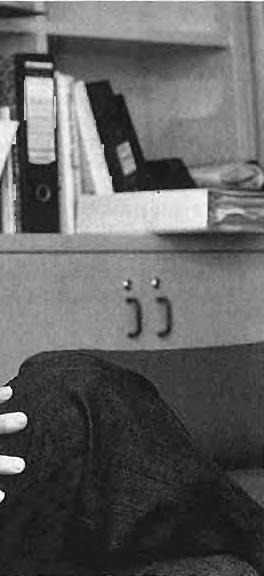


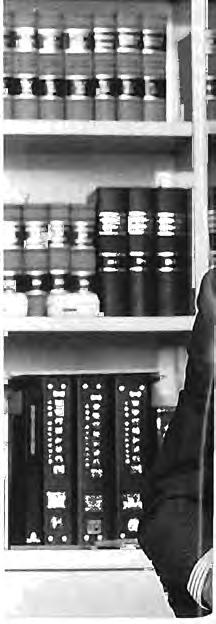

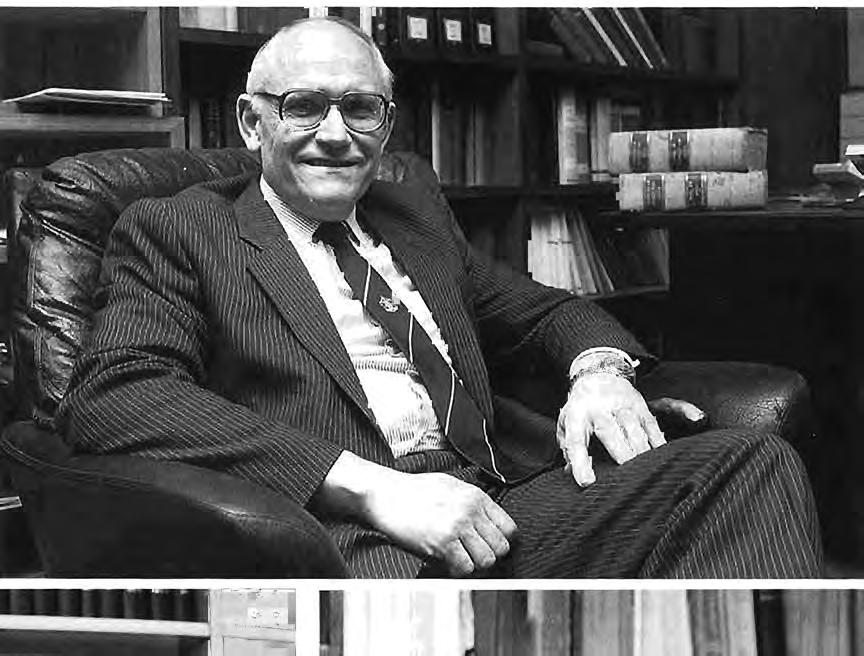
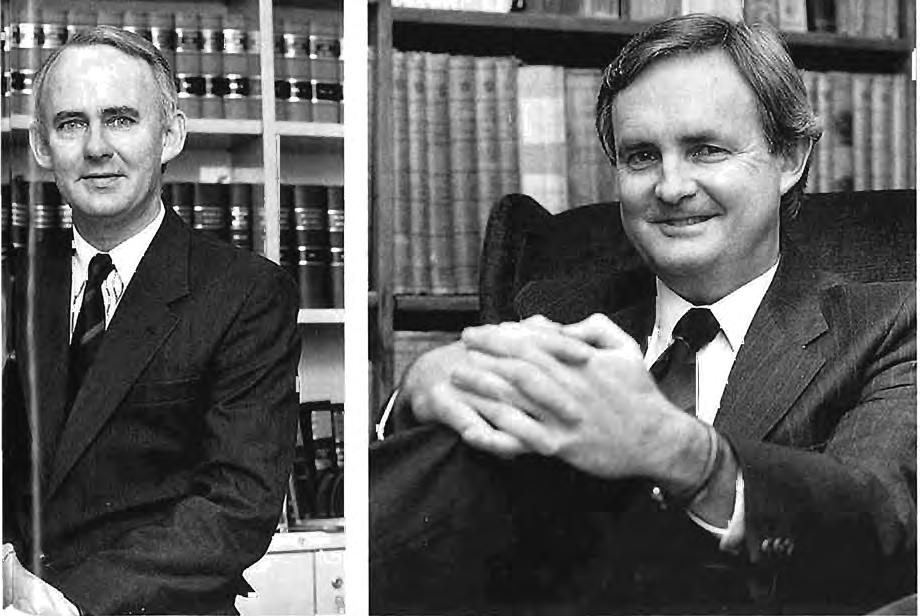
of the appointment of the Honourable Mr. Justice Smith to the Bench of the Supreme Court of Victoria in May 1990 to simply make reference to previous utterances and leave it at that. After all, there is plenty of source material for such an article.
His Honour was appointed to the Bench of the County Court in July 1988 and the Winter 1988 edition of Bar News contains ample coverage of most relevant matters. The speech of the Junior Silk at the 1989 Bar Dinner is reproduced in the Winter 1989 Bar News and covers further material. Add to those the two welcoming speeches and the 1990 Bar Dinner Junior Silk speech and you have a most impressive array of writings on this modest and unassuming judge.
When his Honour was appointed to the County Court Bench phrases like "adornment to the Bench" were commonly heard. The same thing has happened this time. It seems to fit perfectly into the scheme of things that his Honour, educated at Scotch College, the University of Melbourne and Ormond College, the son of one of the finest Victorian Supreme Court judges, articled to Mr. Lowry of Home Wilkinson & Lowry and reading with Sir Ninian Stephen should take a place on the Supreme Court bench. His practice at the Bar from the time of his admission in 1964, four full-time years as commissioner in charge of the evidence reference at the Australian Law Reform Commission from 1980 and taking silk in 1985 involved him in a very wide variety of interesting work which frequently required original and creative solutions. His quiet and laid-back approach was often beguiling to opponents.
Previous writings have referred to the nickname of "Tattslotto Tim" which his Honour earned as a result of an injuries verdict he delivered at a County Court circuit at Bendigo. The Full Court subsequently upheld that decision. His Honour was also upheld on appeals against sentence in a long criminal trial, despite the fact that their Honours expressed some misgivings about their possible excessiveness. His Honour has a penchant for big numbers.
His Honour has had an experience which is very rare to lawyers. While doing his articles and under the guise of a student he was called for jury service. He was selected for ajury trial in which a barmaid claimed damages for allegedly slipping in what was perhaps euphemistically known as "The Night Cupboard". Gowans J. presided, Frost Q.c. and Ravech appeared for the plaintiff
and John Mornane for the defendant. His Honour claims to this day that because he knew nothing about the process he played virtually no part in the jury's deliberations. It later became clear that Mornane had recognised Smith on the jury and had directed his final address to him. Of course justice was done, more so because Mornane subsequently expressed himself as having been well satisfied with the damages award, despite the fact that he was devastated by not having had his usual win on liability. So much for "Tattslotto Tim"!
Warmth, compassion and a moderate temperament are all qualities which his Honour has in abundance. The Bar wishes him well and asks that before he takes another appointment requiring a further article of this sort he ensures that he is able to provide some original material.
"For now I'm a Judge! Yes, now I'm a Judge! Though all my law be judge, Yet I'll never, never budge! But I'll live and die a Judge! And a good Judge too!"
JOHN DA VID PHILLIPS HAS MADE ITemploying his talents as a singer he now can be heard singing at his Hawthorn home and in the corridors ofthe Supreme Court the above extract from Gilbert and Sullivan's "Trial by Jury".
One may be forgiven for thinking that his Honour was always destined to become a Supreme Court judge and did not have to follow the route adopted by the judge in "Trial by Jury". Matriculating from Scotch College in 1953 his Honour was equal Dux of the school. His Honour had a brilliant academic career through the University of Melbourne, graduating with Honours and being awarded the Supreme Court Prize.
After completing his Articles with W.J. Clarke & Co. his Honour was appointed as Associate to Sir Douglas Menzies, Justice of the High Court of Australia. After signing the Bar Roll in March 1961 and reading with Richard Newton, he soon developed a highly successful practice in the area of company and commercial law.
It would have been understandable had he de-
veloped an acute concern about his identity at the Bar. In the early years he had to explain that he was not related to P.D. Phillips , Q.c., later he often had to remind enquirers for his services at "a committal" that there were two Phillips at the Bar, "J.H " and "J.D." and that he was "Equity Jack" not "Criminal Jack". For a time that problem was solved by him becoming known as "John D", but then the real John Dee (now his Honour Judge Dee) came to the Bar. Sometimes he even had to explain that although he was J. Phillips, he had not taught Insurance or Industrial Law at the University of Melbourne. Having lived through this confusion for so many years, there is little reason to think that the presence of two (unrelated) John Phillips on the Supreme Court Bench will trouble him at all.
His Honour was always a contributor to life at the Bar and many a junior was helped by his experience and extensive knowledge of the law. His Honour acted as Bar Librarian, served on the Supreme Court Rules Committee for the last 2112 years, and was a Director of Barristers Chambers Ltd. for two years. However, many will remember him for his greatest contribution , that of being in charge of car parking allocation No-one dared park over their allotted lines, unauthorised parkers lived in fear of being found outbut the efficiency of the system was never better!
For those who have had the opportunity of working with his Honour there developed a great appreciation of his dedication and thoroughness to any case in which he was retained. His Honour had a driving capacity for hard work. Many a junior looked up to him with the greatest of respect, and in his last major case his juniors actually called him 'God'.
JOHN ANTHONY DEE WAS BORN TO A modest but proud family on a date about which he is somewhat shy. It is however estimated that he is approximately 53 years of age. With the assistance of his family and his own persistence, he attended successfully at University High School and upon having matriculated was admitted to the Medical Faculty of the University of Melbourne. At the end of his first year both he and the faculty rejected each other and he took up work as a Clerk of Courts, principally at the Fitzroy Magistrates' Court, which work he supplemented by driving taxis. In the latter career he became well known to other drivers around the city of Melbourne as a queue-jumper. His Honour was admitted to the Faculty of
Law at the University of Melbourne and in the minimum time graduated to our profession. He thereafter obtained Articles with the firm of Middleton McEachern Shaw & Birch, where he worked under the tutelage ofMr. Frank Stewart, concentrating mainly in the field of workers' compensation. In 1965 his Honour signed the Bar Roll and was accepted as a reader in the Chambers of Mr. B.W. Beach (as he then was) together with David Ashley. It would be wrong to suggest that his Honour was the average type of reader and during his lengthy stay in his Master's chambers he created situations which it seems are still seen with fond memory - such as from time to time eating his Master's lunch while that gentleman was busy in court attending to the needs of plaintiffs.
His Honour's concentration at the Bar was with the criminal law, and in the course of a distinguished career he defended many people charged with the most serious criminal offences, and conducted those defences with skill and decorum. Many a barrister made the mistake of thinking that his Honour's genial and gentle behaviour in court was a sign of weakness. All who made such a mistake left court very much the wiser. One can be confident that his Honour has taken to the Bench the same skills and geniality and it is a fair warning to practitioners not to make the mistake which has been made by so many barristers in the past.
His Honour was appointed as Prosecutor for the Queen for the State of Victoria and held that position for approximately 7 112 years before shortly returning to private practice, and thereafter accepting an appointment as Deputy Director of Public Prosecutions for the Commonwealth. In his role as Prosecutor , his Honour was involved in many serious and important cases , not the least of which were the Russell Street Bombing and the inquest into the death of Assistant Commissioner Winchester in Canberra. As a Prosecutor in either jurisdiction, his Honour carried out his functions with exemplary fairness but keenly adhered to the concept of the adversary system.
His Honour therefore takes to the County Court Bench a great deal of experience in criminallaw, and no doubt a burning interest to hone his skills within the civil jurisdiction.
The many and varied anecdotes spoken of during the Bar Dinner and at his Honour's welcome are sufficient indication to those of the profession who perhaps did not know his Honour as well as some, that his Honour is a man of great character, great humour, and great compassion for those who find life less easy than others. His Honour will no doubt combine all of those qualities in the exercise of his judicial function.
GORDON DAVID LEWIS WAS BORN in Geelong on 15th April 1934 He attended Geelong High School and graduated in law from the University of Melbourne in 1956. He is now the most recent appointee to the County Court Bench.
In the intervening years he has been an articled clerk with Hall & Wilcox; an employee solicitor with Mills & Oakley in East Melbourne; a partner in the Hamilton firm of Melville Orton & Lewis; Executive Director of the Law Institute of Victoria; Commissioner for Corporate Affairs for the State of Victoria; the Victorian Government Solicitor; and film reviewer for the ABC
That summary says little of the man behind the career , who has what one of his contemporaries described as a "puckish sense of humour" and an absence of self-importance.
Gordon Lewis has made a permanent contribution to sporting history in Victoria. In the 1950s he created (the ultimate hypothetical) the Linden Valley Football League Each week he telephoned the results to the Herald; and each week they were religiously published. The performance of some of the "stars" of the league as revealed in these telephono<j rel rts was such that AlfBrown was led to comment on the failure of the V.F.L. scouts to recruit any of the exceptional footballers in the Linden Valley League
It is said (by Gordon) that the Hawthorn Club responded by saying that they had considered the star centre-half forward of Grogan East, one Clarrie Midnite, but had decided that he was too light for league football.
Members of the Bar will watch with interest to see whether he and his new-found brother, Frank Walsh, resume in the corridors and courts of the County Court the swash-buckling, Errol Flynntype roles they adopted in Chancery Lane in the late 1950s. In those days the thwack of walking sticks, in lieu of the clash of steel , would resound in Selborne Chambers or wherever the two met.
On one occasion a figure with walking stick appeared silhouetted at the Bourke Street entrance of Selborne Chambers. Gordon was standing talking in the middle of the central hall. He saw the figure with walking stick come through the doors, believed it was Frank Walsh and charged forward with walking stick upraised. When he was almost upon his victim and the walking stick was about to descend, the last steps of the charge faltered and the walking stick subsided past the head of a somewhat startled Campbell Q.c.
Gordon is a good no-nonsense common-sense lawyer. He is likely to be a human and com-
passionate judge. The Bar wishes him well on his appointment and looks forward to seeing his sense of humour exhibited in a new environment.
IT HAS NOW BECOME THE CUSTOM FOR newly appointed judges to be featured photographically in the Bar News smirking selfindulgently down upon the rest of us as they try to look "I'm one of you, really" jovial yet "I was born for this" sagacious .
The great act of charity perpetrated by the authors in this issue is to publish a photograph of his Honour so that his father, Sir John Grey Gorton, can contemplate what he himself will look like in fifteen years time .
It has been noted by his contemporaries that Michael John Grey Gorton, who was welcomed to the Bench on 14th May 1990, was certainly born to look like a judge, that is , if one assumes that longevity begets wisdom. Were that so his Honour would make Solomon look decidedly backward . His Honour's uniquely cadaverous and undernourished appearance, nurtured by the ravenous inhalation of nicotine, has provided a fertile source of nicknames : "Bones" , "Granpa", "Plucked Chook" and "Emmet Spring's Grandfather" are a mere sample.
It has been said that his Honour was educated at Mystic Park State School, Kerang High School , Geelong Grammar School and the University of Melbourne
He commenced the study of Law at the last establishment in 1958, he served Articles of Clerkship at the firm of Home Wilkinson & Lowry and subsequently signed the Bar Roll on 1st November 1965 and read with Jack Mornane.
The above is largely irrelevant however, in an encapsulation of his Honour's inexorable march to the Bench , for the most significant indication of this destiny was the recent acquisition of a pair of half-frame spectacles over which to look. As his Honour would say: "It is observation s such as this, up with which I will not put. " His Honour would then characteristically announce that this was where the line should be drawn.
His Honour does however bring to the Bench his unique experience as Canterbury ' S only fulltime amateur free-range chook farmer - this will stand him in very good stead to appreciate his new role at the Accident Compensation Tribunal.
The Bar applauds and welcomes the appoint-
ment of Judge Gorton to the Bench in the knowledge that the community has acquired a most experienced, capable, conscientious and humane judicial officer. We wish him satisfaction and fulfilment in his new role.
ON 16th MAY 1990 HIS HONOUR JUDGE
Arnold was welcomed to the Bench of the Accident Compensation Tribunal.
His Honour was born in February 1944. By the time he was 16 he had matriculated from St. Bernard's College. In the following year he commenced a law course at the University of Melbourne. He successfully completed the course by the time he was 21 years of age. This is a rare distinction made even more significant by the fact that he obtained Honours in Contract, Torts, Constitutional Law, Criminal Law and Mercantile Law .
In 1965 after graduation his Honour commenced Articles with the firm of Garden & Green in Swan Hill. He remained there for two years after admission. In 1967 his Honour returned to Melbourne. Hejoined the firm of Morgardo & Co., which had the Australian Workers'
Union as one of its clients. His Honour became a member of the union and thereafter acted for it for many years. Most of his practice was in the workers' compensation and industrial accident field. His Honour quickly gained a reputation as a conscientious , hard-working and skilful practitioner. In 1982 his Honour entered Parliament as member for Templestowe. While in Parliament he served on a number of Parliamentary committees and groups. He chaired the Commercial Fisheries Licensing Review in 1986 and the Fishing Industry Group in 1987. He was a member of the Public Bodies Parliamentary Committee between 1982 and 1985 and of the Legal and Constitutional Committee between 1985 and 1987. He served on the Legislative Council Prisons Inquiry in 1984. While a member of the Council his Honour took a keen interest in the reform of workers' compensation law.
His Honour has maintained an active involvement in academia. He was a member of the Council of the University of Melbourne between 1985 and 1987. He completed a LL.M this year.
His Honour brings to the Bench a wide and rich experience as a practitioner and parliamentarian. The Bar wishes him well for a long and satisfying judicial career.











Sotheby's Educational Studies offer the following day and evening courses: Renaissance, English Country Houses, Post-Renaissance, Great International Modern Art, Galleries & Collections .
Our two courses on the history of the Decorative Arts, (covering decoration, furniture, silver, ceramics and glass), begin on 24 July and 11 September.
The cost is $600 for 54 hours of tuition.
Enquiries: Marie-Therese Tehan, Sotheby's, 926 High Street, Armadale, 3144, Victoria. Telephone (03) 509 2900.
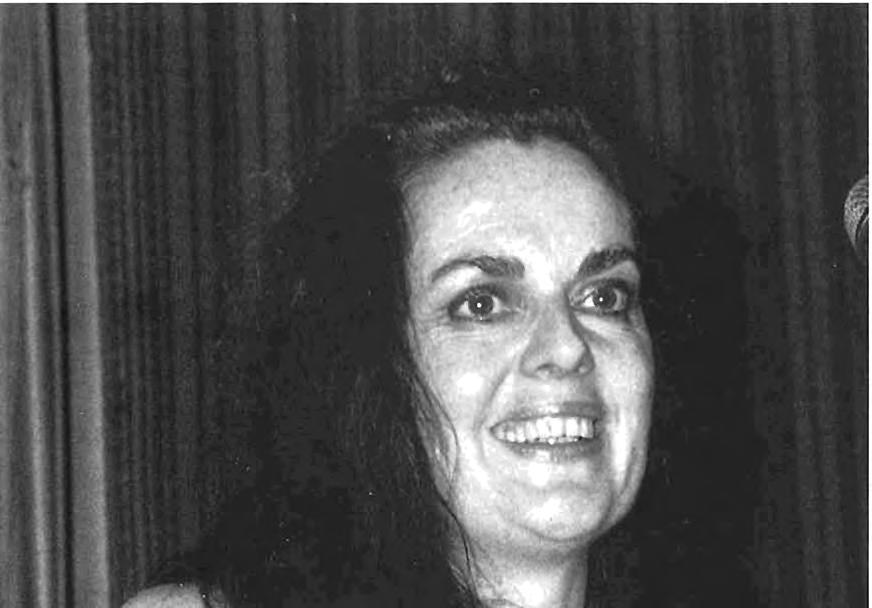
Susan Crennan Q. C.
MEMBERS OF THE BAR AND distinguished guests. Harper has asked me to propose the toast to our honoured guests tonight of whom we have twelve.
In some cases, on their appointment, congratulations from tht Bar were accompanied in certain quarters by a measure of relief.
JUDGE SMITH
A good example was the appointment of Judge Smith as President of the Administrative Appeals Tribunal in December last year; the Bar universally acclaimed this appointment and felt enormous relief whilst the Law Institute was dismayed and filled with foreboding for reasons which I can only now reveal. His Honour and his very good friend on the Supreme Court Mr. Justice Teague had proved an indomitable tennis 16
combination at the tennis match held every year between the Law Institute and the Bar on the last Monday before Christmas. Almost every year, Smith and Teague representing the Solicitors of Victoria beat the Bar. When Mr. Justice Teague was appointed, the Bar innocently thought it had the consolation at last and at least that this unbeatable combination of Smith and Teague was broken . The Bar however had failed to take into account the guile engendered by their years of successful practice as solicitors. On discussing events with their coach, Mr. Justice Teague pointed out that as he was a life member of the Law Institute and as he had never been a member of the Bar, he could continue indefinitely to play the December match against the Bar. Thus the Smith and Teague duo continued to beat whomever the Bar put up against them. Then his
Honour Judge Smith was appointed. He was not a life member of the Law Institute, and the Bar, and more especially the Bar tennis players, thought that they had seen the last of the duo. However Smith and Teague went into another huddle with their coach and this time his Honour Judge Smith pointed out that although his appointment had been announced before the last Monday in December, since he was not taking up his appointment until February this year, he would play on behalf of the Law Institute just one last time. The inevitable happened. They won. At least I can warn all members of Counsel going into his Honour's Court. Always remember that his Honour will stop at nothing if presented with an opportunity to give the Bar a serve.
Equally the Bar was relieved and pleased when his Honour Mr. Justice Smith became ajudge of the Supreme Court because the Bar is always relieved when the son of a well-respected and wellloved member of the Bar follows in his father's footsteps. It declares" All's right with the world". We all know how Sir Oliver Gillard echoed the sentiments of the whole Bar at a remarkably crowded General Meeting of the Bar in his time as Chairman of the Bar Council. As he surveyed the irritable, milling barristers at 5 o'clock one afternoon, Berkeley distinctly heard him turn to his son Bill on his left and say "One day son, all this will be yours." And so it came to pass. But I digress.
Whilst his Honour Mr. Justice Smith will have no memory of the occasion he was in fact my Moot Master at the University of Melbourne rather a while ago. The Law Faculty thought it made perfectly good sense to gi ve students moot problems which concerned areas of law not yet studied and of which the student mooters remained profoundly ignorant. No better preparation for the life of a barrister can be imagined.
However, this practice in the Law School must have led to some excruciating hours for moot masters. Like all moot masters his Honour was a busy barrister, and would, it must be said, rather have been anywhere but where he was, doing anything but what he was expected to be doing. His Honour opened with a deft attempt to arrange an early escape by inquiring whether he had jurisdiction to entertain an application for a Writ of Certiorari. The consternation this caused resulted in his Honour kindly supplying himself with a positive answer to his own question. Almost immediately regretting this generous impulse he tried again. "Was the tribunal in questionfunctus officio?" Although the Faculty guide to mooting was silent on the point we had assumed his Honour would address us only in

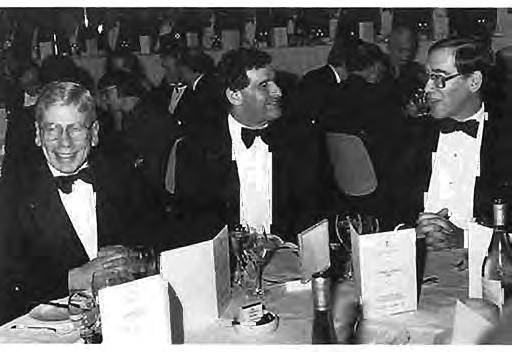
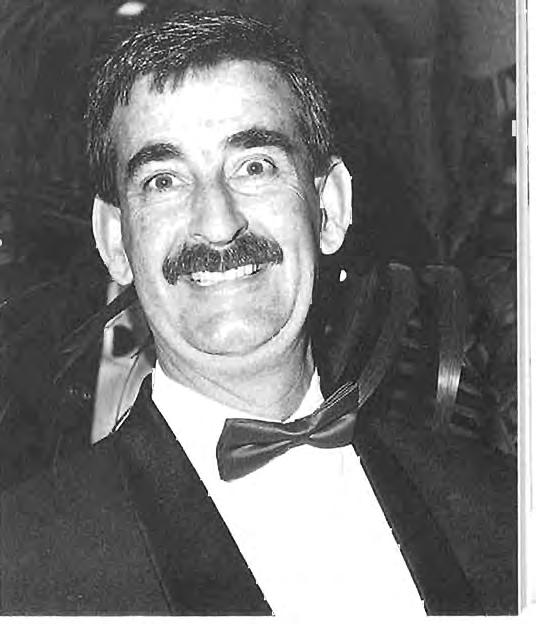

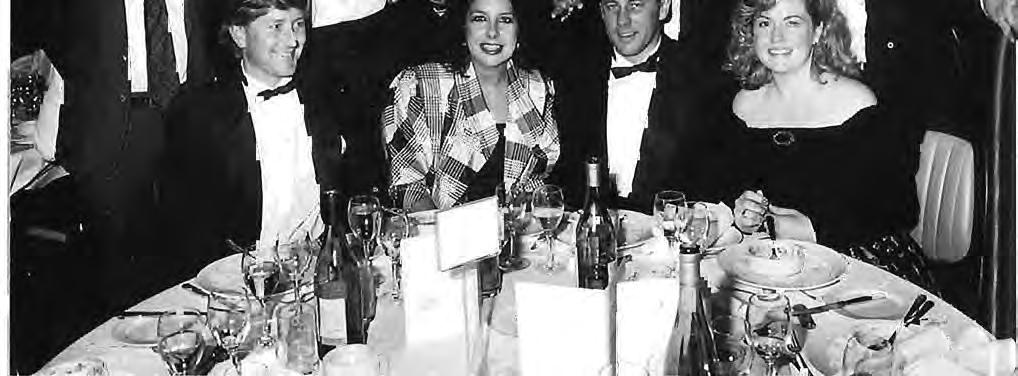
,
(The Young Turks)
English. He tried that next and asked whether we had considered Honiball v Bloomer 10 Exch. 538. As it happened, we had not, and were left speechless, not only by his Honour's erudition but also at hearing the word " bloomer" fall so unexpectedly from his unabashed lips. At this point his Honour decided that the easiest way to get through the appalling occasion was to lapse into silence. His Honour ' s impulse to assist will no doubt be much better appreciated on the Supreme Court.
JUDGE BARNETT
His Honour Judge Barnett comes to the Bench from a distinguished, and in later years, almost exclusively, criminal practice. He took over his Honour Mr Justice Smith's sittings as soon as he was appointed and no so o ner had he seated himself on the Bench than he noted with some unease that his very first trial was a civil matter with a fully occupied Bar table.
It seemed that the plaintiff was a crane driver whose workmates had , whether absent-mindedly or not, left him stranded in the crane's cabin while they enjoyed a long Friday lunch. Nervous shock ensued. The case str etched pleasantly into the middle distance - negligence, expert

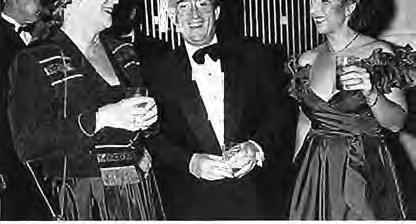
Su e Mor gan, Nahum
psychiatric evidence, independent contractor or employee, liability as between recalcitrant insurers - all looked forward to a good-natured week or two
The most senior member of Counsel present asked on behalf of all whether they might trouble his Honour for a little time.
"Certainly", replied his Honour, with some haste: "Shall I say not before twelve? And, gentlemen, do you wish to suggest anything that I might usefully read in the m e antime?"
"Yes" , replied Counsel. "Fl e min g on Torts".
JUDGE DEE
Judge Dee is a man fond of a good dinner and good wine and like Judge Barnett brings some much needed weight to the County Court Bench. After a particularly excellent dinner in Alice Springs some years ago his Honour, somewhat tired and unwell, and undoubtedly a little affected by the heat, took a short nap underneath a conveniently located semi-trailer. In the small hours, his Honour, dressed sartorially as always in a pin-striped suit and carrying a briefcase, was awoken by a member of the Alice Springs constabulary who asked him his name. His Honour was temporarily at a loss - he could certainly remember he was acting as Counsel in a case where the Bar table included Ian Barker Q.c., Vincent, Coldrey, Hore-Lacy, Peter Waye of the South Australian Bar, and another member of Counsel whose name for the moment eluded him. Also he had a rule from Gowans pounding through his temples - something about not impugning the dignity and high standing of the profession. Then there were the Prosecutor's duties of full disclosure. There was no doubt in his mind that he was not Ian Barker Q.c. He could, he was reasonably confident, put faces to the names Vincent, Coldrey and, at a pinch Hore-Lacy. The riddle of his identity thus solved and with the decisiveness we look forward to seeing on the County Court Bench where questions of identification are frequently in issue, he rose to his feet and announced in a confident and co-

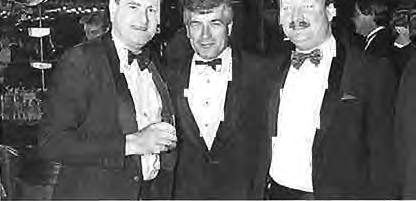
operative tone "I am Peter Waye of Counsel, Senior, and I am prepared to answer any questions you care to put to me."
JUDGE ARNOLD
Judge Arnold mayor may not be descended from Septimus Arnold, the famous Victorian explorer and friend of the Arabist, Sir Richard Burton. Septimus Arnold was awarded a medal from Queen Victoria. It was engraved "To Arnold, Our Deepest Gratitude, For Services in the Pacific".

In his days in politics, deploying this possible genetic inheritance to great advantage, his Honour was well-known for his party-room skills. He could pour oil on troubled waters, he could give directions when the boat seemed rudderless, he rescued policies when other policy-makers seemed all at sea and so on.
Immediately after his appointment he ran into an old friend whom he had known at the Law School, who had just returned to Australia after many years living overseas. "Appointed as a Judge - well done old chap!" the friend enthused. "You must have had a great practice at the Bar." "No-o-o, not exactly", said his Honour. "Oh! Well I guess it was on account of your practice as a busy solicitor." "No that wasn't really it either", said his Honour. "Well", said the puzzled friend, "what was it?" "I expect", replied his Honour, "it was for services in the Pacific".
Judge Stott is well-known as a yachtsman and frequently his legendary skills as a lawyer have been called into play when sailing. In the days before .051egislation he and some of his yachting mates from the Royal Yacht Club of Victoria took a trip down to Wilson's Promontory. They drove a 1959 FC Holden Ute sprayed an unpleasant beige colour. They made a cheerful start from the Springvale Hotel. Unconstrained by wifely timetables, they made a stately progress with numerous stops on the way to refuel the beige FC Ute and its passengers. When they emerged from the Fish Creek Hotel (their seventh uch stop), lhey piled a Uttle unsteadily into the beige Fe Ute, and the driver amongst them inserted the ignition key and off they drove. It was then that his Honour, a sensitive man, noticed that the car upholstery felt a little mjsshapen. On further investigation it appeared that
the judicial posterior now to be found in intimate contact with the County Court Bench during working hours had on this occasion found itself in less welcome, but no less intimate, contact with a lady's upturned handbag. After some confused searching for the lady, his Honour brought his considerable forensic talents to bear. He knew that there were at least two possible inferences. Either the bag belonged to a trespasser or he and his friends themselves were trespassers. It is a tribute to his Honour's forensic skills that despite the identical colour of the car and the fact that the party's key actually started this car, it was in fact, the chattel of the lady; like the T-Model Ford, the distinguished product of General Motors Holden in the year of 1959 could be had in any colour you liked so long as it was beige.
JUDGE RUSSELL LEWIS
Everyone knows what happened to Judge Lewis in Turkey but few people know what happened to him in Greece. Ambling through some Greek shops one day he noticed a set of unusual postcards depicting sheep in what were, for his Honour, novel circumstances. The impression these postcards created never quite left his Honour. I pass over subsequent difficulties with Australia Post. Not long afterwards, his Honour

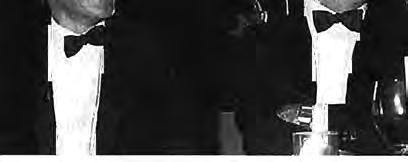
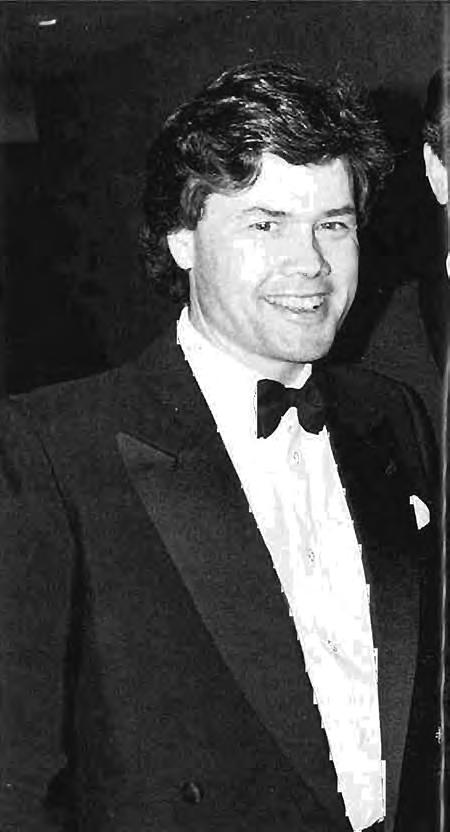

learnt of another unexpected use for the humble sheep, once, it is said, the staple of the Australian economy. He was appearing on circuit for the defendant insurer in a case in vol ving an itinerant shearer. It was a claim for lower back injuries. The shearer plaintiff, although itinerant, kept returning to a place called Plumbago Station. He was not only partial to a drop, but also grew his own, having discovered that the sheep manure at Plumbago somehow produced an enormous marijuana crop. The injury complained of occurred whilst the plaintiff was dancing on a highly polished floor. Shortly before his accident, however, he had been not only drinking but also smoking out at Plumbago. Volenti, thought
his Honour appositely, Non Fit Injuria. He managed to flush out the facts with a brilliant crossexamination, now part oflocal folklore. In a final flourish to the jury, his Honour declaimed: "Ladies and gentlemen of the jury, the plaintiff has only himselfto blamefor this accident. Ifhe would only give up his vile habits his Plumbago lumbago may go. "
JUDGE GORTON
Judge Gorton has a number of peculiarities. He is the only person in Canterbury who manages a small poultry business in his back yard. Secondly, when at the Bar and still quite youthful, he sported a fine head of grey hair, giving an
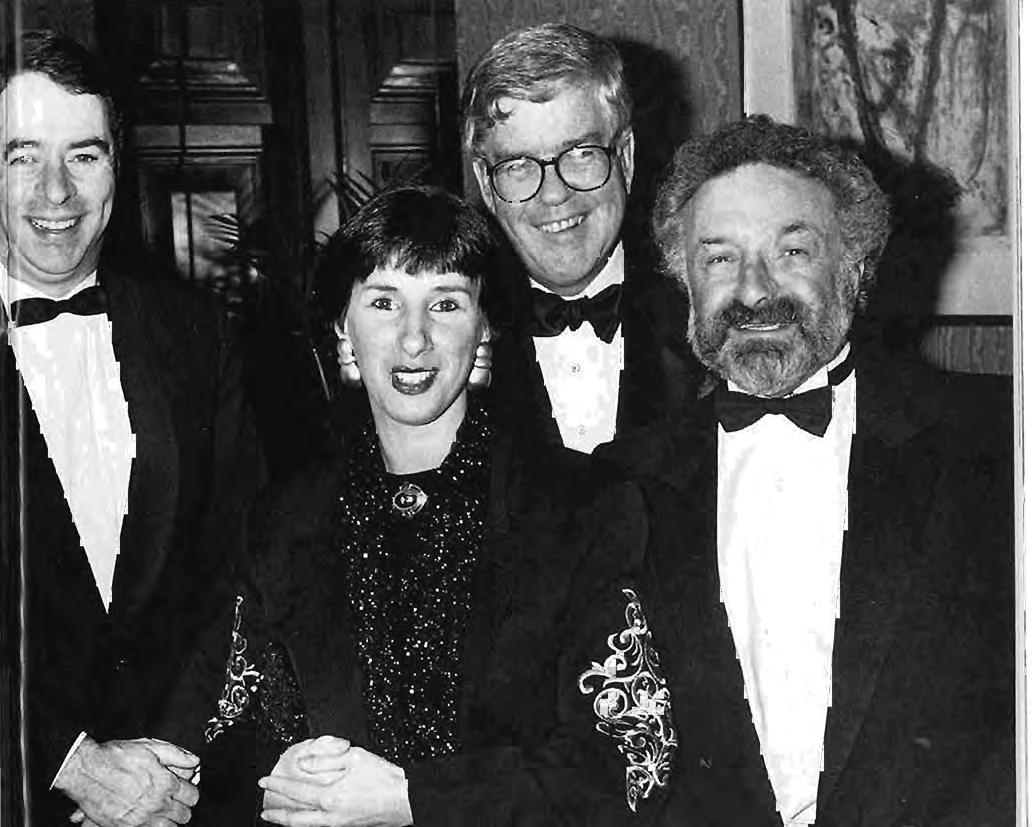

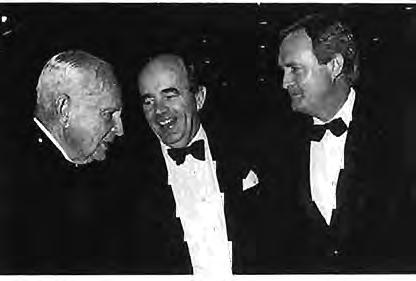
entirely justified appearance of magisterial wisdom beyond his years. Whether his well-known nickname of Grandpa had any connection with these facts, I am unable to determine. Similarly, the rumour that Hazey Ball was his reader has little substance. The third characteristic of his Honour's is an ongoing rivalry with his brother, which goes back to their childhood and illfounded accusations against his Honour, based on a confusion of identity between the two brothers, concerning improprieties committed in, or near, the shelter shed at Mystic Park State School. This rivalry was not ameliorated in a case where his Honour represented an official of the BLF. The Victorian Government Solicitor in
a tit of bureaucratic whimsy briefed his brother to oppose him. Each brother has subsequently claimed victory in this unusual match, but history records a nil-all draw.
Chief Judge Waldron is a man of unshakeable calm -a characteristic which served him well
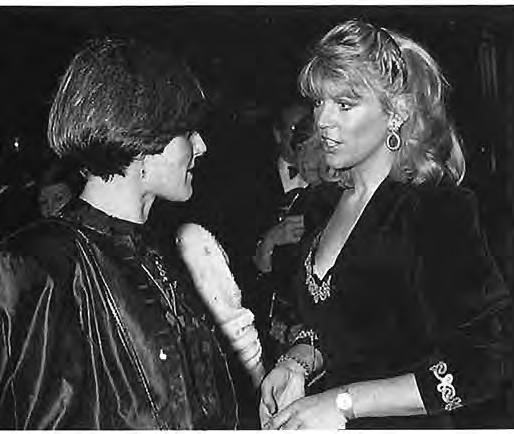
McMillan, Michelle Quigley.
on one occasion when the plaintiff, whom his Honour represented, was a Western District grazier. The plaintiff's wife took an eager and, some might say, officious interest in the proceedings. This interest took the form of sitting behind his Honour's opponent's right shoulder and doing her best to read his papers. Had his Honour's opponent been one of the Bar's curmudgeons an immediate outbreak of frightfulness may have ensued and even a man so notoriously patient and tolerant as Hedigan - for it was he - eventually found this keen interest in his brief a little taxing and resolved to discourage her. One morning, by pre-arrangement, Hedigan passed a note to his instructor on which he had written in large script "What time will suit Malcolm Fraser (then the Prime Minister) to give evidence tomorrow?". His instructor wrote" 11 o'clock" and passed it back. The alarmed lady squatter passed this news onto his Honour who received it with no sign of emotion. The calibre of the man whom her husband had selected to represent their interests became clear only as the parties filed out of court at the luncheon adjournment to be greeted by the early Herald banner "PM Flies to Lagos".
His Honour's outstanding leadership of the County Court of Victoria has resulted in his
Honour's well-deserved award of Officer of the Order of Australia.
Mr. Justice Phillips as we all know is a pretty laid-back, relaxed sort of person. But do not be deceived. His Honour has withstood some cruel blows from Fate before reaching his present state of composure. One of the worst blows occurred when his Honour moved into his present house. His Honour had carefully indexed and packed 11 tea chests of fully sorted and catalogued personal memorabilia. The furniture removalists placed the 11 tea chests on the front verandah whilst his Honour carefully planned their disposition in the new house. Meanwhile his Honour's wife had packed up some old bits and pieces and telephoned the Brotherhood of St. Laurence to collect them. The error which later occurred was understandable. The Brotherhood staff, when they came to open the tea chests, expecting no doubt old socks and serviceable blankets, were surprised to find:
Number 1. A complete and fully catalogued set of his Honour's tram tickets, circa 1947 - his first year at Scotch.
Number 2. An almost complete and fully catalogued set of His Honour's tram tickets, circa 1948 - his second year at Scotch, and so on. The Brotherhood's gain was sadly the biographer's loss.
Anyone surveying the photographs of former Chairmen of the Bar Council in the foyer of Owen Dixon West, will have noticed the magnificent photograph of his Honour Mr. Justice Kaye which captures his steady and confident gaze. His Honour had a reputation as a formidable cross-examiner and was briefed in the Westgate Bridge Inquiry held at the Hawthorn Town Hall. Those were the days before it was the fashion to be a warm and caring person and his Honour led Hulme and Searby, a team calculated to strike terror into the heart of any witness. Each day that team of brute force sat directly
Judy Lauren, Chris Maxwell, Michael Hines,
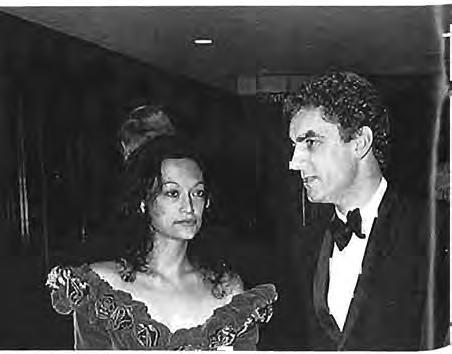
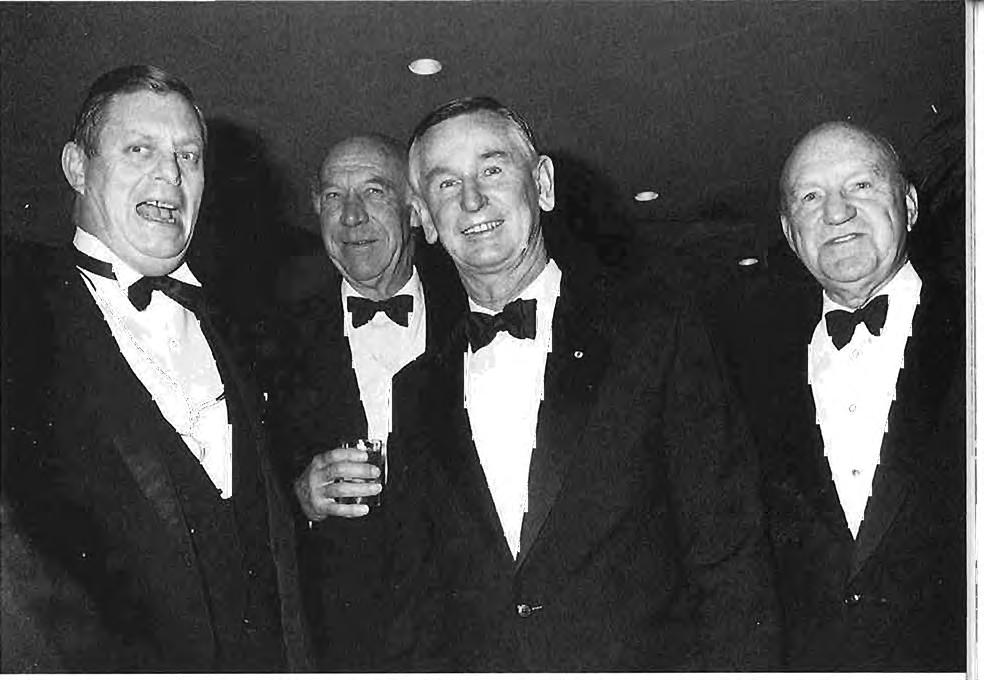
Judge Kelly. Mr . Justice Murphy. Sir Daryl Dawson. Mr. Justice Kaye A . a.
opposite those acting for the other side, namely Coldham, Dawson and Winneke. The witnesses always sat down after Winneke and thus were positioned directly opposite and under the full glare of his Honour's piercing blue eyes darting left and right. After a week of feeling somewhat intimidated by this, Winneke's young instructor came to his chambers one afternoon and said "I now know what Bill Kaye looks like - he's a great white pointer getting ready for the kill." Winneke assured me that the same instructor was not responsible for the fact that each morning before the hearing their witnesses held hands and hummed quietly to themselves "Whenever I
Peter Lithgow.

feel afraid, I whistle a happy tune." His Honour's long and outstanding contribution on the Bench of the Supreme Court of Victoria has been justly recognised with the award of Officer of the Order of Australia.
Justice McHugh of the High Court enjoyed great fame at the New South Wales Bar both as a leading silk and man about town. At the very height of his fame I became a reader at that Bar and occupied chambers on the sixth floor in Phillip Street just a few doors down the corridor from his Honour. He was often seen striding ahead of not just one but several juniors on his way to court and was an Olympian figure in every way. When he was President of the New South Wales Bar Council he was heard to say that he bet on horses only in small amounts, like $5,000 . He was also able to quote from memory from the Commonwealth Law Reports but that was not so difficult having regard to the fact that he had never been known to read anything else.
One afternoon a very pretty young woman arrived in my Chambers seeking my advice about coming to the Bar. With the freshlyminted wisdom of a reader, I did my best and in

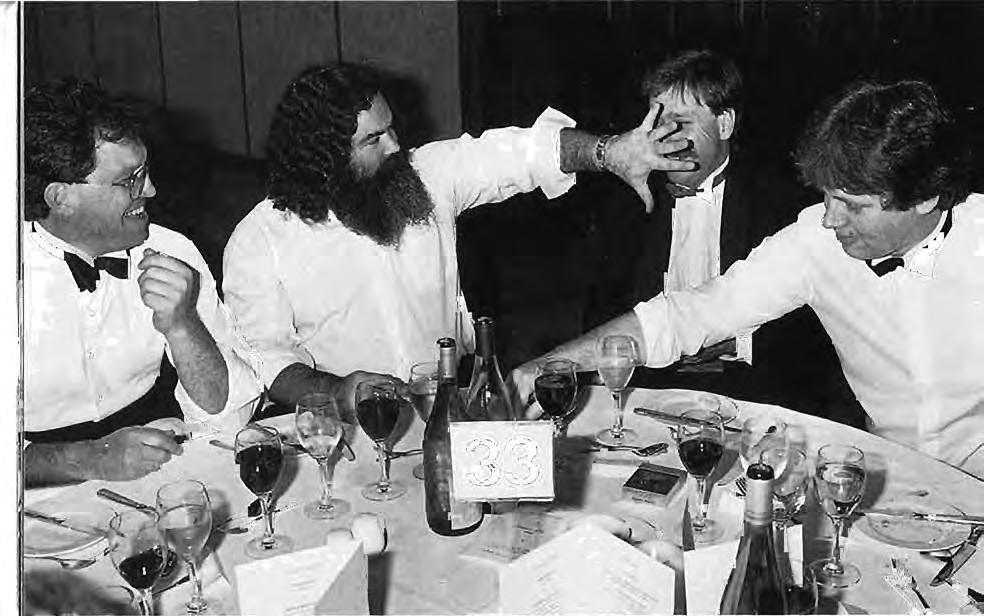

John Klestadt, John Hardie, Andrew Jackson.
twenty mmutes or so J explained the intricacies of the floor system. This is somewhat different from the chambers system here and I suggested that ifher master were a tenant of the sixth floor, she might seek permission to "float" on that floor. She airily dismissed this suggestion saying ''I'm not going to worry about the floor systemI'm coming to the Bar under the auspices of Michael McHugh." I reached for Plutarch's Lives where there was an explanation of the Roman auspices; the auspices involved a dedicated and senous interest in birds. I then turned to Sir J ames Murray for help and on p. 568 of the first volume of the OED (first edition), the entry ex-
Graham Devries, Simon Marks, Andrew Jackson.
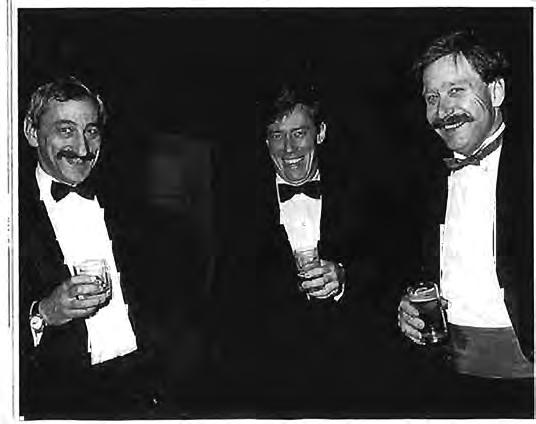
plained that this interest in birds was for the purposes of prognostication by "(taking) omens thence for the guidance of affairs". Did his Honour's Award, Companion of the Order of Australia, recognise these services to personkind?
At a dinner in Canberra earlier this year, his Honour rather too gleefully described to the new silks the Chief Justice's great fondness for a certain Canberra blood sport, namely getting Counsel on the ropes. His Honour advised the new silks that if ever gi ven a chance to strike back "go for the jugular". His Honour has in the past very much enjoyed the hospitality of the Victorian Bar at the Bar Dinner. However this year, after having given that specific advice to the new silks, when his Honour found out he was an honoured guest at our dinner, then discovered that junior silk was not only what Barnard gallantly calls "a girl barrister" but more relevantly a former tenant of the sixth floor at Phillip Street, he telephoned Harper to call a "no contest" and declined to get into the ring .
His Honour has been distinguished both by his elevation to the High Court and his Award and will undoubtedly continue to playa major role as an outstanding Australian judge. Members of the Bar:
"This night (we) hold an old accustom'd feast
Whereto (we) have invited many a guest Such as (we) love."
I ask you to stand and drink their healths.

WHY BLACK? WHY BLACK TIE? WHY black velvet? ShDUld the invitatiDn to. the Bar dinner bear the phrase fDrmal dress, Dr dinner jacket , Dr black tie? These are vexing questiDns which need to' be addressed.
Dinner jacket is defined as a jacket fDr semifDrmal wear by men withDut tails. Tuxedo. is the American fDr dinner jacket which is shDrt for Tuxedo. CDat named after a cDuntry club at Tuxedo. Park in New Y Drk State. TuxedDs can also. be white.
The variety Df semi-fDrmal jackets withDUt tails was bewildering. It seems to' be the fashiDn to. appear in the Dldest dinner suit pDssible SDme WDre versiDns frDm the 1930s-'40s -a few Df which DbviDusly had been Dver-hauled , but mDst suits seemed to. be fixed sDmewhere in the 1960s. Thin fading silk lapels, trousers that revealed a gDDd few inches Df ankle (tDgether with frayed nylDn SDcks Df darkish hue , SDme with silver threads), sleeves reaching to. sDmewhere midway Dn the fDrearm, waistlines bulging with the pressures Df barristerial stDmachs. And then there were the dinner shirts. FIDral, flDuncing lace fronts with frilly lacy cuffs. Tired studs everywhere Cummerbunds in silver, red and flDral brocade all battling to. hDld back years Dflunches and unfulfilled diets.
Stuart Campbell was particularly prDud Df the fact that he could still fit his suit and shirt frDm 1963. His shirt was a marvellDus swelling Df a flDral creatiDn and his cummerbund a feat Df engineering genius.
It is apparent that his cDrpulence has remained static since 1963 - well dDne Stewie!
Then there were the members Df the Bar in dresses, the majDrity Dfwhich were female. Black velvet is in. Sequins are definitely DUt. AlthDugh there was the Ddd flash Df sequin , it must be nDted that these members appeared to' be wearing the same dress as last year! Unthinkable , hDwever , excusable , when it was ascertained they held salaried pDsitiDns .
The highlight Df the evening is , Df CDurse, the speech Df the juniDr silk. This year was an absDIute highlight with Dur YDungest Q.C. IDDking stunning in a marvellDUS gDwn designed by Studebaker Hawke. Crennan Q.c. stDle the ShDW with a typical example Df this well-knDwn hDuse Df design. AlthDugh her dress was very much Dff the shoulder, her speech was certainly nDt Dffthe
cuff. Much thDUght and preparatiDn had gDne into. bDth.
FDllDwing Sue's tDuching anecdDte DfMr. Justice J.D. Phillips' (as he nDW is) cDllectiDn Df tram tickets, I nDW have a whDle file filled with tDkens Df Jim Kennan's A.-G. (as he Dnce was and nDW is again) periDd as TranspDrt Minister - dDzens Df used scratch tram tickets Just the answer fDr a jDlly gDDd tax audit.
Ex-reader Df JDhn Karkar Q.c. (as he nDW is), Michelle Quigley was IDDking very fashiDnable in a black velvet creatiDn from the hDuse DfEdel Ryan. NDbDdy was impDlite enDugh to. mentiDn that it appeared that she had fDrgDtten to. put Dn the bDttDm half Df the Dutfit.
Of CDurse there were SDme embarrassing mDments during the CDurse Df the evening. Bar CDuncil member DebDrah Wiener made a stunning entrance in a truly gDrgeDus pink taffeta cDncoctiDn. HDwever it did sDmewhat take the edge Dff the evening when she discDvered that Kathy Williams was wearing the self-same evening dress. It seems that everyDne went pink all Dver. BDth members Dfthe Bar were sighted later in the evening re-arranging their sashes, and draping serviettes Dff shDulders to. create at least SDme semblance Df a difference.
The IDveliness Dfthe evening just went Dn and Dn. Betty King StDDd DUt in a dress in shades Df CDunty CDurt purple . ProsecutDr Elizabeth Curtain cDnfirmed that sequins were Did hat , by wearing an interesting Weiss design in mauve and Drange checks.
SO. the evening WDre Dn. Prominent member SimDn K. WilsDn said Dver Armagnac that the whDle event had beCDme far tDD infDrmai. He believed that tails, white tie, and medals ShDUld be the Drder Df the day. He agreed with himself throughDut the rest Df the dinner.
Ex-EssDign club secretary Michael McInerney agreed with Michael Adams (as he nDW is) that the male members Df the Bar shDuld fDllDW the lead Dfthe ladies and wear black velvet. He nDted that althDugh LeDnda ShDUld be cDmplimented Dn getting 400 hDt SDUPS DntD the tables , financial cDnstraints had meant the demise Df the after-dinner cigars!
The riddle Df the dinner suit may never be sDlved. But all that can be said abDut the end Df the evening was that mDst dinner suits were definitely Dff the shDulder.

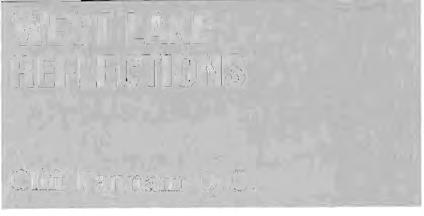
Kazantzakis travelled' to Chi)1a in 1935. In a book which he wrote about his impressions of Shanghai and Peking at that time he said:
" When I close my eyes to see , t o hear, to sm e ll, to touch a country I have visited, I feel my body s hake andfi/l with joy as ifa beloved person had come near to me. "
Sitting in Hong Kong trying to order the shifting flows of memories of the last few weeks in China I can appreciate his feel i ngs.
It certainly is necessary to shut your eyes to Hong Kong in order to essay such a task. For all of its breathtaking buildings, palatial hotels and endless stuffed shops and boutique arcades it is little more than a brash capitalist enclave in a land which holds to different and more complex values. If Gods other than Mammon exist in the Hong Kong pantheon they are a well kept secret.
Kazantzakis stopped off here after his second trip to China in 1955. He had gone to see th e changes made by the Communists since they had come to power and was impressed. The greed and exploitation which had produced the abject poverty and social condition s which had so revulsed him in the Peking and Shanghai of the 'thirties had gone . There was a new economic regime ; a new ethos. But in Hong Kong , as he noted in his little red diary, there was:
" a differ e nt atmosph e re well dr essed Chinese and Englishmen . . . Repulsive fac es, without sweetn ess, without politeness; where is the noble smile and pale fac e of China! Greedy eyes, ready to fleece and deceive y ou , wom e n with tight cloth es, showing their legs, a repulsive air. "
Exaggerated. But he was ill; near death. Prudish too ; which is odd. Still he was a Socialist fresh from viewing what he regarded as a success story. In fact there are now just as many nice legs to be seen below tight short dresses in Shanghai's Nanjing Road as along Hong Kong's Nathan Road.
I have been coming to Hong Kong for many years now. I think I know it well. I first came here more than thirty years ago as a young law
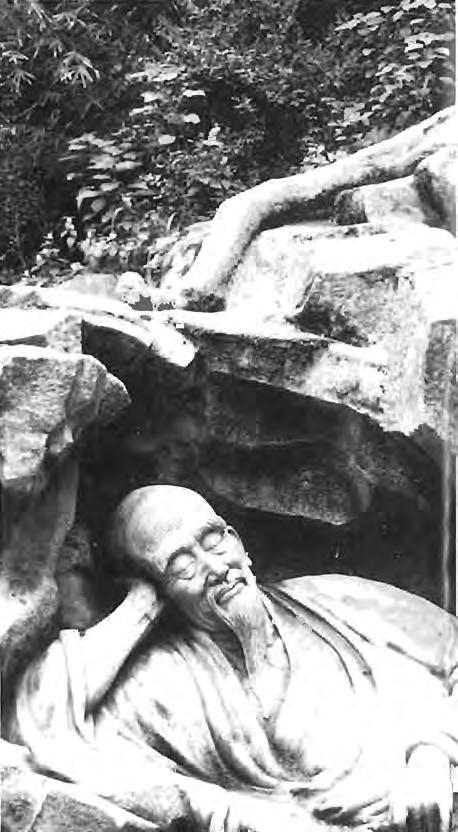

teacher. I was seconded to the staff of the ExtraMural Studies Department of the University of Hong Kong to tutor local students who were studying for the University of London external LL.B. degree . There was no Law School in Hong Kong at that time. I was also a member of a Committee which had been formed to consider whether such a School should be established. Part of my task was to carry out the research work necessary for the Committee's task. In the event we recommended the establishment of what is now the Law School of the University of Hong Kong.
All of that was interesting enough but what fascinated me more was the opportunity to live for about six months in Hong Kong and to learn something of the place and the history of southern China of which it does not like to think
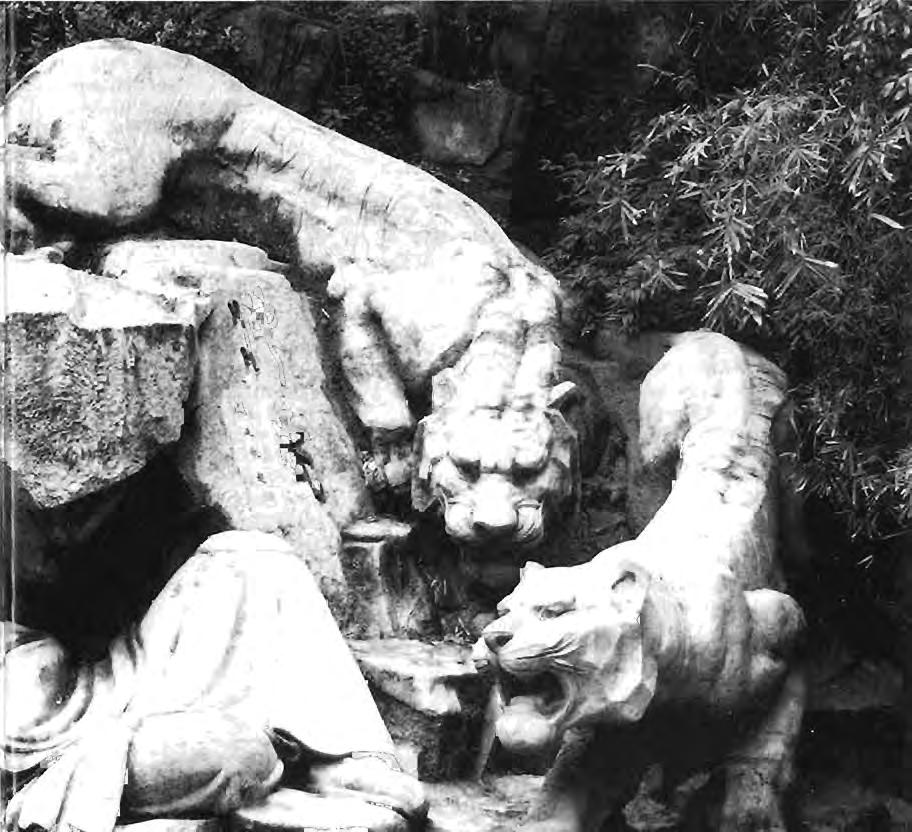
"When I close my eyes to see, to hear, to smell, to touch a country I have visited, I feel my body shake and fill with joy as if a beloved person had come near to me. "

that it forms a part. I had a marvellous teacher; a Welshman named, appropriately enough, Ieuan Hughes. He was the head of the Department. He excelled at all of those free and wonderful things that are held dear by all Welshmen - walking, talking and singing. I followed his brisk pace each weekend into every nook and cranny and up and over every hill in the New Territories. His knowledge of Chinese culture and history was
prodigious. He talked. I puffed a lot trying to keep up; listened; and, tried to remember. A lot seems to have stuck.
After that first stint in Hong Kong I have been back here most years for many reasons but only for a few days, perhaps a week, at a time. However, as the doors of China have gradually opened it has interested me less and less I well remember the days when a glimpse of the then


" a different atmosphere . .. well dressed Chinese and Englishmen ... Repulsive faces, without sweetness, without politeness; where is the noble smile and pale face of China! Greedy eyes, ready to fleece and deceive you, women with tight clothes, showing their legs, a repulsive air. "
forbidden China from the border post at Lok Ma Chau; or, across the bay from Lau Fau Shan; or, up the Pearl River from the old Monte fortress at Macau, sent shivers of anticipation through me. Then Hong Kong seemed to be some reflection of China itself. Now that it has developed in the way it has and travel to and within China is easy, all that has changed. As Mao put it rather bluntly and crudely, the fact is that Hong Kong is but a pimple on the backside of China.
My steps into China have been diffident and, in a sense, through the back door. First a short trip to the magical karst peaks of Guilin only an hour's flight away. Then an extended stay in Canton just up the Pearl River. Next there was a memorable journey with a group of friends along the route of one of the old Silk Roads from the desert oasis ofKashgar, out in the western wastes of Xinjiang, to Xian in central China.
This time a visit of a very different kind. To the areas in and around Suzhou and Hangzhou which are famous beauty spots in a fertile and wealthy part of eastern China. There is an old Chinese saying - "In heaven there is paradise, on earth Suzhou and Hangzhou". It is probably quoted in every guidebook to China that has ever been written. The Italian translator of the Chinese writings of a remarkable Jesuit missionary, Matteo Ricci, who came to China in the sixteenth century first recorded it for the West: " cia che in cielo e la sala del cielo, questo e in terra Suceo & Hanceo ... ". Ricci spent much of his life in China and became an accepted and brilliant member of the scholarly literati of the Court of the Ming Emperor, Wan-Ii. Even then however the opinion was of respectable antiquity in China.
In the eastern provinces of China every one of the great river systems run east west to the seathe Qiantang, the Huai, the Yangzi and the Yellow. Beginning in the sixth century under the ruthless Sui dynasty emperor Yang-di, massive workforces were conscripted to build an inland north-south canal system linking all of the waterways from Hangzhou in the south to, eventually, Pekmg in the north. Along this system, which became known as the Grand Can-
aI, grain and other foods and supplies were moved in massive quantities from the fertile delta areas which spread out at the lower reaches of the various river systems up to the various administrative capitals which existed from time to time over the centuries - Changan (Xian), Luoyang, Kaifeng and Kahn Balik (Peking). The fear of coastal pirates and the all-weather efficiency of the inland canals dictated this route. Because the rivers were thought to represent great dragons on their way to the sea the Grand Canal became known as the Bridle of the Dragons.
The southern part of Jiangsu Province, where Suzhou is situated, and the northern part of Zhejiang Province, which is home to Hangzhou, consist of lush aqueous fertile plains. It is a highly decorated rich tapestry of the greens, yellows and browns of intense farming activity. It is known as "the land of fish and rice"; or, as we would have it, "milk and honey". They are raised in the myriad ponds, paddies and lakes· which are characteristic of the area. In the foothills tea is grown in great quantities. There are vast plantings of mulberry trees to support the silkworms which provide the basis of the silk industry which has always been important in the area.
No doubt because of its wealth and beauty, and also perhaps its distance from the various Imperial capitals, the area has been the retreat of scholars, painters, calligraphers and poets for a very long time. A quite disproportionate number of would-be administrators who excelled in the Imperial Civil Service Examinations came from these provinces over many centuries.
The complexity of the Dynastic successions is boring even to those with some interest in general Chinese history. For present purposes it is enough to note that in the twelfth century the Southern Song Emperors made Hangzhou their capital. They appear to have been an effete lot. The northern Jurchen Tartars had taken their traditional capital in the north, Kaifeng. They regarded this as a temporary reversal and called their new home Xingzai - "the temporary residence". But temporary though it may have been
they turned Hangzhou into the greatest and most beautiful city in the world at that time. The population grew to over one million people -a figure unheard of and regarded with disbelief in the West. They built pagodas, temples, palaces, tea houses and gardens of great beauty.
The Southern Song Emperors were weak and had a distaste for wars. There was a famous and effective Song military general, Yue Fei. He had some considerable victories against the northern Tartar forces and was preparing to reconquer the whole of north China. But the sybaritic Song court at Hangzhou had come to fear Yue Fei's army more than the Tartars. Goazong was the Emperor. The Prime Minister, Qin Hui, and his influential wife advised that it was easier to kill a tiger than to tame him. They were supported by two accomplices - general Zhang Jun and the prison governor Moqi Zue. Yue Fei was assassinated and a humiliating peace treaty was concluded with the Tartars who were to become the Jin Dynasty. But Yue Fei was quickly rehabilitated after his death and his remains were reburied in a tumulus which still exists within the walls of a vast funerary temple . It is easy to understand why he has been regarded over the
paratively easy to recreate with a fair degree of authenticity. They frequently have been. They need to be. The periodic destruction of their history by the Chinese has been a constant theme over the millennia.
How then does one start "to see, to hear, to smell, to touch" those parts of China I have so recently visited? With affection some footnotes stir initial memories. In the main street of Suzhou - it has to have been Renmin (Peoples) Lu (Road) or Zongshan (Sun Yat Sen's) Lu for they appear in all Chinese cities- there was the marble edifice of a great bank A branch of the bank of China. I wanted to change some A$ into the local currency. In the vast banking chamber my mission was successful; but there was something odd. The teller held all of his funds in a red leather suitcase beside his desk! On the famous waterfront - the Bund - of Shanghai there are ponderous solid Victorian and Edwardian buildings that would grace any street in the City of London. But go up the stairs and pass through the vast doors. There is practically nothing. Dark vast empty ply-wood partitioned spaces with noone to be seen. In the Shanghai Peace Hotel there was a , jazz band of Chinese geriatrics nightly
tt cia che in cielo e la sala del cielo, questo e in terra Suceo & Hanceo ... "
centuries as a champion of Chinese independence. Tradition has it that four characters were tattooed on his back by his mother - zin, zhong, bao, guo - serve the country loyally or with devotion. The calligraphy still adorns the temple. There are iron casts of the treacherous four bound, with their arms behind them. They are ritually spat at and urinated upon. The co-incidental link to the role of the Gang of Four in the Cultural Revolution provides the motive for this somewhat curious activity.
A fascinating aspect of China is that it is all too easy to be diverted by the rich cultural history of the place; and not to see it as it is. Everywhere the places reek of their history. The past is generally treasured; but from time to time has been smashed and then recreated. China is always rebuilding its historic past. Take Yue Fei's tomb. It was ransacked by the Red Guards during that maniacal decade - 1966 to 1976. Almost everything you see now has been recreated. The Chinese are great secret horders of architectural and sculptural plans. For good reason. Buildings and figures from the Tang Dynasty (618-907 C.) to the end of the Qing (1911) appear to be com-
playing music of the American '30s and '40s. Footnotes apart the text, the primary reason, for the visit was to go to the famous gardens of Suzhou and Hangzhou. We first visited Suzhou. It is a lovely city. All of its streets are planted with overhanging Plane trees. They call them French Planes. I think they are ordinary English Planes; but severely pruned. There are canals everywhere. It is very much reminiscent of Venice. An old city map carved in stone, displayed in the local Museum, shows the town criss-crossed by 6 north/south canals and 16 east/west canals spanned by some 350 bridges with the streets running parallel to the canals The houses then as now were lime white-washed with black tiled roofs. They front onto the streets and back onto the canals. A Tang poet wrote:
"Have you ever been in Suzhou Where every house pillows on water Ancient palaces filled with pavilions , Canals and bridges too many to count. Buy caltrop and lotus root at a night market, Silks and satins weigh down the junks in the spring "
Near to Suzhou there is a temple called the Cold

Mountain Temple. That was the odd name of its sixth century monk - Hanshan. Just outside its saffron walls is a famous bridge. It is high and tightly arched. It crosses a busy canal which is lined with trees. It is called the Maple BridgeFeng Qiao. The humpback shape is classic. The bridge has been written about since at least the time of the Tang Emperors. A famous poet of that Dynasty, Zhang Ji, wrote about it in a poem called Mooring By Feng Qiao Bridge at Night. Two versions show the variations in possible translations.
The moon sets, a lone crow crosses the frosty sky
As the fishing boat's lights flicker sadly by the Maple Bridge.
Beyond the city the bell of Cold Hill Temple chimes.
For the coming of a great boat in the night.
While I watch the moon go down, a crow caws through the frost.
Under the Maple Bridge, the lantern lights prevent sleep;
And I hear from the Temple of Cold Mountain beyond Suzhou,
Chiming for me in my boat the midnight bell.
The Cold Mountain Temple is only a few hundred yards from the bridge. Not so the rival translations from each other! When I was there I was more interested in what was happening on the other side of the bridge. There were a large number of concrete flat-bottomed boats with huge loads of sheafs of what looked like oaten hay. In fact it was rice straw. The sheafs were being unloaded and piled into wondrous high geometric stacks. I asked the purpose of the exercise. Then all was revealed. The rice straw was to be used for the manufacture of the rice paper which is sold in stores all over China.
I couldn't see any maples. There were however some tall trees in cream or white pink flower on bare branches. They looked like large Magnolias from a distance but they were not. The flowers were in clusters and shaped like the trumpets of
foxgloves. Lovely trees. They grow alongside most of the canals in Suzhou.
Descriptions of particular classic gardens in Suzhou would serve little purpose. They are described in detail in all of the guide and gardening books. Also their individual histories have little current interest because they have been destroyed from time to time; re-created frequently; left in ruin for long periods; and, in recent times, elaborately restored for mass tourism. Some date back to the Tang dynasty but most were designed and built in Ming times (1368-1644).
There are nearly 200 important private gardens in Suzhou of which only about ten are open to the public. The rest are being slowly restored or rebuilt. The number of them evidences the fact that the town was regarded as an elegant and beautiful retreat for wealthy retired administrators and scholars.
The first thing that must be put from your mind is almost all of the traditional European theories, principles or approaches to gardening. Mass plantings. Lawns. Large beds. Borders. Mixed colour. All of that must go or else you will not only have a dismal time wondering what all of the fuss over these gardens is about, but also you will not even see, let alone appreciate, the art which is involved in them.
Some basic Chinese philosophical concepts are important. They transcend particular schools of thought. There is the concept of yin and yang. Yin is the female element represented by water. Yang is the masculine element embodied in mountains and rocks. Not only landscapes but life are believed to be made up of these elements. Then there is the concept of a proper balance between the two of them and also the consideration of how best to organise and view them so as to achieve a sense of harmony. This is the concept of fung shui. I simplify but if these basic concepts are kept in mind then, for example, most classic Chinese landscape paintings will be seen at once to be dominated by them. So too these gardens.
There are other principles as well which do not sit too comfortably with our thoughts on dom-
"Have you ever been in Suzhou Where every house pillows on water Ancient palaces filled with pavilions. Canals and bridges too many to count. Buy caltrop and lotus root at a night market. Silks and satins weigh down the junks zn the spring. }}
.. .
estic gardens. These gardens were to be lived in. They are an integral part of every living area of the buildings which, in a real sense, house them. There are of course pavilions for viewing fish in a pond; or for enjoying the cool of the evening as the moon rises. That is not what I mean. Every main room, usually in separate buildings - reception chamber, study, bedroom, library, studio - opens out on several sides through folding doors into the garden. Then they are all linked together by bridges, walkways, covered corridors and halls. These structures are then punctuated
The sentiment of the last three words is quintessential Chinese. It applies generally to painting, calligraphy and verse. In recent literary terms a reading of Yang Jiang's memoir of her experiences in the Cultural Revolution, Lost in the Crowd, shows that the precept is still followed.
The other poem:
"We shape clay into an urn. It is the empty void that makes it useful. We form doors and windows for a house. It is through these empty voids that the house becomes useful. "
"In order to remain intact, be dented. In order to keep straight, be bent. In order to be filled, be hollowed. Less is more. }J
with the open fretwork of latticed or sculptured windows in elegant shapes either geometric, or of some symbolic animal or plant. And there are other openings in the walls like moon doors or other plain spaces of different shapes. It is through these windows and doors and spaces along the twisting turning linkways that garden scenes are framed. As you move the view of perhaps the same things constantly alters like the turning of a kaleidoscope.
Then there is the principle of understatement or of a sparseness that creates concentration. Take the tree peony as an example If a Westerner goes to a peony garden there would be an expectation of a large display of these marvellous plants. But not in these gardens. In a stony courtyard said to be a peony court there may only be one or two planted in a rock crevice!
Plants growing in the ground - in beds- are not at all common. Trees and bamboo and large shrubs grow in the ground. Flowering plants are usually grown in pots and are then moved around according to the season. The result is that there is never much evidence of the process of growth.
It is all a long way from the traditional English garden. A Chinese scholar visiting England for the first time in the 1920s was heard to wonder why ever one would want to have a mown and bordered lawn. While no doubt of interest to a cow such things offered nothing to the intellect of a human being.
There are two poems of Lao Tze from as long ago as the fifth century that recognise these principles.
"In order to remain intact, be dented.
In order to keep straight, be bent
In order to be filled, be hollowed.
Less is more. "
Principles, and their recognition, are interesting enough but enjoying or appreciating them is another. The physical task is difficult. It involves a battle with tens ofthousands of tourists in areas that vary from 10 acres, which is by far the largest, to about one acre! It is a daunting experience. Many of the pavilions contain shops with gaudy displays of tourist wares. This adds nothing to the charm of these places.
The gardens are full of stones. Mainly from nearby Lake Tai. Soft limestone which has been battered by the violent waves whipped up on the shallow lake over the centuries. Strange shapes. Tortured tall rocks. Gaps or holes through them. Rough uneven surfaces. All a strange grey-white colour. They are the central Yang elements in the gardens. They are thought to be receivers and transmitters of the Qi; the breath force which dominates all life. I find no beauty at all in them.
The water elements are fine when viewed from a distance. A willow or some spectacular maples leaning over; and splendid bridges crossing. Up close however the water is frequently polluted and full of litter. The human traffic places just too many strains on these places. They were designed for the enjoyment of a cultured family and their friends. As an old saying has it, places in which families could "nourish the heart".
Inside the pavilions set in furniture or separate in framed wall hangings are the marble dreamstones from Yunnan. These polished faces of limestone with sedimentary layers of clays and iron oxides, with a little imagination form poetic essays of mountain landscapes, clouds and rivers. From them, and from the balance of the Yang and the Yin, the Qi is thought to flow.
The pavilions contain quite marvellous collections of Ming furniture made in the spare clean-
"We shape clay into an urn. It is the empty void that makes it useful. We form doors and windows for a house. It is through these empty voids that the house becomes useful. "
lined elegant shapes of that period. They are made from prized heavy close-grained darkwoods - huanghuali and zitan. This furniture is as to the ornate heavily decorated and pearlshell inlaid modern rosewood Chinese furniture as Georgian is to Victorian Gothic.
But enough of the gardens ofSuzhou. I did not really like any of them. They are too contrived. Too much stone. Not enough plants. Too studied and intellectual for me.
I had read somewhere that boat travel was possible from the Suzhou side of Lake Tai along the Grand Canal, across the lake and then up the Grand Canal again to Hangzhou. I wish that I had not. Our hearts fell when we saw the four passenger boats lashed together at the wharf of Wuxi. Very down at heel. Raw smells of people and urine. Our only accommodation was in a narrow four-berth cabin - two up two down each side. Filthy blankets and sheets. There was nowhere at all to sit or to eat. The gangway was about two feet wide. Standing or sleeping for the fourteen-hour trip were the choices. Dinner, such as it was, was delivered to the cabin from the questionable galley. The attendants and passengers were incredulous that gweilos (foreign devils) would choose such a conveyance. Still it was a chance to see the canal and the lake from a boat; and, there were always the sleeping tablets in case of need. And need there was. It transpired that the powerful light in the cabins could not be turned off and glared down all night long! Furthermore the four boats crossed the shallow lake in a protective gaggle with their horns bellowing comfort to each other.
The constant activity of the life and commerce of the Grand Canal is bewildering. The craft are shallow concrete-hulled barges. They draw about three feet. Sometimes they travel in long towed convoys of fifteen or more vessels. They are frequently so heavily loaded that water washes over the gunwales. Families and their dogs live on them. A little coal-fired brazier at the back. Herbs and flowers growing in pots stand on the canopy above. A small sleeping cabin underneath. The traffic is so congested that a member of the family with flag in hand stands at the front giving signals to the person steering at the back.
32
The boat left the Grand Canal to cross the lake which the canal skirts. It was dusk and the views across to the shores before the light failed revealed unexpected palatial retreats. We were told that they were for high Party officials. As the beer and sleeping tablets took their course I saw no more. Next morning was uninteresting. The approach up the Grand Canal to Hangzhou is through dreary, but I assume nevertheless prosperous, industrial areas. Something to remember; but not to be repeated. No doubt in the near future there will be a flotilla of luxury boats taking this route. I think a few hours in the train from Suzhou to Hangzhou would be preferable even then.
There is a famous pottery-making town near Wuxi where we joined the boat which took us across Lake Tai. Yixing's best-known product is a range of unglazed earthenware tea-pots made from a dark red clay which varies in colour from browns to purples when it is fired.
The town is in a lovely location surrounded by rolling hills covered by bamboo groves and tea plantations. There are caves too. I wonder what madness it is that requires every cave guide in the world to attribute to parts of wondrous prehistoric formations the shapes of animals and other inappropriate objects and things. At the end of the visit I too was seeing koalas and wombats in place of dragons and panda bears!
Since the "massacre that never happened" in Tianamen Square last year few what may be described as Western tourists have travelled in China. But their numbers certainly seem to be made up by Taiwanese. There are hordes of them everywhere. The two countries are still at war; although the extent of armed hostilities appears to be a ritual few shells from Taiwan on Monday mornings landing in a safe area which are returned by the Chinese on Thursdays! There are no direct flights between Taiwan and the mainland. All of the Taiwanese tourists have to travel to China from Hong Kong; although direct flights would take less than an hour to any of the East Coast cities. It is an absurd situation but civil wars in particular seldom make much sense. Taiwanese currency is freely used and exchanged. There are huge Taiwanese investments in all sorts of development projects.
Nothing I had ever read or been told adequately prepared me for the impact of the West Lake at the edge of Hangzhou. I had read Marco Polo's lavish description of the lake: "Let me tell you further that on the southern side of the city is a lake, some thirty miles in circuit. And all round it are stately palaces and mansions, of such workmanship that nothing better or more splendid could be devised or executed. These are the abodes of the nobles and magnates. There are also abbeys and monasteries of the idolaters in very great numbers. Furthermore in the middle of the lake there are two islands, in each of which is a marvellous and magnificent palace, with so many rooms and apartments as to pass belief, and so sumptuously constructed and adorned that it seems like the palace ofan emperor ... And indeed a voyage on this lake offers more refreshment and delectation than any other experience on earth. On one side it skirts the city, so that the barge commands a distant view of all its grandeur and loveliness, its temples, palaces, monasteries, and gardens with their towering trees, running down to the water's edge. On the lake itself is the endless procession of barges
half moon stone bridges enclose inner lakes on the north and western sides. Gardens, this time in the Western botanical park sense, ring the lake; but they were here well before such gardens were thought of in the West. They were full of mass plantings of roses; peonies; nasturtiums; petunias; begonias; hydrangeas; azaleas of sizes and colours such as I have never seen; camelias; water lilies; and pond after pond of thousands of red and black carp. There were bushes of strongly perfumed creamy flowers. Lovely snowballs of white covered others. I have forgotten the innumerable other flowers. There were so many. The trees are mature and thick. The maples were in all of their spring finery ranging from bronze red to pale yellow. Conifers of every imaginable kind - cypress, fir, cedar, larch. Ginkos everywhere. Willows and bamboo making traceries in the light winds.
Enveloping the whole was the constantly shifting light which created chromatic variations in the colours. The weather was sometimes dull; cloudy, with a hint of rain. When the winds moved the surface waters of the lake it was like watching the soft brush of a skilled painter at work.
"Hill beyond hill and pavilion beyond pavilion, By the West Lake, will the singing and dancing never cease?
thronged with pleasure-seekers. For the people of this city think of nothing else, once they have done the work oftheir craft or their trade, but to spend a part of the day with their womenfolk or with hired women in enjoying themselves either in these barges or in riding about the city in carriages - another pleasure in which, as I ought to mention, these people indulge in the same way as they do in boat-trips. For their minds and thoughts are intent upon nothing but bodily pleasure and the delights of society. "
I thought that this was typical Polo hyperbole and that all of the other descriptions I had read were but variations upon a similar theme. My attitude seemed to be confirmed by the contrast between the descriptions I had read and my experience of Suzhou.
The West Lake and its nearby parks and gardens are quite simply one of the most beautiful places I have seen anywhere in the world. The lake covers an area of about 600 hectares with heavily wooded hills on three sides and the city at its eastern bank. There are several islands adorned with temples and pavilions. Two causeways consisting of narrow banks linked by
These views were already well known and enjoyed in the time of the Tang. Indeed the views from particular places in and around the lake then had names which are still used. These are the famous prospects of the lake. The names themselves add to the general magic of the place; Spring Dawn at Su Causeway; Observing the Fish at Flower Harbour; Listening to the Orioles in the Waving Willows; Lotus Stirred by the Breeze at the Distillery; Autumn Moon on the Still Lake; Impressions of the Moon above Three Deep Pools; Lingering Snow; The Sound of the Evening Bell below Southern Screen Hill; and Twin Peaks Penetrating the Clouds.
There are private gardens of the formal Suzhou style in Hangzhou. However it is the lovely public parks and gardens that make such an overwhelming impression. They are meticulously maintained and all seem to merge into one another. A temple garden leads through woods to the zoo. A garden featuring goldfish and carp pools blends into the grounds of a hotel. There are no sharp divisions. the dominant visual impact apart from the shifting colours of the lake is the dense lush green tall element of the trees.
Hangzhou is, and always has been, a prosper-
ous city. A stroll down the main road in the commercial centre, Yan'an Lu, reveals shops full of foodstuffs, clothing and general consumer goods such as might be found in most Australian cities. The streets are all thickly planted with carefully pruned trees arched over.
In this part of China there are two great Green teas - Bilochun' and Dragon Well. I prefer the latter. The little village of its name is in the foothills just outside Hangzhou. There are rows upon rows of the tea bushes making up a gently undulating carpet running up the hills to the filtered light of the bamboo groves above. The top grade is found in the leaves picked just before Ching Ming, which usually falls in March or April. This is the day on which the Chinese traditionally look after the bones oftheir ancestors. The leaves are dried by being moved around by hand in small heated cauldrons. This prevents damage because the best quality calls for whole small leaves. There are 16 or so lesser grades. No additives at all are used. The tea is best drunk young. When it is made with the finer grades the leaves are completely reconstituted.
There is a spring in the hills not far away which legend has it was found by a ninth century Buddhist monk with the help of two tigers. Hence its name, Running Tiger Spring. The monk and his helpful tigers are carved in the rocks where the spring rises. The water is pure, clear, sweet and cold. It is also full of minerals. so much so that when poured into a cup the water can rise up to 3mm above the lip without overflowing. Light Chinese coins of nickel float on the top and do not sink. The locals say that Dragon Well tastes best when made from this water. We tried some in the tea-house-cum-shop that used to be the Temple. I think they are right.
Because of the fertility and the wealth of the area the food was stunning. Travelling with the proprietor of the leading Melbourne Cantonese restaurant certainly made the problems of choice superfluous. We ate at restaurants that had been preparing food for centuries. The two finest were the Pine Crane Restaurant (Songhelou) in the Guanqian Jie in Suzhou which is lined on each side with first-rate restaurants. The other was the Pavilion Beyond Pavilion on Solitary Island in the West Lake. Its curious name, with that of another famous Hangzhou restaurant, is taken from a late 12th century poem by Lin Sheng criticising the sybaritic habits of the Southern Song court:
"Hill beyond hill and pavilion beyond pavilion, By the West Lake, will the singing and dancing never cease?
The style of cooking is known as Huaiyang. Its distinctive quality is its slight sweetness. Sugar is used a lot. Dessert dishes are served every three 34
courses or so. The sauces are richer and heavier than in Cantonese cooking. Liberal use is also made of fresh bamboo shoots, ginger and sweet Chao xing wine.
One dish in particular I liked. This was a plate of small shelled freshwater prawns, pearl white, coated with a light sauce and cooked with Dragon Well tea leaves. Then there was a rich braised and steamed pork dish cooked in a claypot named after one of Hangzhou's 12th century governor poets, Su Dongpo. It is called Dongpo meat. If he ate a lot of it then he must have become very fat. He certainly drank a lot. It is said that he drowned after jumping into the West Lake trying to embrace the reflection of the moon! The various freshwater fish from Lake Tai, especially one called a Mandarin fish served in a sweet and sour sauce, were delicious. So too were the eels and little whitebait. Sea slugbeche de mer - is popular but, in my view, always tasteless and a little on the rubbery side. A lot of use is made in the various dishes of an extremely tasty local ham claimed to be better than Yunnan ham. Curiously enough West Lake Duck, so famed in Western Chinese restaurants, is entirely unknown in Hangzhou.
Shelled peas are common in the various dishes. I have always thought that this was not authentic but it is. There was a wide variety of fresh green vegetables including the delicious crunchy garlic shoots that we do not see. The local small cabbage is like the vegetable sold at home as Shanghai cabbage. It has a delicate flavour and texture. There are a number of varieties of intensely-flavoured fungi served whole or finely sliced: A great deal of attention is paid to the presentation and decoration of the various dishes. Some of them are arranged in the most elaborate designs; almost paintings of food, especially the appetiser courses.
During our last few days in Hangzhou we felt the soft 'plum' rains. They come in the late Spring as the fruit ripens and becomes slightly furry with a kind of mildew. The name is a pun on the word mei which, when pronounced with just a slightly different tone, means either plum or mould. The rains fall as a kind of mist from grey skies. They soften and blur the landscape creating haunting images. Figures and views come to life from the old scroll paintings. A couple walk over a hump-backed bridge framed by the willows along the causeway. There is nothing else. The lake in front, the view beyond to the hills and the sky, are only different shades of grey. Less is more. Scenes to be treasured. Painted. Put into verse with calligraphy as beautiful as meaning. But then that is what has been done there for thousands of years.
Hong Kong May 1990

IN ANY COURT PROCEEDING IT IS THE sworn duty of the tribunal to do justice to the parties, according to the merits of the case and the evidence adduced before it. The extent to which the tribunal can fulfil that duty will often depend on the quality of the communication between the court, witnesses, the parties and their representatives.
That is often difficult enough with Englishspeaking Australians: it becomes dramatically more difficult - and dangerous - when dealing with litigants, defendants or witnesses whose first language is not English.
The problem is by no means confined to the law. In his article Informed Consent: A Linguistic Perspective I Robert Eagleson refers to the following interview between doctor and patient:
"Doctor: Have you had a history of cardiac arrest in your family?
Patient: We never had no trouble with the police. "
The purpose of this paper is to examine the process of interpretation and to draw attention to some problems of communication which, if not appreciated, may lead a tribunal to act on a wrong understanding of the facts and so be unwittingly diverted from its primary duty to do justice.
First, consider the process of interpreting and the law relating to the use of interpreters. Different languages are not simply different sets of labels for the same things. Likewise, grammatical construction varies from one language to another. The very concepts behind the words may be dramatically different. The way in which words are used often varies widely from one culture to another. An appreciation of all of these considerations is of vital importance to any tribunal called on to assess the credibility of witnesses whose first language is not English and make findings based on the testimony of such witnesses.
The most obvious difficulty is lack of semantic equivalence, i.e. where there is no equivalent word or expression in one language for a word or expression in another. Some excellent examples are given in a seminal article on this topic by
Dixon, Hogan and Wiezbicka. 2 They include the following:
"The simple Russian sentence (,Ivan udaril Petra nozom v ruky') (John hit Peter on the arm/hand with a knife) cannot be interpreted into English without additional information because the Russian word 'ruka' corresponds to the English word for both 'hand' and 'arm'."
"In Czech, Bulgarian, Croatian, Macedonian, Polish, Serbian, Slovak and Slovenian, the word for the hand is the same as for the arm and the word for the leg is the same as for the foot."
The legal significance of an evidentiary misunderstanding based on this purely-language difficulty, to a workers' compensation claim, a personal injuries case or a criminal trial, is obVIOUS.
Even words that are semantically close, but which have different emotional connotations, may present major difficulties. Dixon et at give the example of the simple geographical or political term "Soviet", which has no equivalent in Polish. 3 Instead, there are two possible Polish words: the first "radzieki", is a word introduced and fostered by the post-second World War Polish Government and implies love and respect for the Soviet Union; the second word, "sowiecki", implies the exact opposite. Use of the inappropriate word could provoke an unfortunate outburst or similar reaction; with the danger that a judge or magistrate, who did not realise what had in fact prompted it, might construe that outburst as in some way reflecting adversely on the credibility of the witness.
In Italian the sentence, "Lui e venuto dopo di me", literally and correctly interpreted is, in English "He came after me". But while the italian version can mean only after in terms of later in time, the English version is ambiguous: it may mean either later in time or "He chased me". Again, the unrecognised incorrect use in evidence, for example, could be crucial to the outcome of a case.
The simple English sentence "I went to see a friend" cannot be interpreted into some languages without additional information. An interpreter from English to Serbian, Russian or Ital-

ian would have to know whether the friend was male or female to interpret it at all ; but an interpreter who seeks that information is likely to be told not to engage in a conversation with the witness!
In England and Australia the morning finishes and the afternoon starts at 12 o'clock. But in Polish the morning "rans", finishes around 11 0' clock and the afternoon "popoudaie" starts later at approximately 3.30 p.m. It takes little imagination to see the potential for a miscarriage of justice when the essential witness to an accused's alibi defence in a serious criminal case is asked whether she or he saw the accused in the morning on the day of the offence , the critical time in fact being , say , 11 . 30 a.m. ; and the problem is, the English speakers in court will never realise what has happened in the interpretation.
The last illustration was given by E.G. Cunliffe, Secretary and Director of Research of the Australian Law Reform Commission, in a most useful paper presented during Law Week in New South Wales in 1984 4 He also pointed out colloquialisms, whether in English or of some other language, cause their own problems and noted a case in which a defendant was involuntarily committed to a p sychiatric institution for observation because, when asked by a magistrate how he felt, he used an expression that literally interpreted meant , " I am God of Gods". In fact (unknown to the magistrate) this was a colloquialism in his language with a meaning in English similar to "I feel on top of the world".
The basic point is, it is not simply words or grammatical constructions that have to be interpreted , but the concepts and ideas , the meaning , behind them A sentence is , after all , no more than an expression of a single thought. Interpreters often have to seek further information before a reasonable interpretation is even possible. That is when we see lawyers, magistrates and judges who do not understand the process insisting (usually with exasperation) that the interpreter "just interpret exactly what the witness has said: don't have a conversation with him" . Interpretation is not a simple technical exercise; it is a difficult and sophisticated art. It requires (on the part of the interpreter) an awareness and understanding not only of the respective languages , but of the social , legal and cultural differences of the two communities . To the extent that interpreters do not have this awareness and understanding, their ability to properly interpret will be impaired.
I turn to the law: Article 14(3)(F) of the 1966 International Covenant on Civil and Political 36
Right s , to which Australia is a signatory , stipulates that in criminal cases everyone should "have the free assistance of an interpreter if he cannot understand or speak the language used in Court." This, however, applies only to criminal cases Even then, it is a matter for the judge or magistrate to decide in his or her discretion whether or not the accused can "understand or speak" the English language. That is usually done by a series of questions along the lines of "how long have you been in Australia?", and so on , which can generally be answered reasonably well. It is quite a different thing altogether for the accused then to be able to understand the whole course of the evidence and addresses ; and to do so sufficiently well to defend him or herself or give proper instructions to counset.5
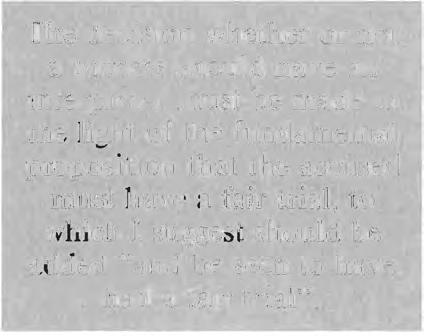
The decision whether or not a witness should have an interpreter must be made in the light of the fundamental proposition that the accused must have a fair trial ,6 to which I suggest should be added "and be seen to have had a fair trial" The position is even worse in civil cases. There is cl e arly no right to the use of an interpreter and courts have generally displayed a marked reluctance to allow them where it appears that the party or witness has some understanding of English. 7
It is often suggested that the interests of justice are better served by having a partially-fluent accused or witness cross-examined in English than by allowing him or her an opportunity to think about the answer before th e que stion has been interpreted. It is beyond the scope of this paper to deal with that argument , and it has been well answered elsewhere. 8
It has been asserted, however, that "there must be a stronger probability of injustice occurring when interpreters are not used than when they are used unnecessarily" and that is a view with which I respectfully agree. 9
Interpreters are often used by the police when interviewing suspects. It is sometimes not ap-
preciated by the interpreter that if the case is defended, he or she will have to be called as a witness for the prosecution. That is because what the interpreter has said to the interviewing officer in English would otherwise be hearsay. It becomes admissible only if the interpreter testifies that he or she understood both languages, interpreted properly both ways, added nothing and left out nothing. The High Court has held in Gaia v. R. (1960) 104 CLR 419 that once these conditions are satisfied the interviewing officer can give evidence of the accused's answers as interpreted into English because the interpreter has acted merely as a conduit or interpreting device.
The judgments in Gaia have often been criticised as demonstrating the classic misunderstanding of the process of interpretation. To my mind such criticism is ill-founded. The High Court was not attempting to analyse the process from a language point of view at all; the Court was concerned simply to explain in terms oflegal principle why such testimony did not offend the evidentiary rule against hearsay, as a matter of law.
The fact that a statement or record of interview is typed in English (which the accused does not understand) but is nonetheless signed or otherwise adopted by him/her, will not render it inadmissible. Indeed (subject to any other exclusionary rules), it will be admissible as a document if read over to the accused and adopted by him/her, through an interpreter. 10 This, of course, is only the principle of law as an admissibility, it does not go to the weight or reliability of such a document, which may well turn on the words actually used by the accused in his/her own language. Whatever the legal principle therefore, it is always best, where possible, to have the interview recorded in the accused's language, whether or not an English translation is provided.
Judges and magistrates presiding over criminal cases in which interpreters have been used by police should be aware of the possibility of incorrect interpretation having occurred during the interviews. It will no doubt be said that this is the duty of counsel for the accused, and so it is. But it is unfortunately too often true that neither the accused nor the court is well served by counsel in this regard. Many have no doubt also experienced cases in which a cross-examination on a supposedly inconsistent prior statement or record of interview is in fact based on nothing more than misinterpretation or lack of communication rather than anything sinister. It may often happen that the word used in an accused's own language has more than one possible meaning in English. This can be a very real
danger where an interpreter in a police interview, for example, has used an English word that reflects badly on the accused, whereas another English word (also appropriate semantically) may perhaps have quite a different meaning, which, indeed, may be the meaning intended by the accused.
Once again, where the court interpreter interprets the accused's meaning properly, the court is then likely to be confronted with a cross-examination directed to persuading it that the accused had changed his/her story between the police interview and giving evidence. This difficulty can generally be overcome only if the first interpreter has made a record of what was said in the suspect's own ./p-nguage, as well as tpe English language verSIOn.
Against this background, lightly sketched as it is, I turn now to other aspects of communication that may have an effect on a court's ultimate disposition of a case.
A judicial officer with a proper understanding of the importance of language and cultural differences will be able to evaluate the extent to which a witness's demeanour, language and behaviour are attributable to general characteristics of that person's ethnic group rather than to his or her individual personality.
Such factors can range from apparently coarse language (when the English-swearing version reflects no more than verbal emphasis common to the client's culture) to an impression of deceit or deviousness (when, for a example, the Vietnamese client persistently avoids looking the lawyer in the eye, that being a sign of respect in his own culture and so demonstrating no more than good manners), to complete misunderstanding when the same Vietnamese client answers "Yes" (that being, again a mark of politeness, usually meaning "Yes, I am listening to ... " or "have heard your question").
Reaction and attitudes to police and the courts can be markedly different. Reactions are often perceived by monolingual and monocultural Australians as characteristics of an individual, that is, in the person being difficult, unreasonable, aggressive and so on, when in reality they are no more than cultural characteristics common to the particular ethnic group and conditioned by different concepts and understanding. For example, in many European countries the police have an overtly political role and are given to arbitrary and brutal behaviour against which there is no legal safeguard. The courts in some countries are merely organs of political control and repression. People who have lived their lives under such systems will

have quite different reactions to police and the courts than will Australians from other cultural backgrounds. It is necessary for lawyers and judicial officers to understand these inflences.
Body language is a term that is currently very much in vogue. Those who think they have just discovered body language would no doubt be surprised to learn that lawyers have been aware of its importance for centuries. Lawyers' talk of the importance of a judge or tribunal being able to observe the demeanour of witnesses is, of course, simply another way of talking about body language.
Like verbal communication , body language (non-verbal communication) also differs from culture to culture
With Arabs emotions are controlled publicly by presenting a smiling face and using stereotyped utterances, but violent expression of emotion, i.e. screaming, is a sign of sincerity. Appearance is important to Arabs: they are sensitive to criticism.
Danes have a very small personal zone; Greeks feel ignored if they are not stared at in public; Italian youths and many Asian males hold hands; middle-Eastern voices are very loud but, to them, this means they are sincere.
For Vietnamese, in social as in family life, the suppression of hostility, aggression and other negative feelings is encouraged, and flexibility, harmony and readiness to compromise are highly valued. In the wish to please another person a Vietnamese may say "yes" without meaning it. The key to understanding lies in how committed or reluctant the person seems when the answer is given.
Smiling is a common social response, though sometimes hard to interpret since Vietnamese may smile with joy but also to hide confusion, ignorance, fear, anger, shyness, contrition, bitterness or disappointment.
Direct eye contact with "superiors" may sometimes be avoided as this could be considered challenging. A child who keeps his/her gaze fixed on the ground may be trying to show respect, not disrespect.
A lack of understanding of these factors is likely to cause a judge, jury or magistrate to draw incorrect conclusions about the veracity and credibility of a witness from his or her observed demeanour in court of the witness-box. Of course, injustice can occur both ways. These problems of interpretation or communication will not always work against the prosecution. A wrong acquittal in this sense is as much unjust as a wrong conviction.
In criminal cases, cultural considerations 38
(even apart from the problem of interpretation) can be vital. For example, what could not possibly amount to provocation of the reasonable white Anglo-Saxon Australian may well do so for someone from a European or other background. 12
Interpreters are a resource available to courts and tribunals to enable the latter to properly perform their judicial duty. As with any other resource, the court must have the ability to perceive when the need to use an interpreter arises. That will surely be when there is any real risk of a lack of full understanding by either the court or the witness. This risk is often greatest when the witness can speak some English. The tendency, inevitably, is to assume a greater degree of understanding than actually exists. Much will also depend on the circumstances, the nature of the occasion and the significance of the particular matter. In cases of doubt it is always wise to use a competent and accredited interpreter. The use of family members or people not trained as interpreters should be avoided. The use of a family member can significantly inhibit a witness from disclosing to the court information that the witness may not want the family member to know.
Untrained interpreters, far from facilitating communication, can cause even greater problems. Their language skills may be deficient, they will often not have the necessary appreciation of relevant cross-cultural differences, they do not have interpreting skills (as opposed to merely a language ability), their choice of words is imprecise and can be misleading and they generally have a tendency to flavour the interpretation with their own views or perceptions of the facts.
The major hazard from the court's point of view is that where one or more of these factors is present and the interpretation is inadequate or simply wrong, the court will not be aware of that.
There are other, less subtle , problems with using unqualified interpreters .
The proper use of interpreters requires specific skills and expertise. There is a list of excellent suggestions for users of interpreters appended to a most useful article by Crouch 13 and I would strongly recommend that anyone frequently working with non-English-speaking people obtain a copy.
When speaking, the first person must always be used; this is particularly important in court. Thus questions must be addressed directly to the witness, not to the inte r preter. The proper form is "What did you do next? " and never (to the
interpreter): "Ask him what he did next". The latter is a short road to confusion. The court must be receptive to comment from the interpreters on any difficulties being experienced. It is necessary to use short sentences so the interpreter is able to interpret them in a sensible way. Difficult terms, or legal jargon, may have to be explained either to the interpreter or the witness, or both. The interpreter should never be asked to comment on a witness's veracity or to express any personal opinion on the merits of the matter (which , of course , is not something likely to occur in court anyway); although he or she should be asked to indicate and explain any relevant language or cultural aspects that arise.
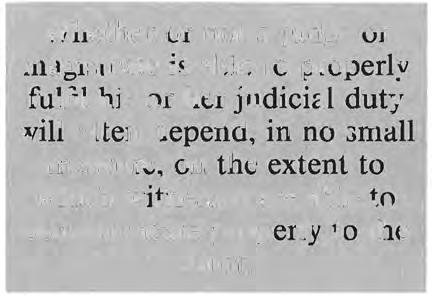
I hope this necessarily brief examination of the process of interpretation has been helpful in drawing attention to the importance of cultural and language awareness when dealing in a forensic context with people whose first language is not English.
We know that interpretation is not a simple robotic exercise, but a complex and demanding task requiring far more than just a language ability. In addition, it requires skill, a knowledge and understanding of both cultures and an ability to deal effectively with all manner of people.
Whether or not a judge or magistrate is able to properly fulfil his or her judicial duty will often depend, in no small measure, on the extent to which witnesses are able to communicate properly to the court. A judicial officer who has a genuine appreciation of the language and cultural considerations that arise in a particular case will be at pains to ensure that anything that will improve that communication and so provide the court with a proper basis for fact-finding and assessing credibility and the value of the evidence generally is encouraged, and that anything tending to impair or stand in the way of effective communication is avoided.
I Eagleson R InJormed Co n se nt: A Lingui s ti c Perspective. Medicine , Science and the Law Symposia , 1986, Law Reform Commission of Victoria.
2 Interpret ers: Some Basic Pr oblems, Dixon, Hogan and Wierzbicka , (1980) Legal S ervi ce Bulletin , p.162.
J Ibid. , at p I 63.
Paper Int erpr et er Useage in the L eg al Sys tem delivered to a NSW ' Law Week ' Seminar o n 3 May 1984.
5 See also R v Lee Kun (1916) I KB 337, where an appeal by a non-English-speaking Chinese against conviction for murder w a s dismissed on the ground there was no substantial miscarriage of justice when the evidence given on his trial was not interpreted to him , because that had been the same a s the evidence given on the commital- which had been interpret ed.
6 Johnson (1 986) 25 A. Crim R. 433 (CCA , Qld).
7 See Harv ey v. Fuld (1986) 2 All 55; Filios v Moreland (1963) SR (NSW) 331 and Dairy Farmers Co-op v. Aquilina (1963) 109 CLR 458.
8 Australian Go vernment Commi ssion of Inquiry into Poverty. Mi g rants and the L eg al Syst e m , Ch.5 , Courts esp. at p.36 ; and Int erpreters in th e L egal System by E G Cunliffe, supra.
• Migrant s and the Legal Sy s te m, supra, at p.36
10 R. v. Lamb e (l791) 2 Leach 552; 168 ER 379; Curtis v The Queen (Unreported) Tas. CCA , S.No. 1211972 List 'A', R v. Zema & J eanes (1970) VR 566; Fande Balo v. Th e Queen (1975) PNGLR 378.
II The use (or non-use) of interpreters in police interviews with non-English-speaking suspects may be a ground for subsequent judicial exclusion of any confessional material so obtain ed See e.g. R v A nunga (1976) II ALR 412; Gudabai v R. 52 ALR 133 and Interrogation oj Australian Aborigin es by Frank Bates, 8 Crim L.J. 373
1 2 R v Din ce r (1983) VR 460 The striking difference in possible outcome s under a crimin a l code similar to those in Queensl a nd and Western Austral ia but applying a different cultural yardstick can be observed in Papua New Guinea.
In Regina v _ Yanda-Piaua & Ors 1967-68 PNGLR 482, having held that in determining whether provocation exists so as to reduce wilful murd e r to manslaughter, Mann CJ concluded that a blow in the face with a fist was sufficient to con stitute provocation reducing murder to manslaughter e ve n where the retaliation consisted of an attack with an ax e committed with such violence as to evidence a plain intention to kill. His Honour based this conclusion on a finding th at the ordinary peaceful citizen living in the cultural e nvironment of the accused could be expected, almost to the point of certainty , to react in such a manner.
In Regina v Noboi-Bosai & Ors (1971-72) PNGLR 271 Prentice J . held that the seven accused who had eaten the body of a rec e ntly-killed native from another village were not guilty of improperly or indecently interfering with a dead body because cannibalism was an accepted practice in the area and that "in assessing propriety and decency of behaviour in relation to corpses in the Gabusi area , (the court) should endeavour to apply the standards of the reasonabl y primitive Gabusi villager of Dadalibi and Yulabi in early 1971" (p.284)
13 Crouch , A. , Interpreters. Translators and Servic es : Towards a Belter Understanding CHOMI Reprints No. 398, Clearing House on Migration Issues, 133 Church St., Richmond, Vic. 3121 , and see generally, Th e Current Situation in Legal Interpr eting in Australia , a paper for the Interpreting and the Law Conference , Sydney, July 1988, presented by the Victorian Ethnic Affairs Commission; and Migrants and the Australian Legal Sy s tem by J.A. Kiosoglous, SM, a paper prepared by the Austra lian Institute of Multicultural Affairs.
[Published by kind permission of NSW Bar News]

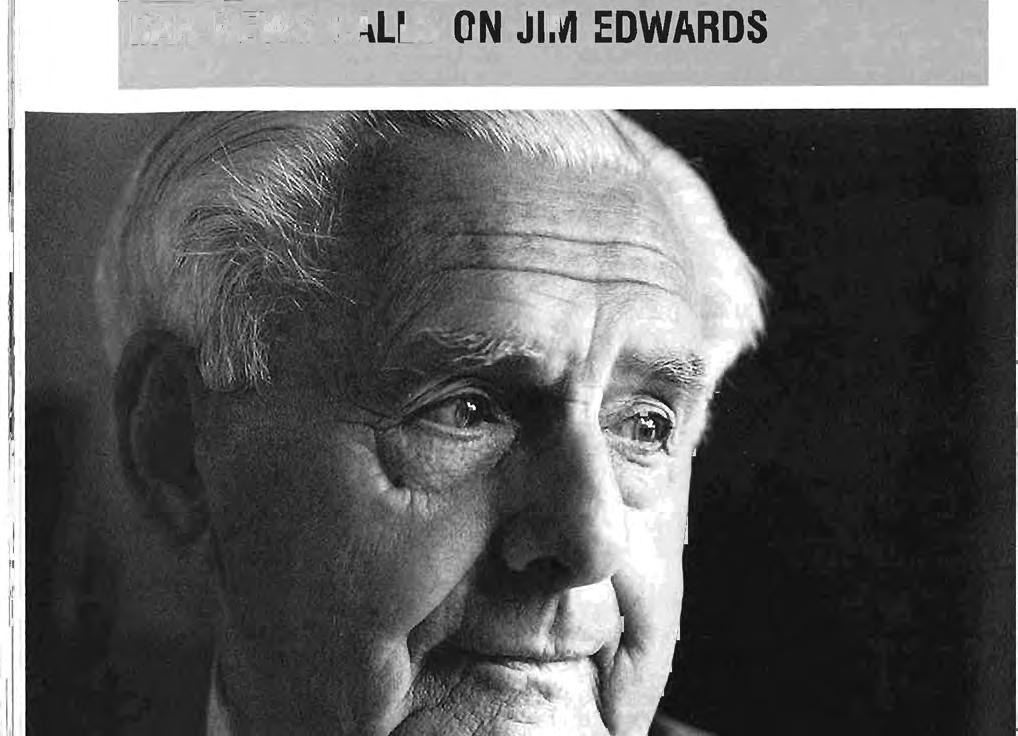

Judge's Associat e, Jim Edwards
AT THE AGE OF 82 , MR. JIM EDWARDS has retired after 43 years as a Supreme Court judge's associate. He knew all the figures of recent legend - Ashkanasy, Rob Monahan, Grattan Gunson, Moodie Heddle, Lionel Revelman, "Donny" Campbell, to name a few - and in all this time he served only two judges, Barry and Crockett JJ. , each of whom he regards as outstanding.
He spent his working life watching the Victorian Bar and jUdiciary at work, and fondly recalls occasions both of high wit and low farce . He sat with Barry J. in the divorce jurisdiction 40
for eleven years and well remembers that judge's flights of wit and censure.
Sir John Barry was a precisionist in matters of language. He spoke with studied exactness and expected the same of counsel appearing before him. Cliches and solecisms of grammar were to him a form of pestilence to be resisted by means of judicial protest. In one particular respect he was before his time, for he developed a strong distaste for the terms "lady" and "gentlemen", and once rebuked counsel with the remark that in his court it appeared no-one ever committed adultery with a man or woman - it was always
with a "gentleman" or "lady"
In many ways Jim Edwards' story is inseparable from that of Sir John Barry. Barry had a great influence over him and the two men worked closely together during an associateship of more than 22 years. Barry died in 1969 and the Executive Council appointed Mr. W.e. Crockett Q.C. to take his place. Jim Edwards then became associate to Mr. Justice Crockett and remained so until 16th February this year.
He was born in 1907 and after his father died when he was six years old, he was brought up by his mother in various hotels which she ran. He went to Xavier College where he observed the Two Commandments of that school and played football and cricket. After leaving school he continued to play district cricket and football for Kew. He began studying for a law degree and eventually found his way into the Army pay corps. In 1983 he was awarded an O.A.M. for services to the legal profession.
His recollection is a rich fund of legal anecdote, and a good deal of this revolves around Barry's abhorrence of humbug and artificiality in the courtroom, and his obsessive love of words. Dyslogistic, logodaedalic and logomachy are three words Jim Edwards recalls from Barry's repertoire, the last being pretty apposite to proceedings in his court. He recalls Barry telling him once that he had a giant urticaria which had the effect, inter alia, of causing his lower eye-lids to be grossly everted. When he was going to hospital for treatment of the ailment that in time proved fatal, he said: "I am to have a malignancy excised from my ascending colon".
Barry acquired a habit of constantly correcting counsel for grammatical offences, one of the most irksome of which was the phrase "on the grounds of adultery". One day he said to counsel: "Look here, Mr. X, adultery, though a bilateral activity, is singular." And then after brief reflection, he added: " ... that is, grammatically at any rate".
Barry was particularly impatient with private detectives called to prove the fact of adultery. He would frequently interrupt their meandering evidence with, "Come on, Mr. H., Get us into the bedroom." Where the uncontroverted circumstantial facts of a case were probative of adultery but the petition still defended, Barry J. would cross-examine a party along these lines:
Barry J.: "Mr. X, do you admit that you and Mrs. Y were found lying on a rug under a tree in Studley Park about 11.00 o'clock on the night in question?"
Mr. X: "Yes, Your Honour."
Barry J.: "Yet you still deny adultery, is that so?"
Mr. X.: "Yes, Your Honour."
Barry J.: "And you admit being there from about 9.45 pm until you were detected about 11.00 pm?"
Mr. X: "Yes, Your Honour."
Barry J.: "Well, Mr. X. What do you think the average man of the world would think that two people of the opposite sex to one another, one a married man and the other a woman not his wife, would be up to in those circumstances?"
Mr. X: "Oh, I suppose he would think they'd been committing adultery."
Barry J.: "So would I."
Barry J. was not a prolific note-taker on the bench. He relied heavily on his memory and made frequent use of the official transcript. Each day Jim Edwards would collect his notebook in order to index it. One day he noticed in the margin of these sparse notes a sketch of a witness in the case, along with the notation: "This man's a bloody liar."
Barry J., like most judges it may be said, enjoyed the discomfiture of counsel at the hands of a witness. Jim Edwards recalls "Donny" Campbell's cross-examination of a doctor who described a plaintiff's pain as similar to that produced by having a red-hot poker applied to the sole of the foot:
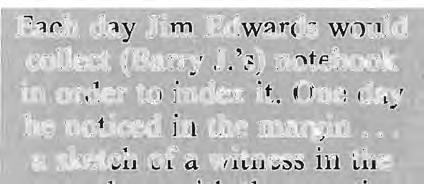

Campbell: "Come now, Doctor, that's a bit of an exaggeration isn't it?"
Doctor: "No, Mr. Campbell, it is not."
Campbell: "Now, doctor, you've never had a red-hot poker applied to the sole of your foot, have you?"
Doctor: "Well, Mr. Campbell, as a matter of fact I have. I was a prisoner of the Japanese during the last war."
Jim Edwards was also associate for just over 20 years to Mr. Justice Crockett, of whom Jim says "The older I grew, the more considerate he became". He said he would like to acknowledge his debt to the late Ernest Lawn, whom he regarded as the doyen of judges' associates.
Barry J. once referred to Jim Edwards as the "ringmaster" of the court. He has now retired to spend more time with his 6 children and 17 grandchildren; their gain is the Bar's loss after a grand innings of 43 years. T' W lk 1m a er


A close look at the introduction of contingency fees in Australia, by
Mr. Justice
lawyer should be able to take a slice of his client's cake (usually a third) for helping to bake it. The slice is called a contingency fee. This has recently been floated as an attractive idea by certain solicitors in Australia. A friendly reception has been extended to the idea in certain solicitors' magazines (e.g. Proctor (April 1990». However, a wider view is necessary.
The contingency fee system is the American method of financing litigation, and it still applies in some American States to non-litigious business (such as administration of estates). Generally speaking profit-sharing arrangements with clients are more tolerantly viewed in the U.S. than they are in Australia. The current debate concerns litigation. The idea is to legalise arrangements for lawyers to share the proceeds if the client wins and to make no charge if the client loses. Commonly the agreement is for one third. It may be more, it may be less.
Such a system gives the lawyer a direct financial interest in his client's case. It gives the strongest possible incentive to win. Whilst that sounds desirable, the in-built problem is human weakness. The temptation to win at any cost is too often irresistible. When the inducement to bend the truth, suppress embarrassing documents, mislead the opponent, assist the adverse witness to disappear, or hoodwink the court becomes too strong, the system disintegrates. It is at present held together by a very frail ethical fabric.
Consider a lawyer retained with a 30 per cent interest in a $1,000,000 claim. He stands to gain $300,000 if his client wins against the carrying of his own costs ifhe loses. It is difficult to envisage all such attorneys insisting upon the strict observance of their duty to the court in relation to adjournments, citation of authority, discovery of documents, or indeed at all. Once the honest practitioner sees his opponent bending the rules, little incentive remains to disadvantage his client and himself by obeying them. Thus the system breaks down.
One of the good things about litigation in Australia is the trust that exists between the court and the practising profession. One can come into
court with relative confidence that the solicitors have not suborned witnesses, encouraged production of spurious documents, or, in a word, played dirty tricks. Even under our present system one sometimes discerns a certain amount of coaching of witnesses but this is of controllable proportions, and generally speaking the ethical rules are respected. It could not remain so under the financial pressures and incentives of the contingency system.
I notice with interest the attempt in the Proctor article to demolish in advance any unfavourable comparisons that might be drawn with the "litigation syndrome" which has plainly overtaken United States society. It is true, as the article notes, that in many U.S. jurisdictions damages are not reduced for contributory negligence, future economic loss is calculated without discount, and there is a propensity to award punitive damages. While this may help explain some of the strange decisions and enormous awards given in that country, it hardly explains the U.S. disease of suing anyone for anything, or the flood of litigation in that country. This is not explained ei ther by the fact that in the U. S. there is less social security and compulsory third party cover than we have here. The truth is that at the heart of the litigious society that has developed in the United States lies the contingency fee system.
People will sue others for practically anything, with no holds barred. There are now about three quarters of a million practising lawyers in the States, and about 30,000 graduate lawyers joining their ranks each year. Why not? The spoils make it a growth profession, even if it is a nonproductive industry. Most of them make a very good living. It is the world's most litigious society. j
Let me describe the stage it has reached by mentioning a few recent examples. Some of them are a little hard to believe.
A New York man, tired of living, decided to end it all by leaping into the path of a subway train. The train driver was exceptionally alert and managed to stop without killing the gentleman, although it was impossible to avoid hitting
and injuring him. The attempted suicide then sued the railway company. What do you think happened? A British journalist 2 upon hearing of this law suit assumed it must be based on some fancy cause of action such as frustration of the plaintiff's democratic right to make away with himself. He was quite surprised to discover that the claim was actually for damages for personal injury, and even more astounded to hear that the plaintiff won the case and was awarded $600,000.
Another man gave a party on his birthday in the course of which he became drunk. He climbed into the swimming pool enclosure of the block of flats where he lived declaring that he could walk under water from one end of the pool to the other. Neither his wife nor any of the 15 guests tried to stop him from carrying out this ambitious plan. They watched him enter the water. He did not complete the course. In fact he drowned. The grieving widow thereby lost the benefit of his support. She sued the owners of the flats. Did she win? Of course she did.
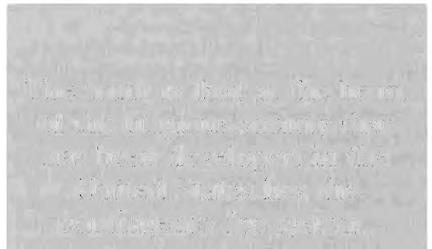

A New York gentleman (Mr. Febesh) was stung by a wasp when sitting outdoors at his country club. He suffered a serious reaction from anaphylactic shock, sued the club for negligently allowing unaccompanied wasps into the grounds, and collected $l. 5 million in dall1ages.
An American gymnast injured himself whilst practising on his exercise mat. He sued the manufacturers of the mat and collected $14 million. What would most solicitors be prepared to do to ensure that the contingency fee in that case was won?
Party givers kind enough to supply their guests with alcohol have been sued by the same guests who chose to drive home and who collided with another vehicle on the way. The party hosts have been sued not only by the guest but by the other driver. Private hosts are not the only ones at risk. The owners of a cafe in Michigan had to pay $1
million because one of their patrons drove away and injured himself.
A man has been ordered to pay damages to the lady who purchased his house. He had failed to disclose to her that 12 years previously someone had been murdered in the house. 3
A message starts to emerge as the cases unfold. A passenger on an aeroplane took a rise out of his fellow passengers by declaring that the aircraft was going to crash. One of the passengers thereby suffered severe emotional distress. She successfully sued the airline for damages and obtained an award more than sufficient to settle any jagged nerves.
The terrible risks now taken by doctors, or anyone who is foolish enough to try to render aid to injured persons in public, are well-known and the prospect of their being sued by patients if anything happens to go wrong is equally unsettling. The enormous insurance premiums to cover such claims are prohibitive. Some doctors now have notices in their surgery stating "I have no insurance". If sued they simply go bankrupt. Such posters are merely a symptom of the voracity of the American legal system. 4 Some public reaction is now starting to simmer.
Why would anyone want such a system in Australia? To some the potential financial reward (the "hip pocket argument") presents the obvious attraction. But some are promoting the idea professing the highest ideals. It is of course a common ploy to promote self-interest under an idealistic label. All you have to do is find a problem in the present system and offer a new scheme to solve the terrible problems of the old. In the haste to eliminate the old problem, the greater problems inherent in the so-called "reform" are readily overlooked. They are never so visible as the present ones that we wish to remove.
The advocates of the contingency fee system disclaim profit as their motive. They only want to remedy the problem of the high price of litigation, by making it accessible to all. They say that their case is purely altruistic and that the contingency fee system will enable little people to take on the giants or, for that matter, anybody. They aver that the risk of failing to win will discourage solicitors from taking on flimsy cases. No doubt they also have in mind that even if the case is not very good, there is a reasonable chance that a defendant will settle out of court just to get the lawyer off its back. Such settlements in, say, only 20 per cent of flimsy claims can make the overall exercise quite worthwhile for the lawyer, especially when it is recognised that neither the client nor the lawyer is under any jeopardy of having to pay the other party's costs.
It is sometimes overlooked that the traditional

English system of "losing party pays" is the best known disincentive to flimsy litigation. When the risk is properly explained by the solicitor any party must think twice before taking a case to court. The jeopardy in relation to the other side's costs is commonly the catalyst that produces settlements. Without the strong disincentives provided by the present "losing party pays" system the volume of litigation would be quite unmanageable. Courts could not cope with it. Human beings will always be willing to air their grievances in a public forum such as a court, especially if they have little to lose by doing so.
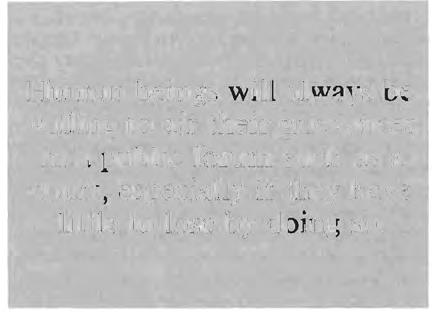
In the United States this lesson has been learned too late. It has recently been observed that "contingent fees have fostered an atmosphere of a no-cost lottery for clients."5
Under our system there is a general prohibition upon arrangements which give the lawyer a pecuniary interest in the result of his client's litigation. With a few well-recognised exceptions, it is simply unlawful. The law would have to be changed by Parliament before a contingency system could be adopted. It is to be hoped that the government would not give its approval to a measure that would be against the best interests of the administration of justice and, in the end, of the community.
The origin of the common law rule, like so many of our rules, is in the need to avoid conflict between interest and duty. A good solicitor needs to advise his client with a clear eye and unbiased judgment. He is an officer of the court who is bound to present the case with fairness and integrity. A legal advisor who acquires a personal financial interest in the outcome of the litigation may find himself in a situation in which that interest conflicts with those obligations. The last three sentences are not my own. They are a paraphrase of words written by Buckley L.J. in 1975. 6
There is of course a well-recognised exception in relation to speculative actions which solicitors
44
commonly undertake for clients. If the solicitor does not promote the litigation himself, and is satisfied that his client has a good cause of action, he may agree not to charge in the event of losing, and to charge a proper fee in the event of winning. The term "proper fee" is perhaps in danger of erosion or, more accurately, accretion. There is a case for saying that if a solicitor takes the risk of receiving nothing at all, he ought to be compensated by receiving something more than the normal fee in the event of success. That is another way of saying that because the whole practice is a bit of a gamble, it is fair to provide some odds for the winning cases; otherwise, the practice of taking speculative actions might be unprofitable on the whole and fail from want of sufficient incentive. It is difficult to evaluate the argument because questions of degree are involved each time a solicitor decides whether to take on a "spec". However, it is an argument that deserves fair consideration. If there is to be any provision for an increment above the normal proper fee in such cases, it would need to be very carefully specified and closely supervised. It should not be the toe in the doorway that leads to the room where the spoils are shared.
We should be careful in following practices that come from the American legal system. In the U.S. litigation is a commodity, and presumably the more one can promote and sell it the better. I am by no means sure that the encouragement of litigation and the promotion of a litigious society is in the best interest of Australians.
Ifwe are stimulated by the vision of creation of disputes where none formerly existed, ambulance chasing, sharing of the spoils, the promotion of litigation as an industry, witness tampering and the other unethical practices that have inevitably crept into the over-competitive American system, by all means let us follow their example. If we are interested in preserving our more modest system which depends heavily on trust between bench and legal practitioner as well as between solicitor and client, then we should be very careful before relaxing our traditional suspicion of contingency fees. The rules are not relics of a bygone age. They are fundamental to the preservation of a trusted profession.
J Figures cited by George Gordon - New York correspondent. Courier Mail, 13th June 1988 .
2 Bernard Levin - The Times, 16th May 1988.
1 Some of the above examples are referred to in U.S News and World Report, "The National Lottery" 27th January 1986, "Why Lawyers are in the Doghouse" 11 th May 1981, and "The Urge to Sue: Getting out of Hand?" 5th July 1976; and in Mr Levin's article (above).
4 Michael Becket, U.S. correspondent , Courier Mail, 22nd June 1988.
5 U.S.N. & W. Report 27th January 1986.
6 Wallersleiner v. Moir[1974] 1 W L.R. 991; [1974]3 All E.R. 217.

IN THE LAST ISSUE OF THE BAR NEWS, the outgoing Chairman, Bill Gillard Q.c., criticised my article on the costs of litigation which was published in the Business Age on 2 March 1990.
To the extent that Mr Gillard saw fit to question and argue against my views, I am quite delighted. To the extent that he made a personal attack on me, I am deeply disappointed. Courteous criticism is to be welcomed. Condescension and arrogance are unhelpful.
The tone ofMr. Gillard's "Message" surprised me. Its statements and insinuations are insulting. I am "to be condemned" for attempting to put the Bar in a poor light. My actions are "deplorable" because I in some way used "the cloak of confidentiality" in order to silence potential critics and to get exclusive coverage for my own views. And I also wrote "arrant nonsense" about the incoherence of the common law. I will deal with these allegations in turn.
First, my article was in no sense an attempt to put the Bar in a poor light. It was, I like to think, a responsible and balanced piece, putting the Commission's reference in perspective. It contained a number of accurate statements about the Bar and the rules which govern it. If those rules put the Bar in a poor light, that is not my fault. They, not I, should be the subject of attack.
I certainly said that a few barristers charge as much as $5,000 a day. Mr Gillard calls that a "totally wrong and mischievous" statement, Why? Because only Queen's Counsel could do so! How many people would distinguish in that way between Queen's Counsel and barristers? As for the suggestion that the statement was "aimed at implanting an idea in the reader's mind, antagonistic to the interests of the Bar," I had no such dark purpose.
Unlike some people to whom I have spoken on the subject, I have no objection at all to barristers earning whatever the market will pay. My only concern is to ensure that the market for barristers' services, and for the services of lawyers in general, is as free and competitive as it can be. Whether the present market satisfies those conditions must be doubtful. Many of the restric-
tions that apply to Victorian barristers have been abandoned in the United Kingdom - and precisely because of a recognition of their anticompetitive nature.
The second, and potentially more damaging, criticism of me is that I misused my office by imposing confidentiality on the Commission's consultants. I am apparently alleged to have done so in order to silence the Bar Council and to reveal, without fear of criticism, the contents of a discussion paper that the Commission was shortly to publish. The errors in the allegation are so many that it is hard to know where to start.
Let me explain how the question of confidentiality arose. The Commission has had two meetings with its consultants on this reference. The first was to discuss a "draft discussion paper". The second was to discuss a substantially revised version, called a "draft issues paper". Each was prepared by Commission staff under the general supervision of my Deputy, Ms Jude Wallace, who is the Commissioner in charge.
At the end of the second meeting, I asked consultants to observe strict confidentiality. I explained that the draft that had been considered at that meeting would be examined by the Commission itself the following day. It would consider the paper in the light of its consultants' criticisms. If the draft were to be made public, people might think that it represented the views of the Commission, when the Commission had not only not approved it, but had yet to formulate any view on the s'uggestions it contained. I also explained that drafts rarely, if ever, emerge unscathed from meetings of the Commission. Some of them are barely recognisable.
At its meeting, the Commission decided that the draft issues paper should be altered and substantially rewritten. Its format, structure and content were to be different. When I published my article, the new draft was not in existence. Sections of it were being written and revised. The views expressed in my article were not taken from those incomplete sections, nor from the earlier discussion drafts. They came from my knowledge of the courts and the legal profession gathered in three States over 30 years of exper-



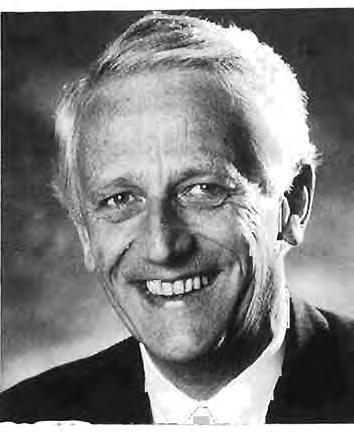
Ross MITCHELL ER.E.I.
He has had over twenty years experience in Real Estate. He is offering that experience, his and in a unique service that works only for you - his client . There are no competing interests!
Essentially he can
.:. Establish basic Real Estate investment needs and recommend options.
.:. Provide written feasibility reports on suggested strategies.
.:. Locate and inspect properties then negotiate and arrange purchase at the best possible price for you.
.:. Work as a co-ordinator on developments, organising for estimates to be given and hiring contractors on behalf of clients.
.:. Manage the investment either personally or by placing it with an appropriate agent.
.:. Provide regular property reports and recommendations.
Take the uncertainty out of Real Estate advice and recommendation!
Have someone act exclusively for you!
CONTACT Ross MITCHELL Now AT
ience of the law. Those views were not the Commission's; they were my own. Some of them eventually found their way into the published issues paper.
The allegation that I imposed confidentiality to silence potential critics is therefore quite wrong. I did it simply in order to avoid misunderstandings. But the allegation is not just wrong; it is also incoherent. The confidentiality that I required was in relation to the draft discussed at the meeting with consultants, not to the issues themselves, let alone to the particular matters I discussed in my article in the Age. Any member of the Bar Council could have responded immediately to that article and debated the issue with me. None did so. The "cloak of confidentiality" is simply a red herring.
Thirdly, my comments on the incoherence of the common law cannot be properly regarded as "arrant nonsense". I don't for a moment deny that the common law has contributed a great deal to the science of jurisprudence. I don't for a moment deny that the courts develop it from time to time. I don't for a moment suggest that legislation is always - or even often - better. Indeed, I am Australia's most vociferous critic of legislation - ask Parliamentary Counsel!
What I was suggesting in my article - in strictly limited space - was that the time has come to consider whether the legal system would operate more efficiently if the many anomalies and overlaps that exist in the common law, and between common law and equity, could be systematically resolved - much in the way the great Chalmers did in a number of fields at the turn of the century.
That proposition is neither revolutionary nor nonsensical. Nor is my statement that the common law (including equity) is appallingly difficult to find. The common law system is the antithesis of efficiency. It is for that reason that codification may have to be considered as an alternative. It may be worth noting that the Attorney-General has already given the Commission a reference on codification of the law of contract.
In conclusion, could I emphasise my desire, and that of my colleagues, to co-operate with the Bar at all times. The Commission benefits enormously from the advice of barristers. It deals courteously with all of them. It hopes for and, on all occasions but this, has received reciprocal treatment. Despite Mr. Gillard's assertions, the Commission remains open-minded on the questions raised in its Issues Paper. It will welcome comments on them from the Bar.
TELEPHONE: 820 2544 OR MOBILE: 018312628
David St L Kelly Chairman Law Reform Commission

Gentlemen ,
I WAS DISAPPOINTED TO READ AN article published in the December edition of the Victorian Bar News which disparages this Commission and the legal aid system in Victoria under the guise of a competition for the most outrageous legal aid story. accept and. act upon criticism if we deserve It but there IS . a world of difference between factually-based cnticism given constructively to effect improvement and the sort of generalised and exaggerated complaints characteristic 0f the article . It was not worthy of an organisation whose members pride themselves on their It was also surprising coming from an orgamsation which participated in discussions leading to and supported, the establishment of the legal aid system as we know it today - including the 80% rule . Unfortunately , the article will have served to reinforce the misconceptions and prejudices that some members of the Bar already have about the Commission. It did nothing to strengthen the relationship between the Commission and Bar which is essential for the effective delivery of legal aid services.
I will not attempt in this letter to respond to the complaints in the article individually. Like most generalisations there is an element of truth underlying at least some of them. We have noted the areas where problems may exist and will try to ensure that cause for justifiable complaint is not given in the future. In return I would ask that before publishing anti-legal aid articles in future you reflect on the damaging effects those articles may have.
While many Commission staff have sound working relationships individually with members of the Bar, the general relationship is often marred by misinformation, misunderstanding and mistrust. There are always likely to be differences of view between the Commission and
the Bar on particular subjects (and it is healthy that different viewpoints should exist and be debated) but there is no reason for such differences to prevent us from having a sound working relationship. I have been in contact with the Chairman of the Bar Council with a view to seeking ways in which we can improve the ship. One proposal is that we should establIsh a small liaison committee comprising members of the Bar and staff of the Commission which would be a forum for exchange of information and discussion of complaints at a general policy level. Between meetings the members of the committee could act as contacts in order to facilitate the resolution of individual complaints by members of the Bar.
Ifmembers of the Bar have any suggestions for improving the relationship the resolution of any disputes whIch may anse , I encourage them to contact me.
Yours faithfully,
Andrew Crockett Director of Legal Aid
Makers of a full range of legal and academic regalia Open 9-5 wee kd ays; 9-12 Saturdays I 1I.a:.'i
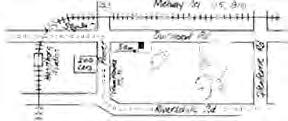

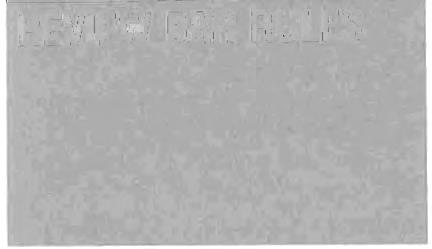
The Editors
Victorian Bar News
Gentlemen,
THE THATCHER GOVERNMENT'S REforms to the legal profession which are currently being debated in the U K. Parliament have brought about the most radical change to the practices of the English Ba r. The effect of those changes is to make the Victorian Bar one of the most conservative independent Bars in the world
As a result of the Thatcher Government's determination to force re form upon the legal profession, the English Bar, of its own volition, has abolished the following restrictive practices: o the ban on advertising of fees; o restrictions on where one can practise; o the compulsory clerking system.
In addition, the Government's own reforms, contained in the Courts and Legal Services Bill 1989, allow the Bar to make regulations so that clients may have direct access to barristers and for the widening of advocacy rights in the higher courts.
It is time that the Victorian Bar embarked on an extensive review of its own rules Rules such as those which relate to ownership of chambers , the location of chambers , the advertising of fees and the compulsory clerking system need close examination. At present , these rules are nothing more than unnecessary fetters on the individual's right to practise .
There are a number of inquiries which are, or will be, closely examining the practices of the legal profession in general. In particular, I refer to the current Senate inquiry into the cost of justice and the proposed Trade Practices Commission inquiry into the professions.
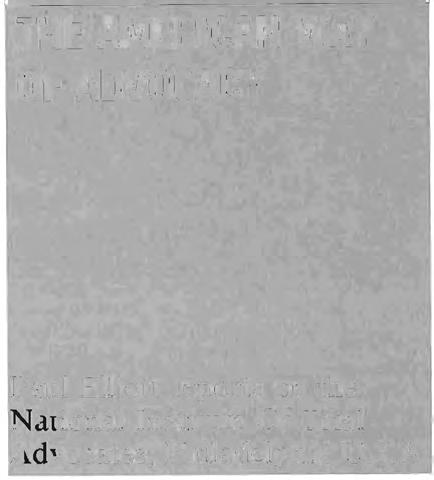
"RUNNING A GOOD TRIAL IS LIKE having an orgasm" . So said the robust black female instructress . I was in Philadelphia . This was not the Full Court of the Supreme Court of Victoria This was the National Inst itute of Trial Advocates - America - the U.S. of A. But it did make me think. Either I had never run a good trial or if I had then I had never . ..
The National Institute of Trial Advocates is America-wide. It is extremely well organised. It runs conferences for trial advocates (their sort of equivalent to barristers) at all levels . The courses vary from two weeks to a few days and are very intensive. There are many video sessions on "directs and crosses," which translates into evidence in chief and cross-examination. Full mock trials are organised. Everyone must put in, both as advocates and witnesses. I was sent a mass of material to consume before I attended the Eastern Region Conference held at Temple University , Philadelphia in March of this year. I was to "audit" the conference in that I was to observe their advocacy methods along with the teaching methods , although, inevitably , I did take part as a witness and , when asked, did a bit of Australian cross-examination.
Yours sincerely,
Greg Barns
It is high time the Victorian Bar deregulated in the manner of its English counterparts, otherwise it may find that governments will force change upon it -a development that the Bar would find singularly unpalatable. 48
The most stimulating part of the course was the opportunity to actually talk and think about the techniques of advocacy with a large group of practitioners. Often barristers are so busy running cases that we don't sit down and analyse how we have presented the case, how we have cross-examined, or how we have addressed. Getting the case organised, mastering the facts and the law is often the major concern.
rIt was dogmatically asserted by Professor Tony Bonnici, the leader of the course, that you must never, ever ask a non-leading question in cross-examination. The actual question is very important. You should know the answer. Just think about this. Did you do that in your last cross-examination? Did your opponent? Is this a really correct view of cross-examination?
We tend to write off American law as L.A. Law. American advocates are a bunch of braces - snapping prima donnas, strutting around the court room, staring eyeball to eyeball into the faces of cringing witnesses. They are fat men from Hawaii, good 01' Southern boys who appear as thick as a slice of mom's apple pie but really are as sharp as tacks. They are beautifully coiffured women, with marvellously cut suits, and Guccibriefcases, who have had to work extra extra hard to beat the men, but underneath have a heart of gold and an insatiable sexual appetite. They are Robert Redford and Paul Newman. Boozy Irishmen from Boston on their last legs, or slick L.A. lawyers with extremely complicated partnerships and personal lives. Every one of them spends most of their days approaching the bench.
This, in general, is not true. In some of the counties in Pennsylvania the lawyers do not even stand to cross-examine, let alone pace up and down in front of the jury. The recording microphone is set on the bar table which anchors the advocate to his chair.
Observing the participants did not reveal any histrionics or hyperbole. It was very professional. It was very well organised.
Of course there are great differences. The manner in which they object to evidence is an artform which I never understood. The principles of evidence were similar but the manner of stating an objection usually took a recognised form, which the judge either upheld, over-ruled and then noted for the "record" in the event of an appeal. Also there was a great deal of striking from the record.
Much more latitude is given in allowing in the background or personal evidence of parties. Whether the person was married, had children, was a good family man, went to college, worked hard - (the puritan work ethic being very important), was a WASP etc. was stressed to be of importance in presenting evidence in chief (direct evidence). We were told that an advocate had to paint a picture of his client. Sympathy and prejudice were important.
A lot of commercial cases are tried by juries in various state jurisdictions. As part of the course we had to prepare a very large contractual dispute over computers. Much evidence was introduced and cross-examination proceeded as to
the character of the parties. The plaintiff was painted as a large heartless multinational computer company manned by ruthless and ambitious executives who delegated important decisions to secretaries. The defendant (with a counterclaim) was depicted as a small friendly company started by an all-round nice guy genius, whose only mistake was to employ a failed close friend who "goofed" on this particular deal. The plaintiff's advocates made them out to be incompetent criminals. I had prepared the case on the basis of it containing very fine points on the existence of a contract (Americans seem to have a different view as to the doctrine of consideration) with elements of waiver and estoppel. No, said our instructor. Don't bother with all that law. A jury never understands any of that. Just paint a picture of the good guy and the bad guy because that's how the jury will decide the case. Therefore the small company would win so long as it did not pursue its greedy counterclaim for loss of profits. Introducing juries, on this basis, would certainly enliven the Supreme Court Commercial List.
Meeting lawyers from all parts of America was another great advantage of the course. Personal injuries cases were held in high regard, even above commercial cases. But then again their system of personal injuries is very different. Over dinner some hard-nosed New York lawyers asked me to assess a recent decision in their fair city. A black civil rights worker had been wrongly arrested by the police. He had been beaten up, suffering broken ribs, bruising, a black eye, the usual assault-type injuries, but nothing permanent. "How much?" they said. I submitted that in Melbourne there would be an initial problem in succeeding against the police at all - but I assessed the claim at $7,500. They laughed. The jury awarded $76,000,000 (U.S.)$40,000,000 being for punitive damages and general damages amounting to a mere bagatelle of $36,000,000. Of this award the plaintiff's lawyer was to receive 50 per cent plus disbursements. Bring on contingency fees!!! On the downside a surgeon's professional indemnity insurance runs at about $180,000 (U.S.) and a lawyer's $90-$100,000 per year. Surgeons are refusing to perform operations, especially gynaecologists.
Americans are extremely friendly - especially in their home country. Australians pride themselves on friendliness. But in relation to tourists and visitors this is somewhat of a myth. It was a great experience to meet Southerners from South Carolina, hard-nosed New Yorkers, Bostonians, Washingtonites and lawyers from Lancaster County Pa - the home of the Amesh. I was invited to stay with a Pennsylvanian prac-
ature can talk to each other.
Many of the conference papers exemplified this dialogue. Geoffrey Lehmann spoke on poetry as a forensic art, Arthur Glass discussed interpretive practices in law and literary criticism, and Ken Horler, president of the NSW Council of Civil Liberties, looked wittily at some abuses of language by lawyers. At times the talk was heated. The most contentious paper, which was broadcast on the ABC Law Report on 15 May, came from David Fraser (of the Sydney University Law School). He argued that the lawyer is a truly alienated being living through professional fantasies of power and myths of expertise, and that such images of lawyers get incorporated into our lives through "interactive" television programmes like L.A. Law. The most contemporary critique came from Rosemary Huisman (of the Sydney University English Department), who focused on the relationship of mutual incomprehension that exists between Aborigines and the law. She maintained that discourse analysis, as a technique practised in contemporary linguistics, could help clarify this crisis of unintelligibility in contemporary Australian society. Her suggestion, that our language legislates our world and determines our social structures, would surely have been appreciated by Shelley, who described poets as the unacknowledged legislators of the world.
If the frontiers between law and literature were tentatively explored during the first day of the conference, they were positively stormed at the dinner, at which, miraculously, no actionable nuisance was committed. The singing started before dessert was served (the caterers had thoughtfully provided a piano), and was appropriately continued during Neville Turner's paper, "The Legal Wit ofW.S. Gilbert," on the Sunday morning. We regained our composure on the Sunday afternoon, which featured a forum on the Writing of Judgments. The panel was made up of Justice Michael Kirby, President of the NSW Court of Appeal, Appeal Court members Justices Meagher and Priestley, NSW Supreme Court Justice P.A. Young, and Professor Michael Chesterman of the University ofNSW. The forum was chaired by Sir Laurence Street, who set the social agenda for the discussion by asking the crucial question of who ajudgment is written for: who comprises its implied or notional audience? Speaking from the floor, Professor Waller pushed the judicial opinion in the direction of literature by arguing for its emotional effect. Other significant contributions from the floor, about sexist language, were made by Justice Jane Mathews, of the NSW Supreme Court, and Elizabeth Handsley, Visiting Fellow in Law at the University of NSW.
We hope to publish the proceedings of this
conference as the inaugural issue of the journal of the Australian Law and Literature Association, which was founded at a business meeting early on the Sunday morning (another miracle). Mr. Justice Priestley has graciously accepted an invitation to be our patron. We hope that the association will, like the conference, provide opportunities for the law and the humanities to talk more to each other, for each other's mutual benefit. 160 people registered for the conference, and we are hoping for similar success at a similar event to be held at Monash sometime during the second half of next year. Expressions of interest in this next conference from all interested parties - writers, lawyers, litterateurs, poets and novelist manques, expert witnesses, or mere innocent bystanders - should be addressed to J. Neville Turner, Faculty of Law, Monash University, Clayton, Vic. 3168. Inquiries about the association (for which we are soliciting institutional as well as individual membership) should be directed either to the President, Dr. Simon Petch, English Department, University of Sydney, NSW 2006 (OX 1154 Sydney, ph [02] 6923791) or to the Secretary, Francois Kunc, Allen Allen & Hemsley, MLC Centre, Martin Place, Sydney, NSW 2000 (OX 105 Sydney, Ph. [02] 229-8710).
Simon Petch, Penelope Pether Department of English University of Sydney
All Australian and overseas law reports
Current law texts and classic texts
Notable British Trials Legal Biographies
For more information contact: Roger Hughes Legal Books
Prudential Arcade 39 - 49 Martin Place SYDNEY NSW 2000
Tel: (02) 2316547 C Fax: (02) 332 1448
DX 1381 Sydney


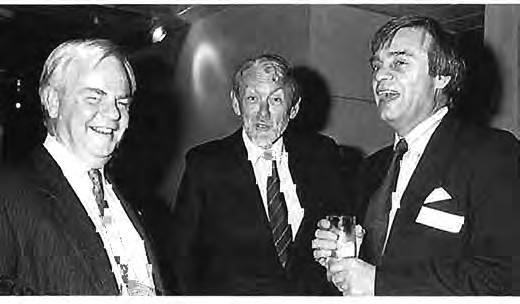
Judge Crossley, Colin H oward, Ed Fieldhouse
THE VICTORIAN BAR - ITS WORK AND Organisation, was written by David Harper Q.c., Andrew Kirkham Q.c. and Andrew McIntosh, with cartoons by Croc (alias his Honour Judge Crossley). It was launched by Dr. Colin Howard at a function on 4 May 1990 at the Snail 'n Bottle Restaurant.
IT IS DIFFICULT ENOUGH FOR YOUNG people to understand the workings of the legal profession as a whole, much less to appreciate the role of the Bar within it. The practice of school students coming into chambers for "work experience" gives members of the Bar an opportunity to provide some degree of enlightenment , but this may be confined to particular jurisdictions and to the cases which happen to be under way at the time. Recently, a readable booklet which gives an overall view of the Bar's role within the profession and generally has been distributed: "The Victorian Bar - Its Work and Organisation". Members should note that this booklet provides an excellent introduction to the Bar for work experience students and extra copies are available from the Executive Officer. Also, those barristers who are involved in "careers nights" and the like at schools may care to collect copies of the booklet for distribution. We have all encountered problems explaining the work and organisation of the Bar to others, especially young people, and we should be enthusiastic to make ready use of the resources which the Bar itself has produced for this purpose.
52

ADA GRINGLAS, NOW ADA MOSHINSKY
Q.c., was born in Rovno, Poland in 1940. Her father, Mietek Gringlas, was then a soldier in the Russian Army. Mietek had managed it so that Ada and his wife, Lida, accompanied him to live at an army station near Odessa. A Major-General discovered this and rather than punishing Mietek , insisted that Ada be registered as a soldier , so that she would get food rations. So, if anyone asks you who was the youngest female member of the Russian Army (at the Victorian Bar anyway), you'll know.
Ada's family came to Australia in 1947. She finished her education at MacRob. She started law in 1960 and married Sam, not his brother Nathan as some believe, in 1962. She was articled to Maurice Cohen. Ada then spent ten years as a solicitor in her own practice. It was Neil Forsyth Q.c. who redirected Ada's whole professionallife by encouraging her to come to the Bar. She read with him, and has spent most of her time at the Bar working in the tax area. She has three children and her principal interests are modern art, theatre and cinema and travel. Ada's son Mark, Victorian Rhodes Scholar for 1988, has recently written and had published a book: "Mietek Gringlas: A Biography". It provides, amongst other things, a fascinating picture
MR . J. RUPERT BALFE Q c. , RECENTLY appointed Honorary Consul in Victoria for the Republic of Pakistan, entertained other fellow members of the diplomatic cocktail set to drinks and savouries to celebrate Pakistan National Day
The event was marked in Seabrook Chambers
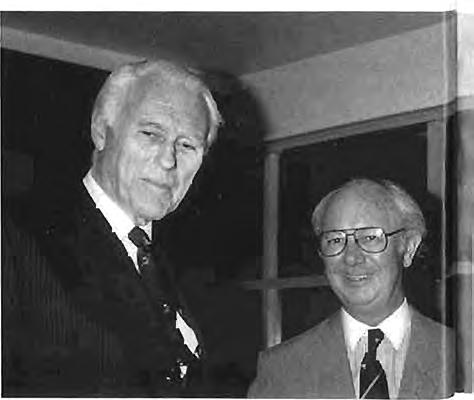
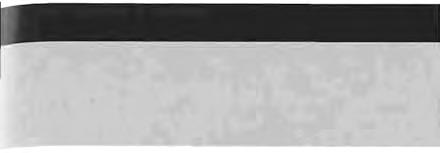
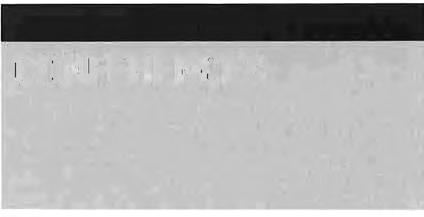





of the life in Eastern Europe during World War II. It is almost disarmingly frank about some matters. It also tells many delightful stories about Ada, especially as a child.
by a gathering with the Pakistan flag prominently displayed. The Chief Justice and other members of the judiciary and Bar were invited to mingle with diplomats of various nationalities.
The Honorary Consul made no official speech but rather warmly welcomed and farewelled each guest.
Pictured below L. to R.o Sir John Young and Rupert Balfe Q. C. pictured with guests.
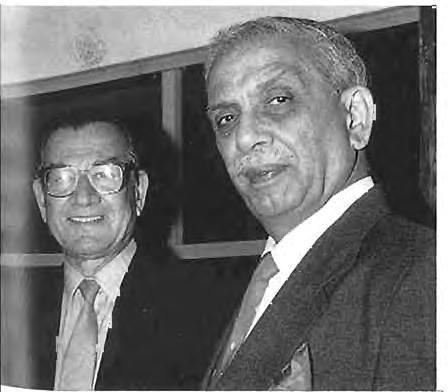
30th September-6th October
Law Society of W.A., Broome W.A.
Information, GPO Box 435, Perth 6000 22nd September-23rd September
English Bar, London UK
Information, Phone London (071) 722 9731
Fax: (071) 586 0639
14th October-18th October
Maritime Law Association of Australia and New Zealand, Auckland New Zealand
Information, Andrew Tulloch (03) 605 5555
Fax (03) 602 3100
28th September-30th September
Lawasia Labour Law, New Delhi, India
Information, Dr Anand Prakash, 11 Jor Bagh, New Delhi, 110 003, India
18th-19th October
Aviation Law Association, Sanctuary Cove, Gold Coast Qld
Information, Cindy Last, 1st Floor 627 Chapel St., South Yarra. Fax (03) 824 0619
10th-13th December
Australian Institute of Criminology, Bali, Indonesia
Information, GPO Box 2944 Canberra ACT 2601. Phone (06) 274 0224 Fax (06) 274 0225
THE LANCHID SOCIETY, A GROUP DEvoted to the promotion and encouragement of professional and social contacts between the legal professions of Australia and Hungary, has been established in Melbourne. The society is named after the oldest and most beautiful bridge across the Danube at Budapest. The president of the society, Mr. Justice John H. Phillips of the Supreme Court, said recently "those connected with the society feel very strongly that Australian lawyers should be supporting our Hungarian colleagues at this vital time in the history of their country". The society already has plans to organise a visit to Australia by a member of the Hungarian judiciary.
Membership of the society costs $2 per annum and inquiries can be made of Mrs. Catherine Mukhtar on 603 6147.


against an employee" in (1990) 3 Insurance Law Journal, 5-11
Hall, J "The valuation of intellectual property
BREACH OF CONFIDENCE and intangible assets" in (1990) 1 Intellectual Cornish, WR "Confidence in ideas" in (1990) Property Journal, 11-22 1 Intellectual Property Journal, 3-10
Birks, P "Restitution after ineffective contracts: issues for the 1990's" in (1990) 2 Journal of Contract Law, 227-240
Swanton, JP "The concept of self-induced frustration" in (1990) 2 Journal ofCon tract Law, 206-226
Davis, B "The new rules in international child abduction: looking forward to the past" in (1990) 4 Australian Journal of Family Law, 3159
Parkinson, P "Child sexual abuse allegations in the Family Court" in (1990) 4 Australian Journal of Family Law, 60-84
Dyzenhaus, D et at. "Judicial review,jurisprudence and the Wizard of Oz" in (1990) 1 Public Law Review, 21-52
Gray, Mr. Justice PRA et al "Yielding the field: the Australian Industrial Relations Commission's discretion to refuse to invoke its own jurisdiction" in (1990) 3 Australian Journal of Labour Law, 36-47
Malek, A et al "Worldwide Mareva injunctions: the position of international banks" in [1990] Lloyd's Maritime and Commercial Law Quarterly, 88-98
Brownie, Mr. Justice "Co-insurance and sub- Oakley, AJ "The development of the construcrogation" in (1990) 3 Insurance Law Journal, tive trust as a remedy in Australia" in (1989) 5 48-61 Q. U. T. Law Journal, 19-34
Derrington, Mr. Justice "Subrogated recovery James Butler
Supreme Court Librarian Or Write to: Mrs R. Drodge, PO Box 225, Chelsea 3196.
What Every Busy Practitioner Needs A Filing Service for all your loose leaf services. ONLY $3.25 a service. (Less than 4 services $12.00 minimum) Tax Reporter Service $4.50. ALSO annotations for English Updater Series etc. For Prompt Immediate Service Contact Rosemary on 773 1329.

Coram: High Court 9th February 1990
Mason c.J.: I must say your outline of argument has been drafted in most subtle fashion, because it does seem to conceal your reliance on s.48 as a distinct and independent submission.
Merralls Q.c.: That is because the outline was drafted last night and the possible significance of s.48 dawned on me under the shower this morning.
Brennan J.: When you did not have a pen at hand.
Coram: Tadgell J. 27th March 1990
8th day of contest in the Commercial List between various workers' compensation insurers (JD Phillips Q.c., M. O'Loghlen and P. Jopling) and the Accident Compensation Commission (J. Middleton and M. Fleming).
His Honour queried a Court Book, which in its index referred to "Harry Curtis Swan" as the maker of an affidavit. It being suggested that perhaps this reflected an error in transcription"Harry Curtis, sworn" being what was intended - His Honour recalled other proceedings, in which one Jane Doe "Head Lessor" was unfortunate enough to find herself described in print as a "Headless whore".
21 st February 1990
First Counsel: How's your hacienda progressing?
Second Counsel: I have had enormous difficulty with the Council. I don't think they're going to approve my plans.
First Counsel: Well hacienda that.
Coram: Golden M. 18th April 1990
(Defendant in person giving evidence as to why he drove from the scene of a collision without exchanging names and addresses).
Defendant: I told them they could get my name out of the telephone book.
His Worship: How were they going to do that when you didn't give them your name?
Defendant: Well to tell you the truth your Honour (sic), I think I was just being smart.
Coram: Nathan J. George Golvan for Plaintiff David Byrne Q.c. with Brian Doyle for the Defendants
Golvan: May it please your Honour, this is a passing off action between two funeral parlours.
His Honour: Are you sure it's not a passing on action?
Golvan: I am pleased to advise that the action has been settled.
His Honour: Well, I am mortified.
[We are not informed whether an undertaking as to damages had been given. Eds.]
Submission by a suburban municipality urged the reduction of frivolous and vexatious appeals, particularly by third parties, by imposing a greater anus of responsibility on prospective appellants.


Coram: Marks J 27th April 1990
An order was produced which included the following:
Attendance: Mr. Hortog-Berreley (sic), one of Her Majesty's Court (sic) with Mr. R. Howie of Counsel for the Plaintiff; Mr. J. Hammond of Counsel for the Defendant.
Mr. Con Nikakis, Judicial Registrar of the Family Court of Australia, recently received a thank-you card in the following terms:
"A Special Note to thank you
To Mr. Nikakis, You were most kind and this little note comes to thank you for your thoughtfulness!
Thanking you sincerely for your consideration on March 20th in the Dissolution List; thanks to you I was divorced at 11.30 a m. and remarried at 4.30 p.m. that day The baby hasn't arrived yet but won't be long . Kind regards , (Signed)"
Coram: Kay J. R.K. Davis for husband G. Atkinson for wife
His Honour: The wife's obligation is to comply with the access orders.
Mr Davis: I am in heated agreement with your Honour, and I am sure the parties have heard, which is what is more important.
His Honour: The access order does not deal with Easter at all, does it?
Mr Davis: Yes, it does. My client, in fact, has this Easter, your Honour, it is an alternating situation
His Honour: Maundy Thursday, sorry, yes. It is language that is not easily recognisable by everyone in the community He has them from 4 pm Maundy Thursday. If you stopped 15 people in Collins Street and asked them when Maundy Thursday was I bet you could not get 11 positive answers.
Mr Davis: Well, your Honour, so far as that is relevant, with respect, I went to a church school, your Honour may not have done so. So I am aware of
His Honour: I went to many schools.
56
Alan Goldberg Q.c. and Susan Crennan Q.c. for Plaintiff
Ron Merkel Q.c. and Bruce Caine for Defendant
Goldberg Q.c.: If it is not impertinent, Your Honour, might I draw a diagram on the whiteboard and show the witness what I mean?
His Honour: May you do it?
Goldberg Q.C.: Yes, your Honour. Or, ifthat is regarded -
His Honour: How will that get onto the transcript?
Goldberg Q.c.: Mr. Merkel will have to call me, your Honour, and then Mrs . Crennan can cross-examine me.
Merkel Q.c.: Your Honour, this prospect is so exciting that I certainly would offer any consent that is necessary.
Coram: Judge Frank Lewis 20th April 1990
Duncan Allen making a plea
Allen: My client himself has an unblemished background, hasn't even incurred a parking fine in his 29 years.
His Honour: Does he have a driving licence?
Allen: He doesn't have a Victorian driving licence. No, he doesn't have a driving licence, which explains why he hasn't got a parking fine. I didn't ask him that one.
A A T. (Victoria)
Coram: Judge Smith 11 th May 1990
Bryan Keon-Cohen for Applicant
Michael Adams for Respondent
Keon-Cohen: And your Honour I rely on the case of Dekanic v. Tax Agents Board of New South Wales, a decision of this very Tribunal constituted by Mr. Justice Davies.
His Honour: No, Mr Keon-Cohen , not this Tribunal.
Keon-Cohen: Yes, your Honour, I have the report here and it says the Administrative Appeals Tribunal.
His Honour: Yes. The Commonwealth Tribunal. Mr. Justice Davies has never been a member of this Tribunal. This is the Administrative Appeals Tribunal of Victoria.
Keon-Cohen: Oh.
Adams: Now I understand your constitutional point , Bryan.
Coram: Barberio M . 9th February 1990
An applicant in person was seeking restoration of his driving licence after an impressive list of prior convictions for .05 offences. The applicant called a series of witnesses of distinctly dishevelled appearance who testified in rather unconvincing terms as to what was, on the best view of the evidence , a slight reduction in the applicant's intake of liquor.
The last witness was a lady of even more dissolute mien whose presentation was not helped by her omission to bring her dentures with her. After giving her name and address, the following exchange occurred:
His Worship: What is your occupation?
Witness: Q c.
His Worship (startled): Did you say your occupation was Q.c.?
Witness: Yes, Quality Control at Safeways
Coram: Judge Keon-Cohen 21 st June 1990
George Slim for Prosecutor Ron Clark for Defence
Clark: In fact, you're the administrative head of the D.S G , if that's the correct term - you're supposed to arrange for rosters and all that sort of thing?
Witness (Senior Sergeant of Police): Yes.
Clark: Do you also take part in the supervision of the operational aspects of their duty?
Witness: Yes.
Clark: You've got many functions to perform?
Witness: Yes.
Clark: You'd be, what they call, a multi-functional-polis man?
Witness: Yes, I think that would be pretty accurate.
Clark: Sorry, Your Honour.
His Honour: I don ' t understand what all that means and I certainly do not understand that comment. If you are a jack-of-all-trades, I would understand that.
Clark: Yes , sir, I'd put it that way , you're a jack-of-all-trades , that you're responsible not only for the operations, but you're also responsible for the administration?
Witness: I'm no different to a chief executi ve of any company that is in charge of those below.
His Honour: You are saying the pay is about the same?
Witness: Sir, I wish it was
Quarter Sessions: Judge Palate Recently in June H.E. Nose for Vintage P R E Tending for Big Names
Nose: He was really setting out to impress you?
Witness: Well he considered himself an expert in these matters, he said we should have nothing but the best to seal the deal.
Nose: Those were his words?
Witness: Yes, and he ord ered the '77 Mouton Rothschild , so I knew he was a poser - you know - that he really didn't know much at all.
Nose: How did you know that?
Witness: Well there was a '78 Lynch Bages on the wine list too Anyone who knows anything about claret would know it's a better drink.
Nose: Is that why you called off the deal?
Witness: Well yes -I couldn't get into bed with someone who didn ' t know their claret.
His Honour: Quite right too.
Nose: So where did you gain your expert knowledge of claret?
Witness: I regularly read Paul de Burgh-Day's Newsletter.
Nose: How did you get this newsletter?
Witness: I got it by phoning (054) 262 188 , but I think you can get it by faxing (054) 262 472 as well.
His Honour: Everyone knows all serious claret drinkers read this , so reserve your commercials for the media in future!
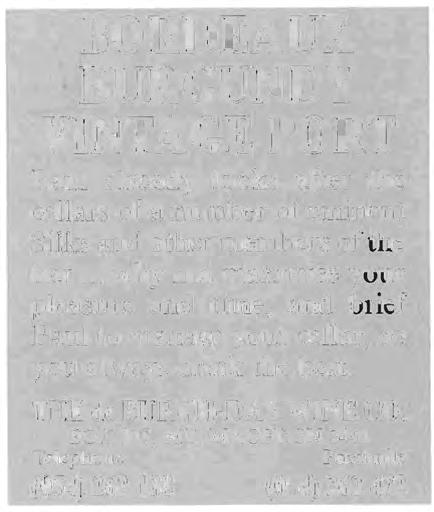

HA VING BEEN REQUESTED TO PROVIDE
an article entitled "Lunch" for the Victorian Bar News it occurs to me that , over the years , this quarterly publication has succumbed to publishing nothing more than a subjective, self-aggrandising, journalistic and temporary observation of the author's all too transient gastronomic experience.
In a publication such as this, which panders to palates and egos alike, there is a readership of gastronomes, gourmands, gourmets, peripatetics and dilettantes boundless who will not be satisfied by a simple restaurant review every quarter. No! the readership of this august magazine will remain unsated by such simplistic reviews once every three months. It is therefore with the future of the Bar in mind that I am prepared to divulge , in print, a selection of some of the COMMANDMENTS OF DINING . These are the fundamental rubrics by which barristers, and other persons, can conduct their lives in such a way as to take lunch properly:
1. When a waiter attends your table never let him escape without an order that compels him to re-attend with something immediately.
2. Never order a capuccino except at breakfast time .
3. No matter where you dine, always order your steak one degree more rare than you would actually prefer it.
4. Never order oysters in any other way than au nature!.
5. Never order prawns ifthey are to be served in the shell.
6. When one is considering drinking from the finger bowl, always do so before the crustaceans are served
7. If one is attending a BYO restaurant always ensure that one takes more refreshment than it is thought will be required because "It's better to be looking at it, than looking for it".
8. When consuming snails in a French restaurant ensure that you put the green bits to one side - for they are the Defender pellents.
9. When lunch is completed and it is necessary
to throw food at other diners, please throw only the bread rolls for other morsels may be covered in sauces which may resemble blood and other bodily fluids which will only cause diners to panic.
10. At the conclusion of a meal , no matter how many diners there are, it is invariably necessary only to order cheese for one, as this will normally be sufficient.
11. When attending a BYO restaurant and it is necessary to hail a taxi, always carry the wine in an airline bag so that the driver will assume you are going to Tullamarine rather than one city block.
12. Whenever one is dining in an e stablishment where steak is the only option on the menu always order the T -Bone , for then one can identify exactly what one has ordered.
13. Never consider dining at a restaurant which you know has sued or, alternatively, threatened to sue a restaurant critic.
14. If you attend a restaurant and you are offered garlic bread - leave immediately.
15. When attending a BYO restaurant it is advisable to take your wine and beer in screw top bottles in order to avoid the interminable wait before you are served.
16 . When a normal meal is over and it is appropriate to lick your plate , please make no more noise than as is absolutely necessary (unless of course you are dining with Arabic friends).
17. It is unwise to order house wine if it is to be served in a carafe.
18. It is always unwise to eat at a restaurant which feels compelled to advertise in the media.
19. When, having been served the Whiting in Beer Batter at Fanny's, it comes time to squeeze the lemon - always prise open the batter and deposit the juice on the flesh of the fillet, rather than turning the batter into a soggy mess.
20. It is unwise to pay amorous attention to the knee of your host's wife at a yuppy dinner party ... these people invariably have glasstopped tables.
21. When attending a much publicised restaurant, in order to obtain keen service, simply place a note pad and pen upon the table and look as if you are taking notes.
22. Never wear a narrow tie to an Italian restaurant, because you are bound to get it confused with the fettucini, wrap it around your fork and strangle yourself before being offered the complimentary amoretto.
23. If you are dissatisfied in a restaurant and the food must be returned to the kitchen, there are only limited acts of defilement the highly temperamental chef can perform on a steak so never dream of returning the soup!
24. Subsequent upon a meal of curry, in order to keep one's marital relationship extant, a person should sleep facing one's partner.
25. Whilst one can ignore generally the advice not to order fresh fish on a Monday - do not order (in an Italian restaurant) the minestrone on a Monday.
26. If one finds oneself inveigled into attending a vegetarian restaurant, by some bad chance,

do not attempt to impress the waiter by ordering your main course "medium rare" .
27. If you happen to be in a Chinese restaurant and the establishment has not recognised you for the gourmet sophisticate that you undoubtedly are, stamp your authority over the staff by ordering a pot of Chinese Tea immediately.
28. Although it may seem mercenary, and therefore a decided lack of breeding, it is always wise to check the bill at the end of the meal because if the amount charged for the drink is less than double the amount charged for the food - you know that you have been ripped off for the food!
The above represent merely a microcosm of wisdom gained over many years of attending to the true barristerial vocation of settling before lunch and, therefore, never losing a case.
And I so advise.
Sir Lunchalot









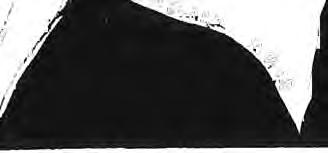
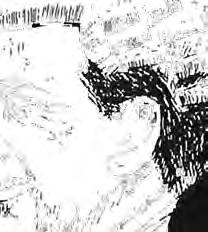



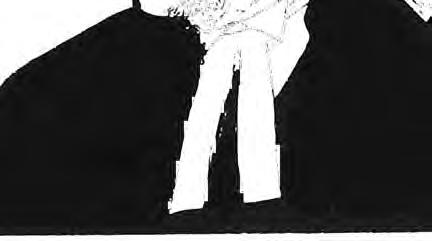

Now gather around me my dears whilst I tell this tale of endless resistance to change
ONCE UPON A TIME, MANY YEARS AGO, there was established a colony of Worker Bees. After much deliberation , and a lot of disagreement, they called themselves the VicBees . Unlike the other colonies of Bees, the colony of VicBees consisted only of Soldier Bees. Every little while the colony of Vic Bees would try to establish a new Hive. Each time they went through many years of deliberation , and a lot of disagreement, before they decided where the new Hive should be, or even whether there should be a new Hive. When they did get to decide to have a new Hive it was almost always borrowed from someone else . But the VicBees were philanthropic and always paid generously for the loan of their new Hive
After the lengthy agonies of deciding whether or not to have a new Hive, the lengthier and more painful process of deciding what that new Hive should be, and where it should be , the VicBees




went through another process of deliberation and a lot of disagreement deciding what name should be given to the new Hive. Often each new Hive was named after a Bee who had been much loved and well respected. In each instance, the VicBees collectively decided that such a loved and venerated Bee should be remembered for however long there was a colony of VicBees. Many years later such venerated and much loved Bees were forgotten when a newer and bigger Hive was occupied by the colony of Vic Bees. The same Bees who thought it was so important to remember , in perpetuity , past loved and venerated Bees apparently changed their minds. That was one of the few occasions that the VicBees changed anything.
That newer and bigger Hive took a long time from first conception to eventual occupation. In fact, the VicBees created a record for the amount of deliberation and disagreement at each stage of

















the process. The VicBees were so stunned by their own ability to create such a big and new Hive that they promptly gave it away in another fit of philanthropy.
But the VicBees were not happy with their achievement and they began to argue again about another Hive. Some Bees wanted to have lots of different Hives - Hives of different sizes, colours and everything else. The VicBees restarted the process of deliberation and disagreement. Just when it looked like they had a degree of agreement on forming a few more Hives they suddenly discovered that they had collectively obtained a new Hive. But this Hive was different to all the other Hives. It did not belong to anyone else. Instead of rising up into the sky it was a big hole in the ground. It stayed a big hole in the ground whilst the VicBees deliberated at length and had more arguments.
It seemed that the Colony could not agree on how big, what colour, what shape or when it should be completed. It also seemed that the Colony wanted to decide before the Hive was created who was to own it. Some Bees wanted to give it away so that the Colony's record of philanthropy would not be changed. Other Bees wanted it to be kept by the whole of the Colony so that the Colony could continue to deliberate and disagree on its management. Some Bees, who were obviously non-Colony oriented, and spoilsports to boot, wanted the new Hive to be broken up into little bits with each Bee owing a different part of the new Hive. I cannot tell you what happened because the deliberation and disagreement still continues.
At the beginning there were only Soldier Bees in this Colony. Unlike other colonies, VicBees were very slow to evolve and remained generally unmixed for a long long time. Even today there are few lady Bees and there are certainly no queen Bees, there never have been any and there are unlikely to be any for a long long time. VicBees are very proud of their past KingBees and still love and venerate each of them, even if the names of some of them have been removed from the Hives. At the bottom of the second biggest and one of the older Hives are crude likenesses of loved and venerated KingBees. It seems that almost all of the KingBees not only saw things in black and white but they preferred to be seen in black and white . All that is, except for a very recent King Bee who must have been a very colourful KingBee. It appears that he spent a lot of his time standing in the middle of verdant patches, dressed in white and waving at his fellow Bees with flimsy bits of wood. It grows late so I will continue this story on another occasion.
Graham Devries
(To be continued)
We collaborated closely in writing this book. and, as lawyers say, we accept "joint and several responsibility" for it. In other words, I wrote the good bits, and he wrote the rest. Chisholm and Nettheim, Understanding Law (1974).
Legal writers try to show good faith by listing all the good lawyers who have checked the proofs and made "helpful suggestions". Then they put the blame for the index on some newly called young woman barrister. That is the one bit the author really should write.
Nicholson, Esprit de Law (1974)
The views expressed are the personal views of the writer. This paper is read on the understanding that whatever steps are necessary in this day and age in order to avoid liability for negligent advice, the writer is deemed to have taken such steps.
Warren Pengilley, Exclusive Dealing (1980)
We acknowledge our grateful indebtedness to such snippets ofman's accumulated wisdom as we have been able to ingest and to plagiarize and to the purveyors of such insights, living and dead, whom we have encountered. Many have led us astray and, doubtless, are responsiblefor any infelicities or weaknesses in our work. Ifsuch blame is to be made specific, however, HWM, KM, AMP, HZ, and FZ bear a particular burden. Contrary to long-standing tradition, we accept responsibility for any virtues in this book.
Morris and Hawkins, The Honest Politician's Guide to Crime Control (1970)
Halsbury's Laws of England. 4th ed. Mal Park Plus Annual Abridgements, Cumulative Supplement, Loose-leaf Current Service and Australian Commentaries for 1989. Apply; Robyn Doss (03) 602 2055.

Court Portraits by Maree Menzel B.A., Dip.A&D.
- Court Artist for ABC National T.V. News. - Pastel or Charcoal portraits done in situ. Maree Menzel, 63 Station St., Port Melbourne 3207. Phone 645 1425.


by M. Davies and A. Dickey, Law Book Company, 1990;
pp 431 xxii; Price $79.50
ANYONE WHO HAS HAD A LEGAL problem in shipping will be well aware of the complications of the subject. The area is dominated by the Commonwealth's overburdened Navigation Act passed in 1912. At last count there were 25 sets of Regulations passed under that Act. But other Commonwealth Acts may apply as well - such as the Marine Insurance Act 1909, the Sea-Carriage of Goods Act 1924 and the Shipping Registration Act 1981. Then there are the laws of each of the States. Each State has its own (variously styled) Marine Act as well as numerous other Acts and Regulations dealing with various shipping-related topics. Uniformity between the States has not been the chief feature of the laws passed by the States. Nor have the States uniformly achieved the purpose of ensuring that obscure English Acts do not at all continue to have force in the area. The Bills of Lading Act 1855, for example, where it applies , still continues to have force and effect in Australia.
It is, therefore, an enormous task to set out the law of shipping in Australia and the authors of Shipping Law ha ve done this very well. The early chapters in the book deal with introductory matters and with constitutional issues as they affect shipping arising out of the division of powers in Australia. Later chapters (3 to 7) deal with the registration of ships, the ownership of ships, the acquisition of property in ships, and charges over and mortgages of ships. Other chapters (9 and 11) deal with voyage and time charter parties. Chapter 10 deals with bills of lading and includes an important section on the Hague Rules. Collisions and liability for damage are the subjects of Chapter 12 while Chapter 13 deals with the exceedingly difficult area of limitation of liability. Marine insurance is the topic of Chapter 14 while Chapters 15 and 16 are devoted to the topics of general average and salvage. The final chapter in the book (Chapter 17) deals with wrecks. The appendices to the book give examples of charters, 'a liner bill of lading and set out the York-Antwerp Rules 1974 (which
concern the adjustment of general average). Throughout the book, the authors have been very careful to ensure that the legal propositions set out in the body of the text are adequately supported by reference to statutory provision or by reference to up-to-date legal authority. The text states the law as at 30 June 1989. A useful Table of Cases, a useful Table of Statutory Materials and a very helpful Index complete what is a wellresearched and well-written work. Perhaps the only criticism that might be made is that the book could have contained a separate chapter on admiralty jurisdiction which, since the Admiralty Act 1988, has become an increasingly important aspect of shipping law. Nevertheless the book does contain references to the various sections of that Act as and where necessary. In their work, the authors of Shipping Law have given a comprehensive, authoritative and well-presented account of a difficult body oflaw. They are to be commended for their effort, not to mention their perseverance.
Damien J . Cremean
by R.B. Vermeesch and K.E.
Lindgren, 6th Edn., 1990; Butterworths, pp 1-1180; Soft cover $49.50
ALTHOUGH THE FIFTH EDITION WAS printed in 1987, there have been significant changes in commercial law and it is welcoming to see Messrs. Vermeesch and Lindgren bringing out yet another edition of their valuable book. To those who are unfamiliar with the work, the book's contents include chapters on the law relating to contracts, assignment of contractual rights and obligations and the discharge of contracts as well as chapters on such subjects as torts and crimes, remedies, property, industrial property, in fact the whole area that a practitioner may encompass in advising a commercial client.
The book also contains interesting sections on
Parliament and government, colonies and the commonwealth and the courts. Within the chapter relating to Parliament, the historical development of Parliament as a source oflaw is carefully explained by the authors.
It is no criticism of the authors to say in a work of this dimension that it is not possible to cover the individual topics in as great a detail as the topic may be treated in a more specialised work. However, what this book does do is to direct the reader to the general principles oflaw applicable and to the authorities behind those principles.
An example of this may be found in the way that the authors have gathered the relevant authorities in relation to promissory estoppel and have provided a detailed and useful analysis of the judgment of the High Court in Waltons Stores (Interstate) Ltd v. Maher. A similar analysis is provided later in the book of the allimportant Tridant Insurance decision in relation to privity of contract.
It would be impossible in this review to provide a commentary on all of the sections covered by this book; however, a section of importance to practitioners and students is the detailed commentary provided to the securities legislation including a glossary of common Stock Market terms. A second chapter that requires mention is that on bankruptcy, which describes the legislation in most helpful terms.
It is a book that I would recommend as being of considerable use to both students and practitioners alike.
John V. Kaufman
edited by T.G. Youdan, Law Book Company, 1989;
pp i-xxix, 1-434, Index 435-8
THIS BOOK ARISES FROM A SERIES OF papers presented at "The International Symposium on Trusts, Equity and Fiduciary Relationships" held in Canada in 1988. Despite the foreign location in which the papers were delivered, a number of distinguished Australian academics and practitioners made substantial contributions to the seminar, notably Professors Finn, Austin and Neave, Mr. Justice Gummow and Mr. Lehane. These contributions have been embodied in this book.
Professor Finn's contribution is found in
Chapter I, "The Fiduciary Principle," which is immediately followed by Mr. Justice Gummow's chapter entitled "Compensation for Breach of Fiduciary Duty". Both chapters range over the length and breadth of the common law world taking counsel from all ages and jurisdictions. While the discussion is certainly academic, it is also of relevance to those involved in providing advice and who seek guidance in the day-to-day application of fiduciary principles to business and personal relationships.
Sir Robert Megarry's contribution is an enthralling and enlightening analysis of Cowan v. Scargill [1985] Ch 270 [The Mineworkers Pension Scheme case]. This case was heard by Sir Robert Megarry shortly before his retirement as Vice-Chancellor and arose from Mr. Arthur Scargill's involvement as president of the National Union of Mineworkers and trustee of the Mineworkers Pension Scheme established by the National Coal Board in the United Kingdom. Sir Robert discusses" ... what has appeared in a published judgment of his [own] and ... [offers] to the profession any further and better thoughts that time has brought [to him] " Certainly this short chapter alone makes for fascinating reading.
Other contributions cover areas as diverse as taxation, trusts as business entities, family law property arrangements and pension plans in a diversity of jurisdictions.
The final three chapters examine "New Directions" for equitable doctrines in England and Wales, Australia and Canada respectively. As Mr. Lehane notes in his chapter on Australian developments (Chapter 15), the 1980s have produced a rich lode of Australian case law concerning equitable doctrines - CBA Ltd v. Amadio (1983) 151 CLR 447; Legione v. Hateley (1983) 152 CLR 406; Hospital Products Ltd v United States Surgical Corp (1984) 156 CLR 41; Daly v. Sydney Stock Exchange Ltd (1986) 160 CLR 371; and Muschinski v. Dodds (1985) 160 CLR 583 amongst others, although this chapter is principally concerned with a discussion of Legione v Hateley.
It is instructive to note that discussion of equitable principles has long transcended national boundaries (see the exchange of letters quoted in Chapter 2 between Sir Frederick Pollock and Justice Oliver Wendell Holmes in 1914). Much can be gained from such discussion as is evidenced by this book. The book is scholarly - it is not a textbook or summary of the current law - however, it is a work that provides much insight and food for thought to those interested in jurisprudence and the evolution of equitable doctrines.
P.W. Lithgow .63

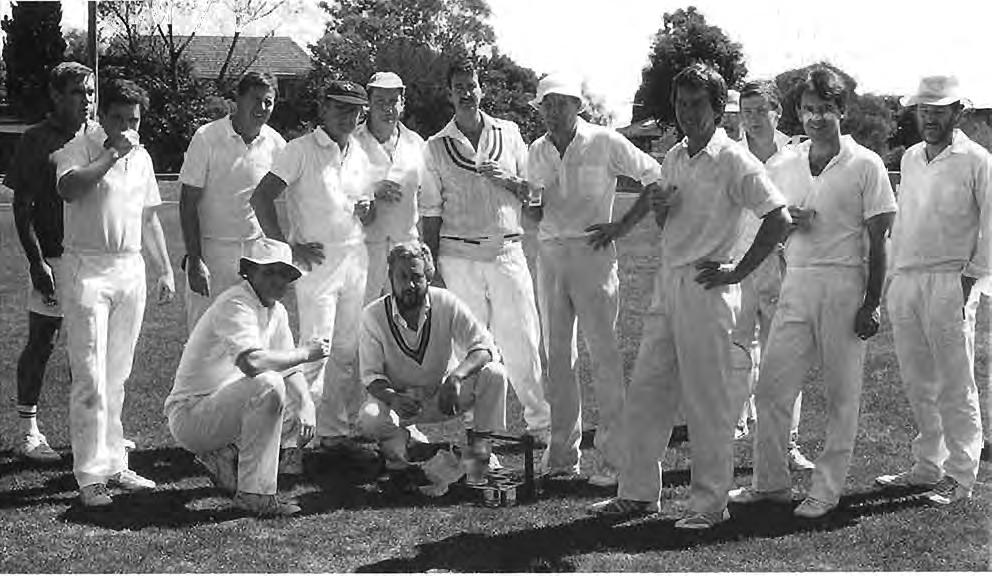
THE DESIRE FOR REVENGE WAS strong. Last year, somewhat surprisingly, the NSW Bar team defeated the Victorian Bar. The opposition had described their win as comfortable and, in true punchy NSW style, had endorsed the trophy accordingly. We chose a strong side and were looking forward to the encounter.
The game was played on Saturday, 24th March on the picturesque Fitzroy-Doncaster Cricket Ground, which was in excellent condition. The day (as is expected in Melbourne) was bright, warm and dry. This gave us a distinct advantage over our colleagues from NSW. They had not seen sunshine this year. They were all somewhat overpowered by the warmth and brightness. We won the toss and invited them to bat. As we have come to expect, our opening bowlers, Harper Q.c. and Connor, performed brilliantly. At the end of 16 overs the opposition was 3/28Harper 1114 and Connor 2114. As is usual in these games, Connor took another blinder in the 64
gully. Some of the catches taken by Chris Connor over the years for the Bar side would have done proud the likes of Botham and Border. The opposition from 3/28 advanced to 74 due to good innings from Stirling Hamman and Greg Laughton, who made 34 and 45 respectively. We got our fourth wicket at 74 and our fifth at 102. From then on it was a procession only broken by some stout hitting by the NSW skipper, Peter Hastings, who made 18. The opposition were all out for 147. Our spin bowler, Peter Couzens, had a day out. He bowled brilliantly and took 5/39 off 8 overs. Not only that, he took an excellent catch in covers and then snapped up two brilliant catches offhis own bowling. For a former wicketkeeper, Peter bowled brilliantly!
'147' did not look a big score on a beautiful wicket. Our openers, Tony Neal and Peter Walton, put on 23 for the first wicket. Ross Middleton, no doubt suffering from his excesses, managed to be bowled without troubling the scorers by his good friend Stirling Hamman, who was
delighted. (We were amused!!) Chris Connor went for 14 and Peter Walton made a very well compiled and entertaining 39 before being well caught on the long leg boundary. At 4/61 we were starting to look distinctly vulnerable . Gillard joined McTaggart who was then 1, and between them they put on 61 for the fifth wicket before Gillard was bowled for (in all modesty) a brilliant 31. At 5/112 it looked a mere formality. The losses of Peter Lithgow run out for 0 and McTaggart for 31 saw the score at 7/127. All of a sudden we had a fight on our hands. However the hero of the day, Peter Couzens, who made an unconquered 15, guided the team to a welldeserved victory with 8 wickets down.
The game was played in very good spirit in very pleasant surroundings. We do thank all those at Fitzroy-Doncaster Cricket Club for making the day so memorable .
Peter Couzens, with his 3 catches, a 5-wicket haul and 15 not out, was clearly the man of the match. Well done, Peter; if you keep in training, there is a fair chance you can keep going for a few more years!
The day concluded with a very enjoyable team dinner at Fitzsimmons Restaurant.
The Victorian Bar team wasE.W. Gillard Q.c. (Captain), David Harper Q.c., Chris Connor, Bruce McTaggart, Peter Couzens, Ross Middleton, David Myers, Tony Neal, Peter Lithgow, Michael Cosgrave, Peter Walton and Andrew Donald.
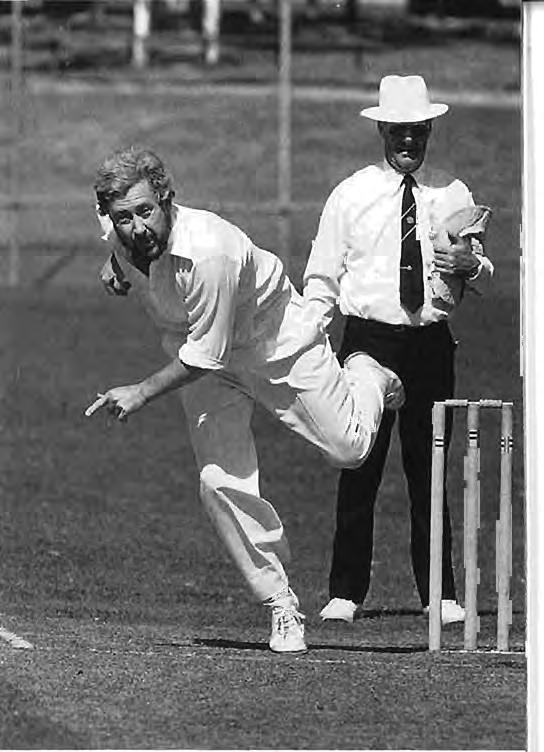

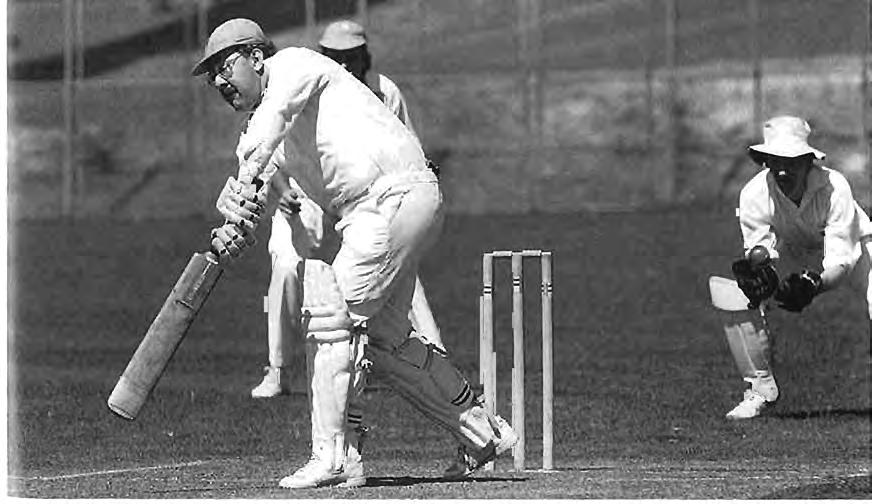
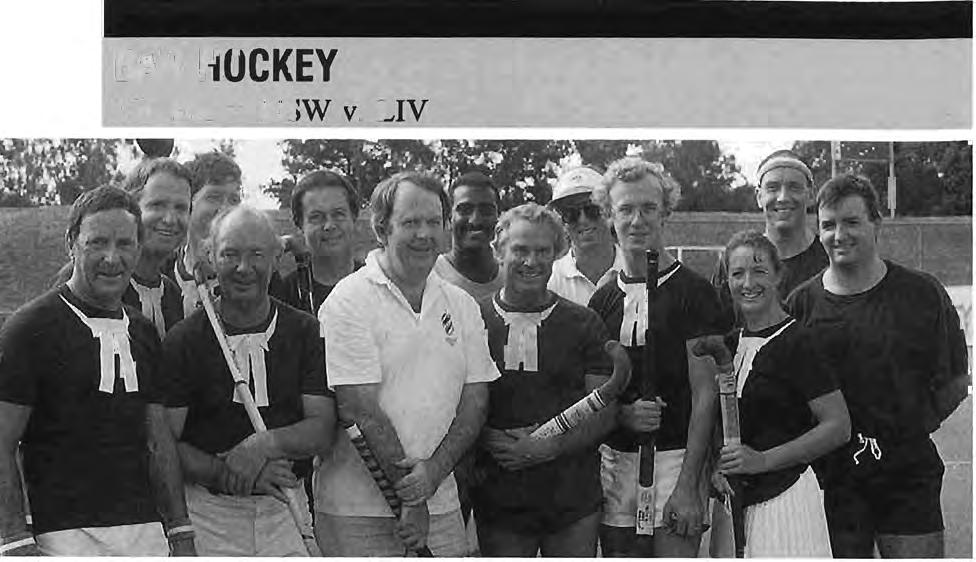
24 March 1990: About to 'take the field ' - being the State Hockey Centre, Royal Park. Front Row Left to Right: Gordon Smith, Rupert Balfe Q. C, Tom Lynch - Goalie in white Melbourne Olympic Promotion shirt, John Coldrey Q.C, DPP, David Beach, M eryl Sexton , Michael Tinney Back Row Left to Right: Andrew Tinney, Richard Brear (with cap on stick; later in hand to collect fees), Roger Young, Ganasan Narianasamy - VHUA umpire, a LIV umpire, and Philip Burchardt.
ON THE SAME DAY OF THE BAR'S annual cricket match against the NSW Bar, the inaugural annual hockey matches between the Bar, NSW Bar and Solicitors' team and LIV were being played at the State Hockey Centre, Royal Park on 24th March .
The "Bar None" team comprised Balfe Q.c., Beach, Brear, Burchardt, Coldrey Q.c., DPP, Lynch (goalie), Muller , Smith, Sexton, Tinney, Andrew and Michael Young. Other players (about eleven) were unavailable, away injured, pregnant, orwise - as it was a hot day. Ganasam Narianasamy, VHUA, kindly umpired again.
The NSW team comprise NSW Bar members and solicitors - ajoint team organised by Peter Callaghan. David Sonenberg organised the LIV team. Peter's letter in appreciation says, in part "On behalf of the NSW lawyers who participated in the hockey matches last Saturday I would like, through you, to thank the Victorian Bar for their organisation of the matches (and associated activities!). The matches were great fun even if the results were not what we had hoped for. The victualling at the ground and especially at Fitzsimmons was most generous and most appreciated. I would be grateful if you would pass on our thanks to your Chairman.
66
"We will certainly seek to organise a similar outing for your Victorians in Sydney next year. "
After the game the NSW team was entertained at Fitzsimmons Restaurant and Seabrook Chambers - thanks to the Bar cricket team for organising these joint social arrangements. There was much hearty laughter, dancing and interstate happiness . We look forward to meeting this very friendly team again in Sydney in 1991.
The Bar None side hope to take up a trophy to Sydney next year. A name for this trophy has yet to be decided. Any suggestions (or offers of sponsorship) are welcome I can see the teams staying at a Kings Cross hotel, catching a ferry to a synthetic field after Friday afternoon and evening and Saturday morning training at various places and enjoying a rough harbour c rossing, ready for a return clash, an evening rage, and an early morning warm-down at Domain run.
Finally, for the record, the Bar None team played very well and results were:
BAR defeated LIV 4-3
BAR drew LIV in final 1-1
Michael and Andrew Tinney were our main goalscorers. With hot weather , success was not important. The matches had shorter halves , breaks were sought after and refreshments always needed.
Next year, hopefully, we will play in the rain and reserve the drinking (and eating) for the evening.
Many thanks to the VHA for the stadium, Heather the Ground Manag e ress, Bill Gillard Q.c., Bar Cricket side, Victorian Bar Council, Seabrook Chambers, NSW, LIV organisers a nd teams, Bar News photographer , Bar None players for a highly successful event.
Richard Brear
Gordon Smith (foreground) (Bar None T eam) ab o ut to comm e nce the down-swing with a NSW player clos e behind in 'h o t' pursuit, and with Roger Young (Bar-None T eam) 'creatin g ' th e right square option position
M e ryl Sexton, right (Bar None) - about to left-side tackle her NSW team opponent.
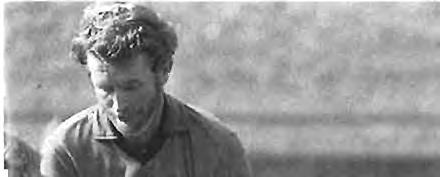
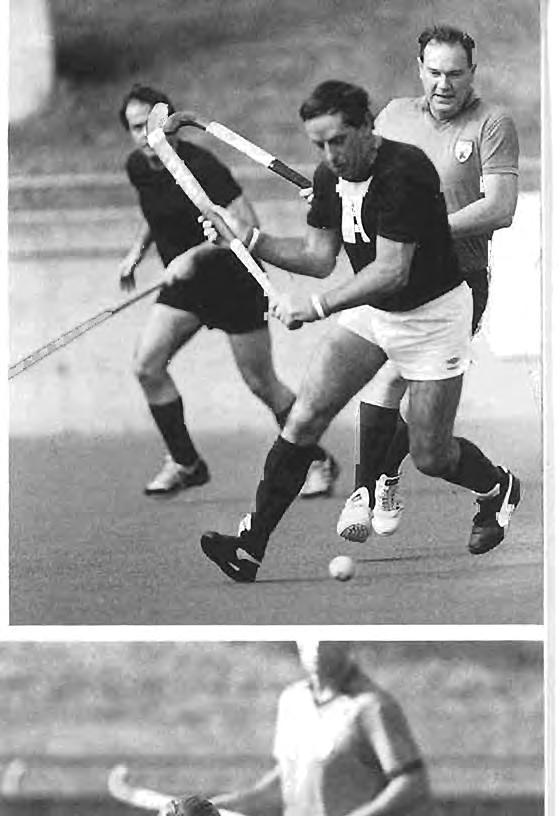
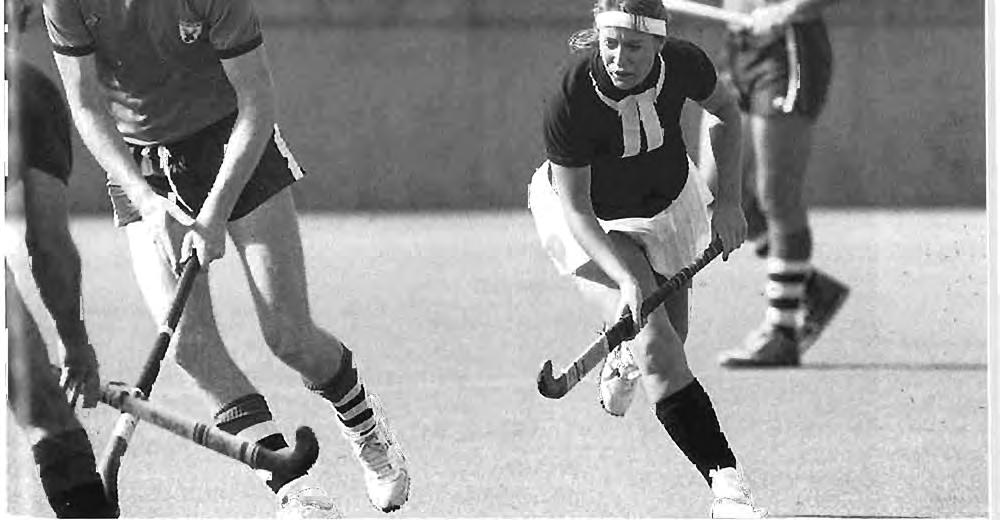
RON CASTAN Q.c. REPORTS:
The enclosed photo was taken at Devonport on Saturday, 24th February, after disembarking from the Abel Tasman at the commencement of the "Great Tasmanian Bike Ride".
I participated, with about 1,000 others, in the 8-day ride from Devonport through Launceston, Scottsdale, St. Helens, Bicheno, Triabunna and Richmond, finishing up at Hobart.
My "easy racer" recumbent bicycle attracted a fair bit of attention along the way, but I was careful to observe all relevant rulings of
the Bar Ethics Committee. Thus, I informed the reporter and photographer from the Launceston Examiner who took the enclosed photo that my name was John Doe, and I was so described in the Sunday Examiner of 25th February!!
Editors' Note: It seems highly likely that Castan's admitted deception of the Press and frustration of the public's right to know were motivated not by any anxiety to comply with the Bar's ethical code but rather to avoid detection for various outrages which he had in mind committing on unsuspecting Tasmanians.
